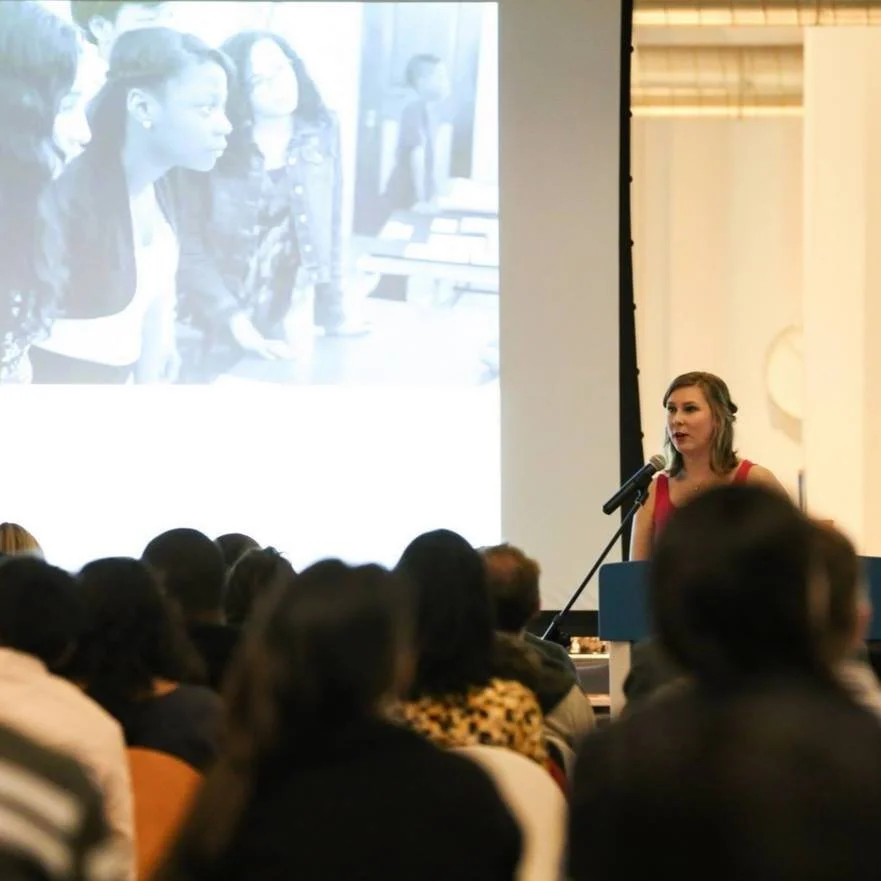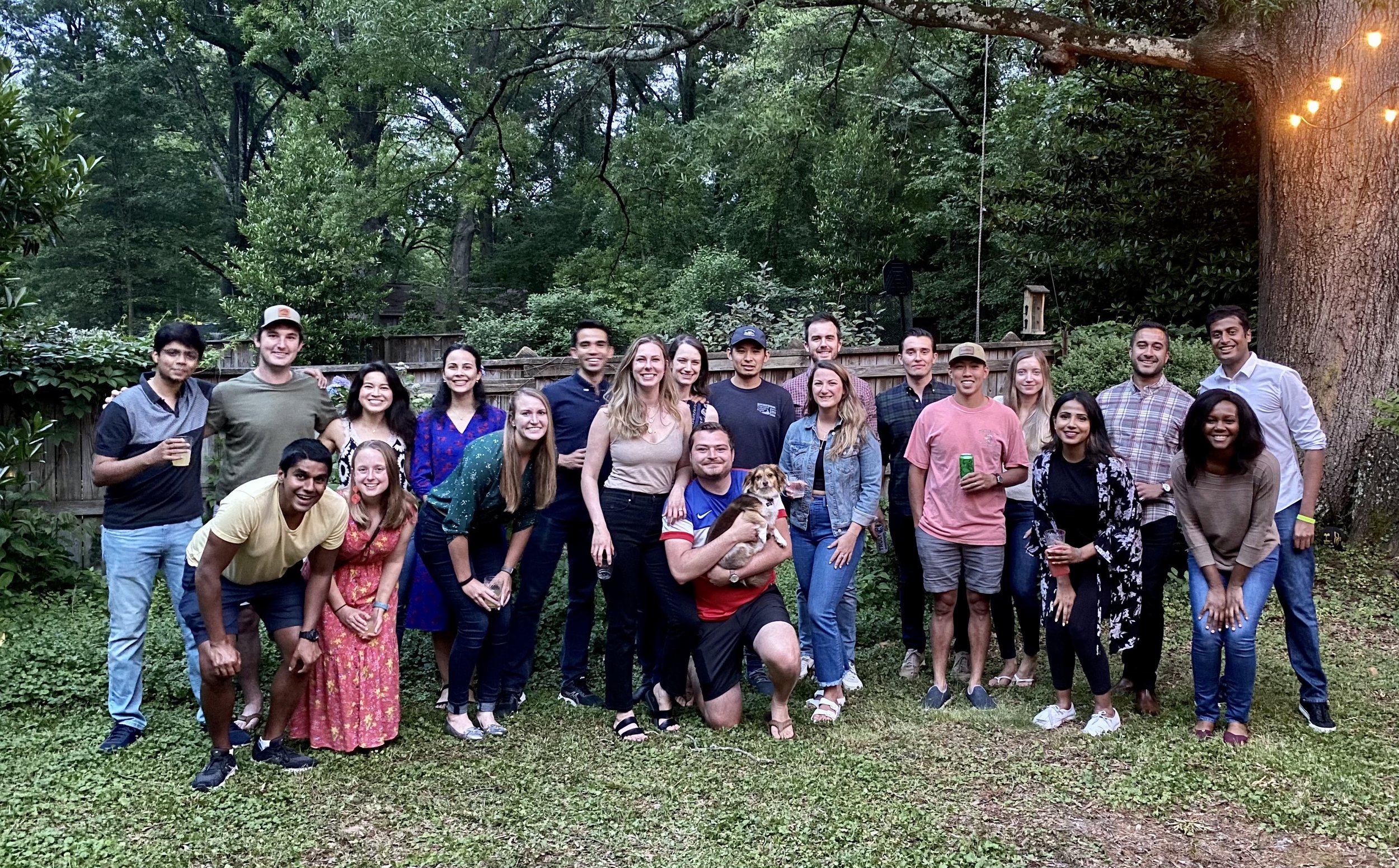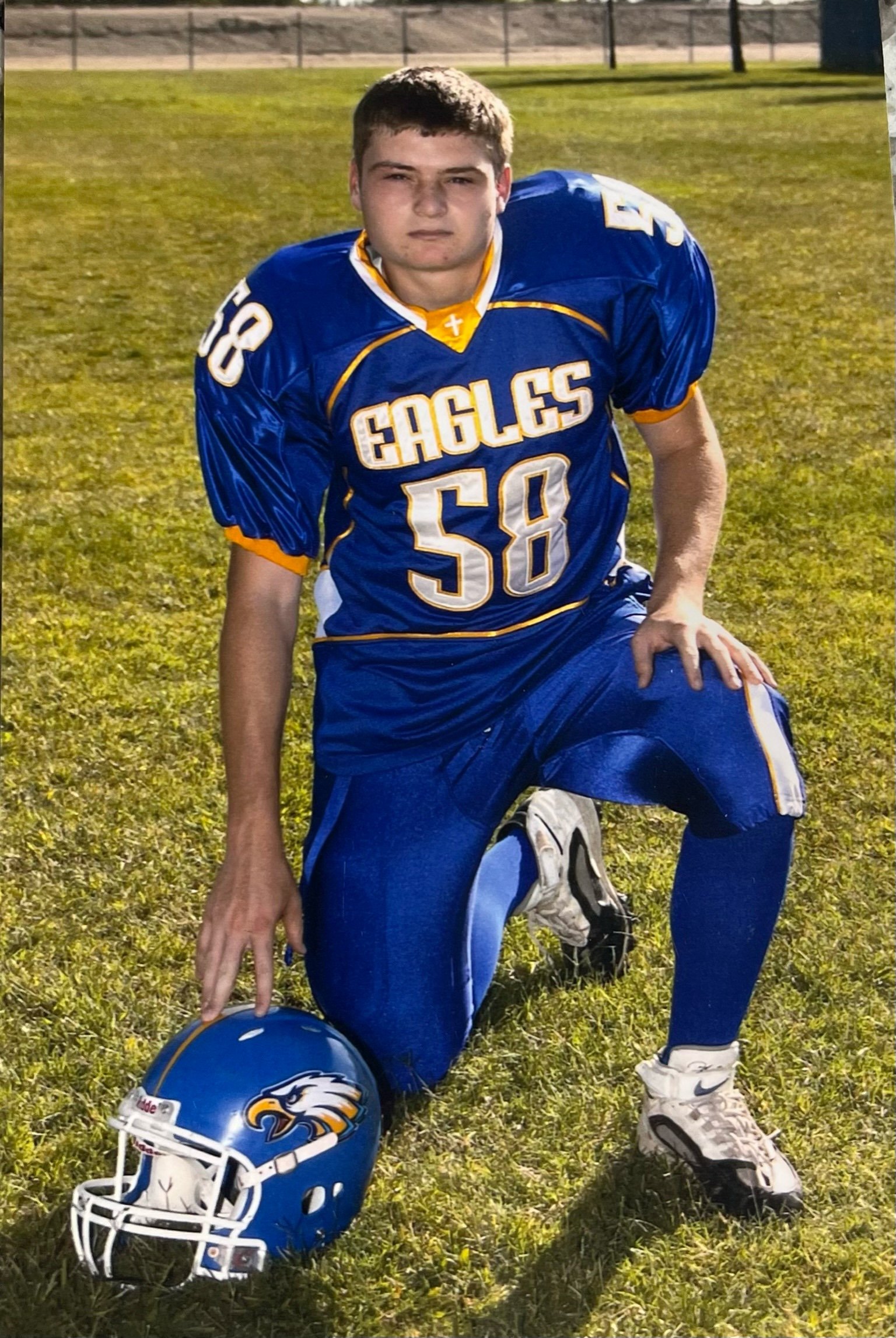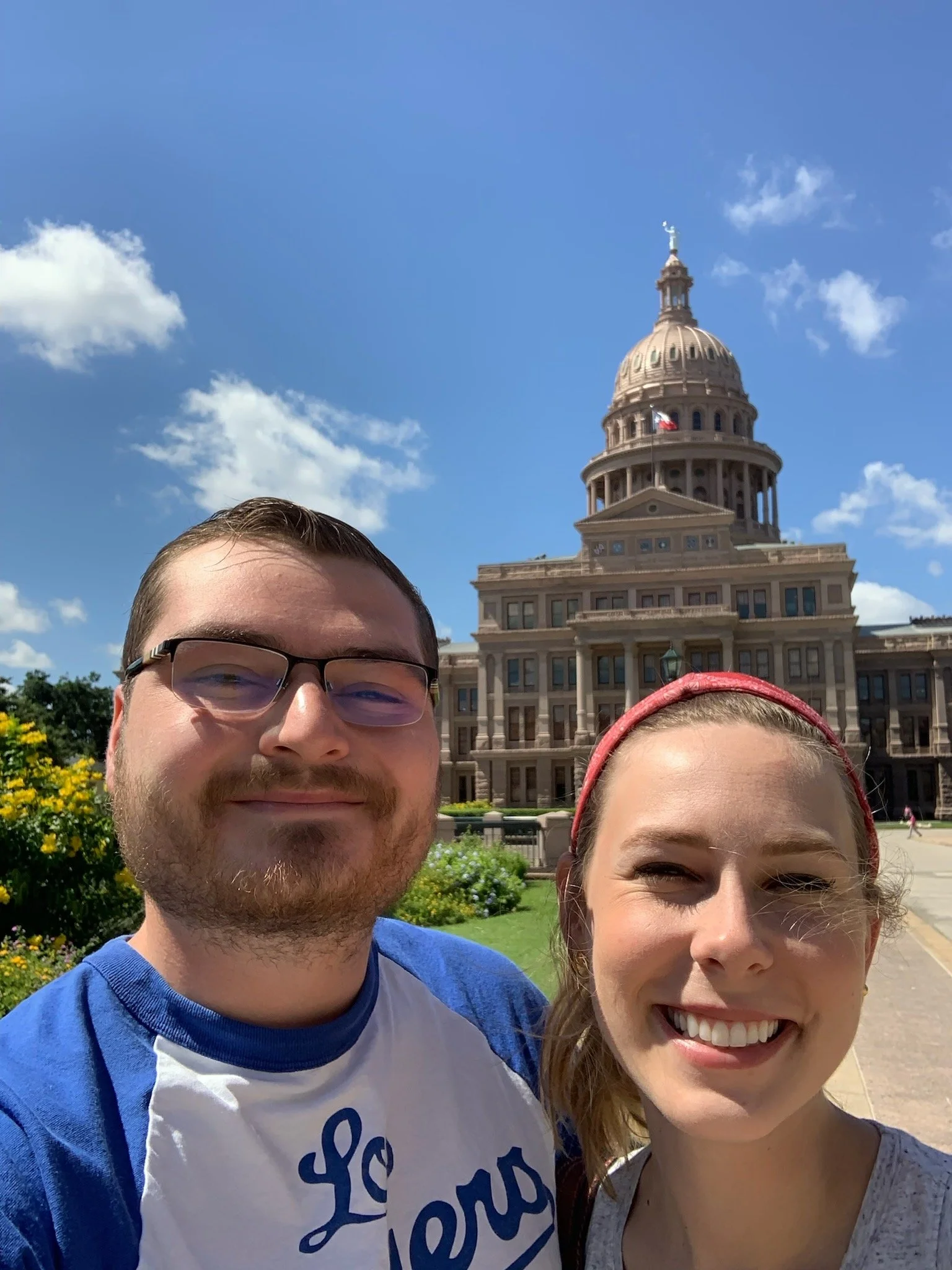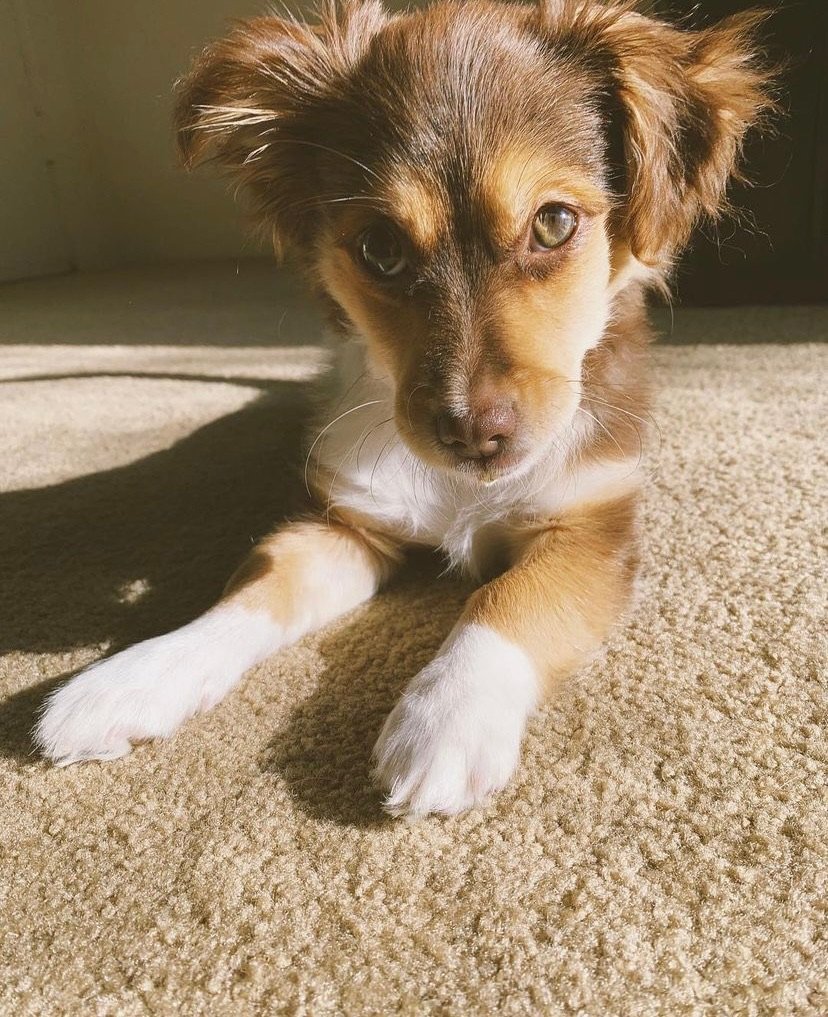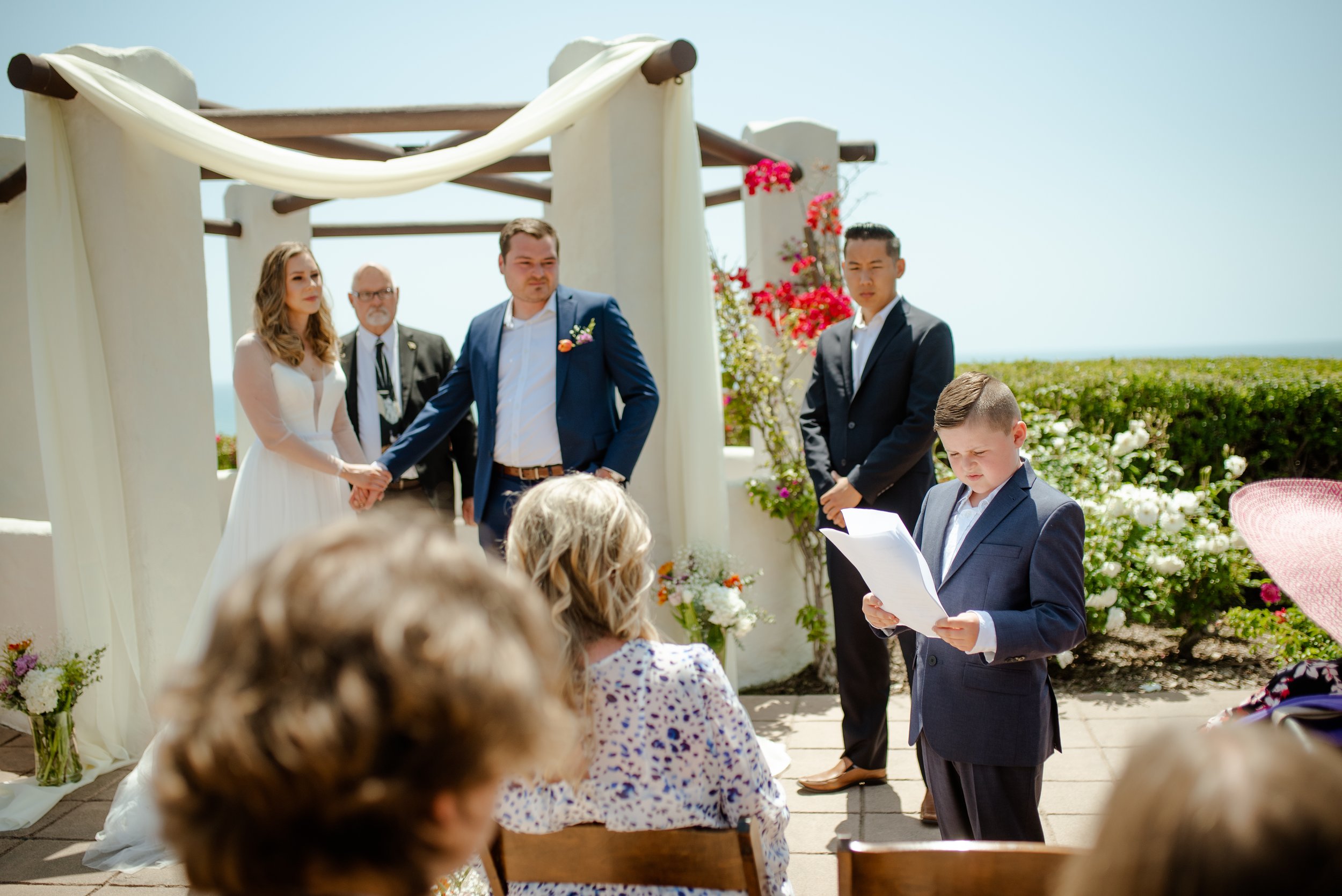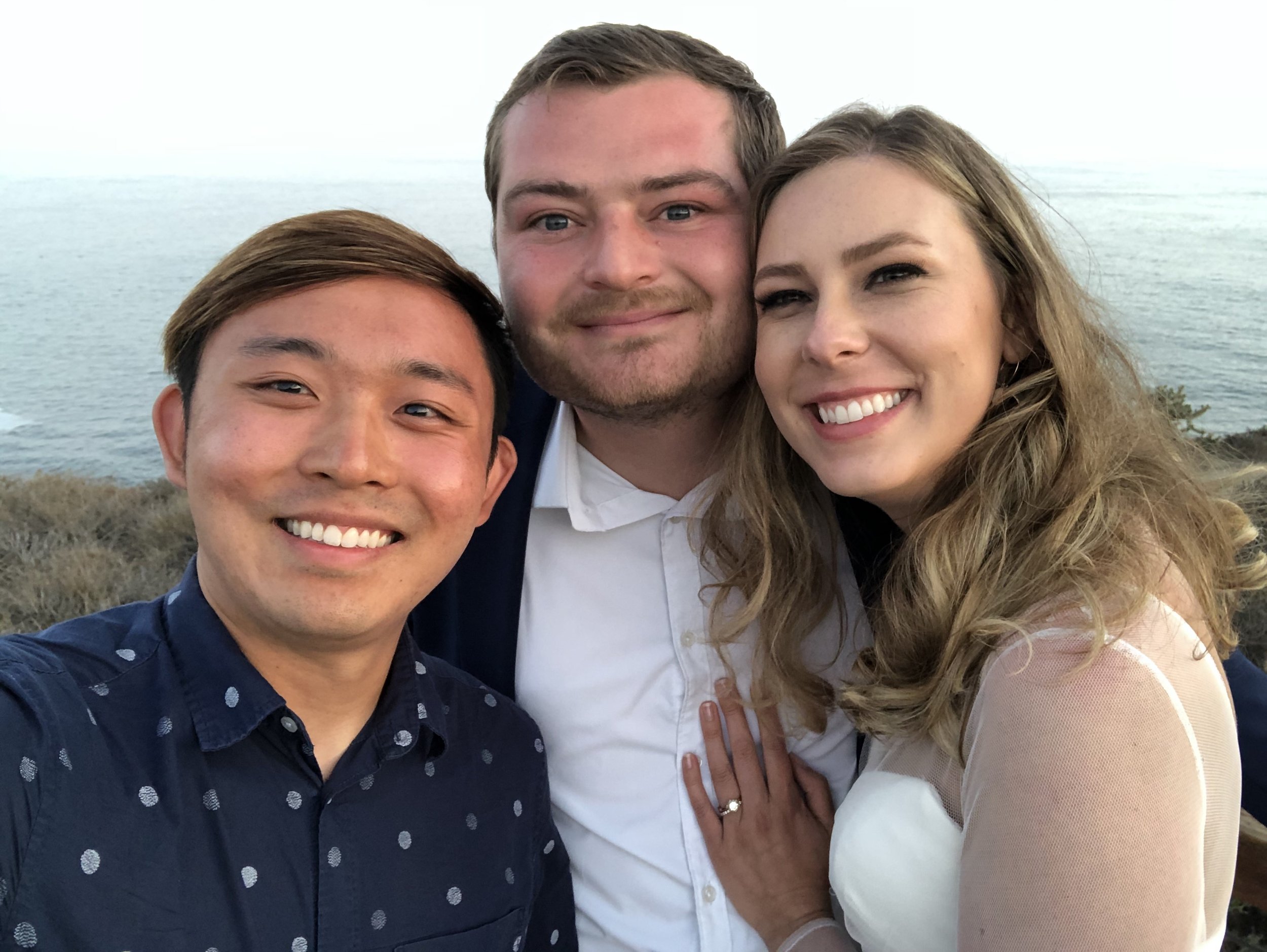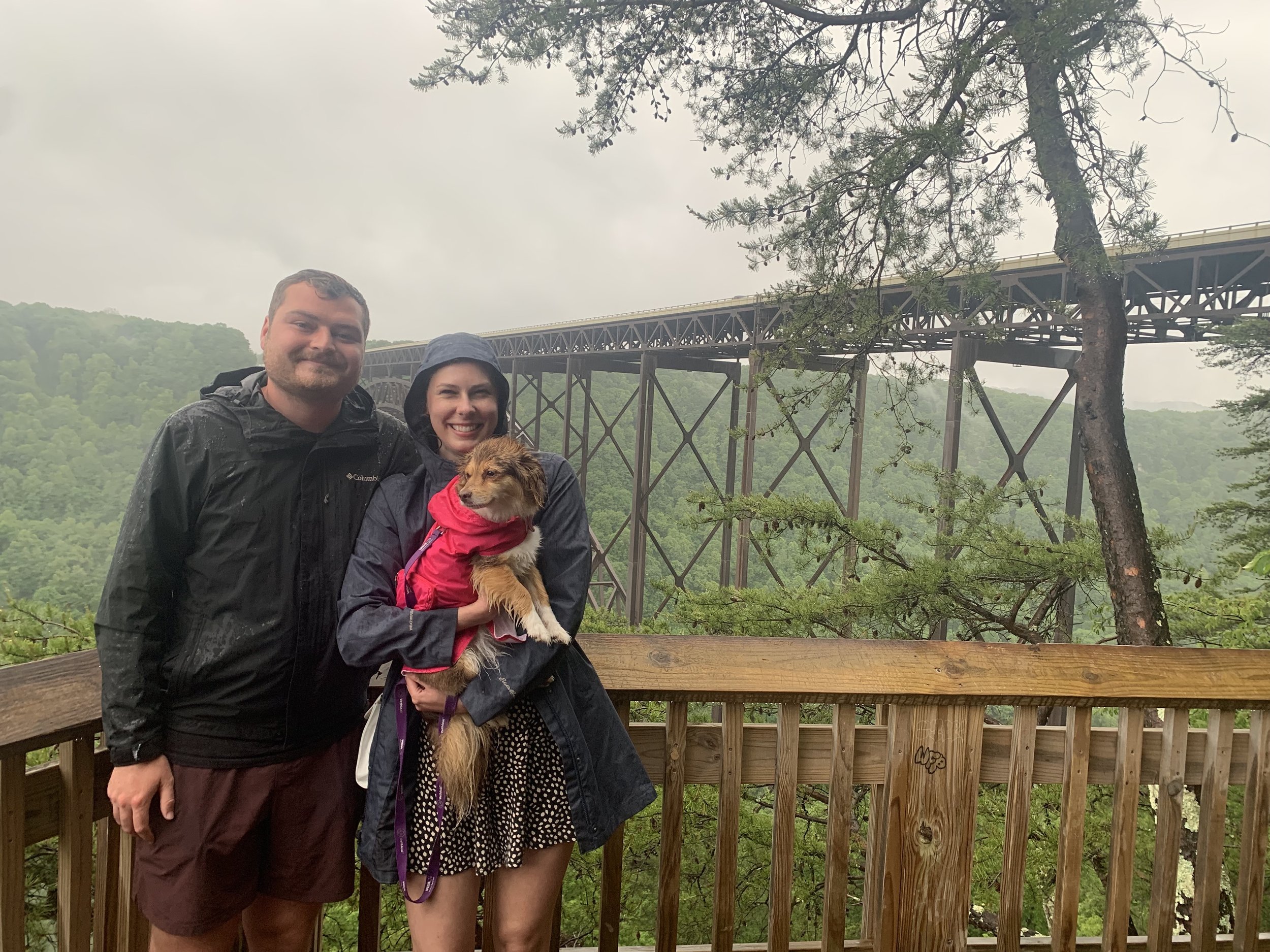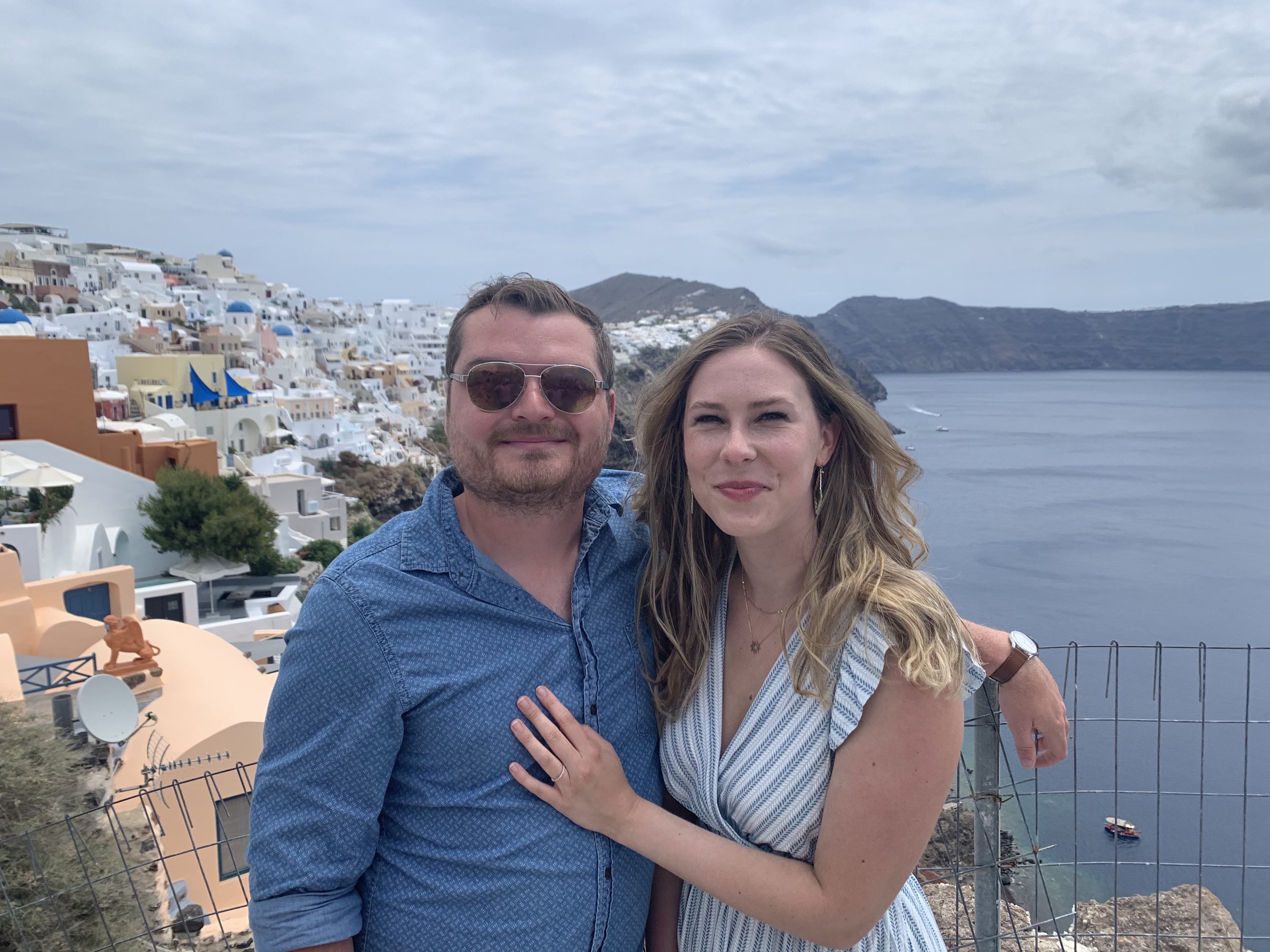He was a Republican. She was a Democrat. They worked in politics. Could it be any less obvious?
Kim + Cody // Dana Point, California
When Kim and Cody first learned of one another in 2016, in an orientation booklet for a political fellowship they were both about to start, each found the other on Facebook and was instantly turned off. Cody was a Republican, while Kim was a Democrat, and like an awkward uncle who never fails to be a parody of himself, their profiles only reinforced the other’s stereotypes. Cody’s featured him brandishing a fish and using an “obviously fake” last name (“Storm? Really?”) (Storm is, in fact, Cody’s actual last name), while Kim’s featured her giving a speech at a conference looking “so pretentious” in the exact way Cody expected of someone who’d gone to college in San Francisco.
Cody and Kim’s profile pictures before they first met
In ways, their tepid impressions were by design. The California State Assembly Fellowship Program, described as a "unique opportunity to directly participate in the legislative process and help shape public policy," is named after the brash and unflinching 54th Speaker of the California State Assembly, Jesse M. Unruh. A boy from Kansas who climbed through California state politics in the mid-1900’s, Unruh is often remembered as a lobbyist's politician, with a facetious acceptance for the role of money in politics, and a savvy for using that money to push an agenda that included civil rights, election reform, and consolidating his own political power. (When he died in 1987, a Washington Post obituary quoted him as saying, crudely, of lobbyists, "If you can't eat their food, drink their booze, screw their women and then vote against them, you have no business being up here.")
The fellowship bearing his name, to be sure, does not claim to endorse his values. Its fellows are chosen to reflect California’s political, racial, and socioeconomic demographics, and their work as legislative aides in the state capitol offers professional development, access to mentorship, and having an impact on real people's lives, not a path to becoming a political cartoon. But if Unruh's legacy suggests anything, it's that politics is full of tradeoffs between individual values and coalitional agendas. A fact that’s true, too, of relationships.
Kim and Cody moved to Sacramento a few weeks before the fellowship began. When they learned that they lived on the same street, they avoided each other until they could do so no longer, at a speed-friending event. Halfway through, Kim and Cody finally met at the same table. Kim wore a red blouse, Cody a blue Dodgers shirt. "The infamous Cody! I've heard a lot about you," Kim said, making not-so-subtle reference to her suspicions. "It's nice to finally meet you." They shook hands and started talking.
Kim and Cody, bottom right, first meeting each other
In seconds, nuance and shared experiences replaced the stereotypic caricatures Kim and Cody had created for each other. They discovered that they'd both been raised by single moms for much of their childhoods; how the financial and emotional struggles from that time motivated them to enter politics in the first place; that they loved California, and claimed their half (NorCal for Kim, SoCal for Cody) the better one. (They also completely ignored the other fellows at the table, who later shared that they felt like they were "hardcore third-wheeling" Kim and Cody's conversation.)
10 minutes later, it was time to switch groups, and as they exchanged goodbyes, neither Kim nor Cody felt sure of what to make of this unexpected connection. Cody felt somehow drawn to Kim, intrigued and flustered by someone with whom he connected so well and who had also immediately insulted his knowledge of California when he said he didn't know about the Donner Pass, a famous mountain pass near Nevada named after the notorious Donner Party of the 1800's. Kim, too, felt drawn to Cody, surprised by their shared backgrounds and their conversation’s easy flow, so much so that she declined to share an Uber with him and other fellows back to their apartments so that she could, instead, walk the two miles home (in heels) and process what, if anything, Cody meant to her.
Kim and Cody, second row on the left, taking a group picture with their fellowship cohort after speed-friending
A few weeks later, after a day of team-building activities like trust falls and rock climbs, Kim found herself lamenting with other fellows about some of the struggles they experienced being women in politics. The imposter syndrome they felt; the expectations people held about their views towards marriage. "Was it really necessary, or fair," someone asked, "to expect a woman to take a man's last name?" Kim joked that she would only ever change hers if it was to something really cool.
Cody, listening quietly from the other side of the group, looked at Kim with a cheeky grin on his face. "Like Storm?"
One of Kim and Cody’s first photos together
Kim and Cody met in a stately environment, within the context of wanting to influence the world in positive ways through politics and policy, and much of the foundation of their relationship comes from these genuine and ambitious goals. But just as a serious newspaper has its comics section, so Kim and Cody's relationship, solemn in many moments, has banter and levity.
In March of 2021, a few months before their May wedding in southern California, I sat with Kim and Cody in their dining room in Durham, North Carolina. NPR's evening edition played from an Amazon Echo on a bookshelf nearby, and scattered around their home were the physical renderings of their time on the East Coast: banners from the North Carolina Governor's race in 2020, which Kim worked on; furniture they thrifted or purchased for cheap on Facebook Marketplace; and an adorable dog named June, who bounced and pranced and melted my heart as soon as I saw her.
Kim and Cody’s dog, June, in their backyard in Durham
Kim made dinner, a coconut curry, as we talked. She'd just added turmeric, and after stirring the pot for a few minutes her expression shifted from excitement, to skepticism, to resignation. The curry wasn't thickening like it was supposed to, and when she tasted it, she grimaced and promptly declared the dish beyond saving. (She later realized she'd mixed up coconut milk and coconut cream.) Cody and I both insisted that it'd be fine and tried to taste the curry ourselves, but Kim shooed us away and took the opportunity to suggest something else instead. "Have you ever been to Cookout?" she asked me, referring to the southern fast food chain with a regional cult following like that of In-N-Out in the west, or Culvers in the midwest.
Over cheese curds, chicken fingers, and tea more parts syrup than water, Kim and Cody told me about the life they'd built in Durham and how much they were going to miss it. They'd come to North Carolina 18 months earlier so Cody could go to business school at Duke. Kim had worked on a gubernatorial campaign (her candidate won) and, after that, consulted for a local nonprofit. Outside of classes and work, they'd formed a strong community. "It's a lot of very thoughtful people who come from different career backgrounds and have lots of different interests and hobbies," Kim said about their friends, most of whom were either Cody's classmates or their significant others who, like Kim, had nothing to do with the business school. They were lawyers, academics, teachers, and generally ambitious, kind-hearted people.
Kim and Cody (center) with their friends in Durham, NC
After dinner, we played a few rounds of Bananagrams, and giggled like teenagers at all of the inappropriate four and five letter words we made on our boards. I almost won a single match of the five we played, and finished in a distant third every other time. Kim and Cody raced neck and neck until the end, when Cody would usually win (and then gloat) to Kim's annoyance. "Asshole is my love language," he said with a nefarious smile as he made fun of Kim for losing again. She rolled her eyes and said to me, "he's being nice to you right now, but if by, like, Thursday"—I arrived on Monday—"he's not mean to you, then you're in trouble."
Kim and Cody playing Bananagrams at home
I asked about wedding planning; the day was less than two months away. "We've got a Trello board for it all," Kim said, "and have been trying to get our wedding party to communicate using Slack." She frowned, and Cody added, "That hasn't really caught on though. None of them really ever uses it except, like, the other people who are in business school. Everyone else is like, 'What is this? I don't want this.'"
All the locations they considered for their wedding, they hoped, would be inexpensive. ("We both pretty aggressively reject the wedding industry taking all our money," Cody said.) The dream was Yosemite National Park, one of Kim and Cody's favorite places. (It proved too difficult with the logistics of getting Cody's great grandmother, who was wheelchair bound, to any outdoor site.) They also, only half-joking, considered the Taco Bell wedding chapel, located in Las Vegas and which, for $600 and four hours notice, provides you and 15 guests a ceremony, Cinnabon cake, and 12-pack of titular tacos. (They loved the idea, but scrapped it when they thought of pitching it to their families.) Cody's backyard in Bakersfield also came up as an option; it'd be free, and obviously easy for Cody's family to attend. (Kim, remembering that Cody's childhood dog passed away and was buried there in late 2020, shut down the idea. "Anywhere but next to the dead dog," she deadpanned.)
Kim and Cody at Yosemite National Park
Ultimately, the pandemic chose for them. They cut the guest list to their best man and woman and a dozen family members, and while their original plan was to host everyone in an AirBnB home somewhere in LA and do a backyard ceremony, they retreated to more traditional hotel rooms and renting an outdoor gazebo when logistics proved too complicated. "Mostly, it's my family," Kim admitted to me with a light sigh, explaining that they'd been more cautious throughout the pandemic and were uncomfortable with being around others despite vaccine availability. The mild drama had drained Kim, but in a familiar way; she's long had a habit of playing diplomat in her personal and professional lives.
Kim was born in Phoenix, Arizona. Her parents divorced when she was a year and a half old, and her formative years were spent in Modesto, California, where most of her mother's family lived. Her mother worked hard to support Kim and her older brother, but money was always tight. "I remember going to the grocery stores and being worried about buying certain foods because we couldn't afford it, even with our food stamps," she told me, also noting that she’d always received free meals from school. (Later, these experiences fueled a passion for food and nutrition policy.)
Kim, left, with her mother and brother
Kim reflected on how her family's financial constraints forced her to mature quickly, and how they contributed to her frugality and giving nature later in life. "I definitely internalized a lot of the burden of finances," she said, "and I think a lot about how those early years impacted how I've become a very service-oriented person. I'm very willing to give myself to others, and I think a lot of that comes from my childhood and how I was raised by a single mother who gave so much."
When Kim's mother was at work, Kim's grandparents helped raise her. In retrospect, she realizes that her grandparents were, in essence, providing childcare for her mother, who couldn’t afford it otherwise. As a child, Kim was just thrilled to always be around family. “My grandparents’ house served as a sort of hub for all of the siblings, cousins, and kids,” she told me. “We had family dinners every Friday night together, and celebrated birthdays and holidays there, too.”
Kim, right, with her family
Her grandparents were also the source of Kim’s curiosity and love for learning. "My grandpa was a college professor, and whenever I got back from school he would always ask me, ‘What did you learn today?’ And I’d tell him, and we’d have a long discussion about the topic. He was always handing me a book or telling me to go check out some plant or bug he'd seen in the garden and learn more about it." She remembers reading his volumes of Encyclopedia Britannica. (She made it to the letter L before losing interest.)
Kim, center, with her grandparents and other family
In middle school, Kim moved with her family back to Arizona, where her mother met her stepfather. "That combined income and the lower cost of living in Arizona compared to California really changed our economic circumstances," she said, recalling that she moved into her first home late in high school. She tried a lot of activities—cross country, technical theater, service clubs—and was generally a quiet, well-behaved student with a close group of friends. She listened endlessly to The Strokes, cut her hair short, and always wore giant thrifted pants. “I was pretty nerdy in high school,” she told me, “and also really trying for a cool alternative look. More often than not, though, I'm sure it just came off as a little dorky.”
Kim in early high school
Neither of Kim's parents completed college, but her grandparents and many aunts and uncles did and, with their examples, higher education was never a matter of if, but when. Kim started at a small liberal arts school on the East Coast. "My only criteria was to get as far away from home as possible because I wanted to see what was out there in the world," she told me. Her freshman roommate, Pame (pronounced pah-may), told me about how quickly Kim became hyper-involved and driven by community and service. “Kim is so naturally a community-collective individual,” she said, “meaning she has this power and desire to make people feel like they’re a part of something, because she herself wants to be a part of something and to pay it forward. She’d be volunteering, and trying to connect to community in a meaningful way, without seeming like she was trying to do that. It was just who she was.” She recalled how Kim insisted on keeping their dorm room open so anyone could pop in to say hi. “We were at the end of the hallway, though, so no one ever came and we just gave up. But she’s always been that kind of welcoming force.”
Kim and Pame in college and at Kim and Cody’s wedding
Kim had picked the school in the Northeast, in part, because she’d read that it was one of the Top 10 social justice oriented colleges in the nation. But after a year there, her experiences with the school’s treatment of wealth, class, and race never lived up to her expectations. "There were a lot of kids who came from pretty wealthy backgrounds, which was hard to relate to, and it was pretty far from the closest major city," she told me. Coupled with family health issues, Kim transferred back to the west coast, to the University of San Francisco, or USF, a 55-acre hilltop campus located in the heart of the city. It was a much better fit. "I had a lot of opportunities there for hands-on service learning through internships, organizations, and classes that I'm so grateful for," she said.
Kim with her mother near USF’s campus
Kim shared about her upbringing first, and when it was Cody's turn, he made an observation. "You'll probably see that there are a lot of similarities between our stories, which makes sense, right? Because that's kind of why our connection is so strong. We've experienced and endured a lot of similar things."
Cody was born and raised in Bakersfield, California, part of the state's agricultural Central Valley. His mother had just graduated from high school and his father was still in high school when they accidentally became pregnant with Cody. The two never married, but lived under the same roof on and off for many years with Cody's grandparents in Oildale, a town on the north side of Bakersfield. "It's an area that is extremely poor," Cody noted, "like, one of the highest rates of welfare usage in the United States, and it also used to be a pretty active area for white supremacist gangs."
Cody with his mother and father
As a child, Cody wasn't much aware of either of these facts, and what others may have described as a cramped home with too many people living in it, Cody remembers as a fun place where there was always a friend nearby. "We'd typically sleep on the floor just because there were so many people in the house," he said. "I'd wake up and immediately go play with my uncle or cousins. I didn't really think too much about community because it was just always there."
Cody with his mother, father, and grandparents
Both of Cody's parents attended Bakersfield College for their associates degrees, and while they were at school or work, Cody spent a lot of time with his grandparents. They, similar to Kim’s grandparents for her, instilled values of learning and curiosity, as well as faith. "I technically went to Christian private schools growing up, but I hesitate to even say private because that makes it sound really bougie," Cody told me. "Most of them were tiny, with a class size of six, and what they did cost I was able to cover easily with some kind of scholarship."
In high school, Cody held two seemingly contrasting interests and communities at once: he played on the football team, and was an avid debater. "I like to say that I was a nerdy jock," he told me, "and I'd have these very different conversations, one with all these really smart, really nerdy kids debating something like our military presence in the Middle East..." Cody began to laugh, "and one with the football guys who just wanted to talk about their junk."
Cody playing high school football
I asked about what, if anything, felt common in both. "I think I've realized that whatever environment I'm in, I try to strive for what is perceived as success," Cody replied. His best friend from childhood, Jared, told me something similar. "There's always been this pattern of Cody pursuing leadership roles, like being captain on the football team when we were in high school, or being the student council president in college. He's always pursued greater and greater things, always had something that he was chasing after."
Cody and Jared in high school and at Cody and Kim’s wedding
As Cody’s goals for life expanded, so did his faith. He'd grown up surrounded by Christianity in the form of his grandparents' children's ministry. "I think the technical term is Child Evangelist," he tried to explain while chuckling at how strange it must sound to someone not familiar with the concept, "where they'd start up in the Northeast of California and move their way down the state in their van and—man, that sounds sketchy—and set up a chapel on a fairground. And kids would come by and sing songs and learn about the gospel.”
Cody’s grandparents’ mobile chapel
Jared told me about the first time he remembered Cody going through a period of religious fervor. "At the beginning of high school, he was really committed to football; going to the gym twice a day, drinking protein shakes, studying plays, everything. But then I remember he went to this church camp one summer, and when he came back he told me that he wasn't sure he could commit all that time and energy to football anymore, and that he wanted to focus more on his spiritual life.”
In his Senior year of high school, Cody applied to a single college: Biola University, a private Christian school in Los Angeles with the unique requirement that each undergraduate student takes 10 Bible or theology classes before they graduate, enough for a minor. He first majored in nursing, planning to become a missionary nurse overseas, before switching to Biblical studies, and finally settling into Business Administration after a trip to the Philippines convinced him that supporting small businesses would be a much better way to build relationships with a community than solely being a preacher.
Cody and Jared at their college graduation
When Kim and Cody first met, it was many of these stories that they connected over. "In those early years of both of our lives, money was incredibly tight," Kim told me, "and I think that's something Cody and I really bonded over, because a lot of our peers in life had, like, very stable upbringings, with typical nuclear families and where money wasn't an issue. But neither of us really had that." They'd both spent years advocating for people whose circumstances reflected their own upbringings; low-income families, or those who didn't really have a voice. "We shared those values, regardless of our politics, so that even if we didn't agree on specific policies, we could at least recognize and respect the other person's opinion,” Kim said.
Kim and Cody on a date in 2018
Their best friends told me about how excited Kim and Cody were to meet each other. "I remember Cody telling me about Kim," Jared said, "and that he got along really well with her but how, you know, she was a Democrat. And I told him, just get along and think about that later. Because even though they had some different beliefs, I saw that they had similar character traits that got them to where they were: diligence, and a pursuit of greater things." Lauren, Kim's best friend from childhood, told me about Kim's similar feelings for Cody, and how comfortable she was around him. "Kim wears her heart on her sleeve, and it was so easy to see her enthusiasm when she talked about Cody,” Lauren said. “I'm her friend, and so I get to hear about all the people who might come and go in her life. And so it made me so happy to see how she leaned into playing and relaxing with Cody in conversation and life; I hadn't seen her do that with anyone else.”
At their cores, Kim and Cody love to jest and banter with each other and their friends. But it was also no accident that they met in the often humorless world of politics, a world each came into during college through perspectives shaped by their childhoods. Kim grew up in a family with left-leaning politics, a slant she adopted herself and which sometimes isolated her from peers at school in Arizona. “I was raised in a staunchly-Democrat household,” she told me, “while a lot of my peers in Arizona either didn’t care about politics, or really cared about politics—and were Republican.” She remembers starting casual political debates at the lunch table with her friends, and formal ones in AP Government, a class she loved. “I learned how to listen to different perspectives, how to structure an argument, and even how to maintain friendships with people I really, really didn't agree with politically,” she said.
After she transferred to USF, Kim worked for a non-profit organization called Generation Citizen, whose mission states that, "all students have the right to a civics education that prepares them to participate in our democracy." Her work involved teaching ideas about advocacy and democracy to middle and high school students, and it gave her an appreciation for grassroots politics and having local impact. "We'd work with the students to identify issues in their school that were important to them, teach them how to build consensus around which issue was most important, and then work with them on a project to solve that issue," Kim said. Her students, high school Juniors and Seniors, focused on food waste and food insecurity, and Kim helped them organize a recycling and food-sharing program, where students could bring extra food to share with others who otherwise didn't bring or couldn't afford lunch.
She went on to lead USF’s chapter of Generation Citizen, overseeing 100 volunteers over the course of two years and leading trainings for grassroots organizing. "Generation Citizen was my first real taste of making an intentional impact on community issues, of how to influence policy and politics," she said. "It was hugely influential.”
Kim (center) at a Generation Citizen event
She deepened her interest in 2014 with an internship in India, funded by a nonprofit called the Foundation for Sustainable Development, which “achieves community-driven goals through asset-based development and international exchange.” For the school year before Kim’s internship, USF and the nonprofit worked together to organize thoughtful workshops and lectures about asset-based community development, as well as help the interns better understand India's social issues, cultural differences, and history in order to prepare Kim and other interns to work with a mindset that they would be partners to existing community structures and leaders, not force changes as outsiders.
The trip was a work internship, cultural exchange, and chance for Kim to finally travel the world. "Part of the reality is that I didn't grow up with money, so if I wanted to travel I had to look for programs that were fully funded," Kim said. "But the internship was also an eye-opening experience, and enabled me to think more about how you can have shared values with people who live very differently from you, like prioritizing women in leadership roles and getting them the tools and training they needed to do that.”
Kim in India
She lived and worked in Rajasthan with a nonprofit that engaged women in local government who, in India, are required to compose a minimum of 33% of many local municipalities’ governing bodies. The regulation, Kim noted, was great in spirit, but, according to the nonprofit, hard to implement in practice. "For example, a woman would be elected, but then have her husband or her brother take her place at meetings," Kim said. Her summer work culminated in making recommendations for a training program for women in politics and commissioning a study about violence against women.
Kim (second row, third from right) with other interns in India
Back in California, Kim spent her Senior year of college interning for San Francisco’s President of the Board of Supervisors—who is now the city's mayor—getting her feet wet in the world of policymaking by sitting at the office front desk and answering the phone when (mostly angry) people would call. She quickly learned how political theory differed from political fact. "It was interesting to see all the differences in opinion and infighting, even within the same party," she told me. "In class, your performance was based on if you had the background knowledge on some policy. But at City Hall, you could show up for your internship and your supervisor would yell at you—half-joking, half not—not because you don't know something but because you can't figure out how to work the copier.” Her learnings were often observational—working alongside influential staff, attending campaign events—but still valuable. “I often got to try my hand at helping to resolve constituent issues or writing up briefs on Board Meetings,” she said, “and see how policy and politics worked together.”
Kim in San Francisco City Hall
Cody, like Kim, never dreamed of a career in politics, though it also wasn't hard to trace the roots of his eventual interest. He recalled growing up religious in Bakersfield (nearly the same as saying he grew up politically conservative) and how debate competitions were his first formal exposure to policy and politics. "The topics were usually around policy decisions, and I enjoyed the process pretty early on,” he told me, listing debate tournaments he participated in all across the west coast. "So I think the policy ideas became pretty ingrained, even though I didn't necessarily see politics as a career yet.”
When he was in college, he ran for and was elected as President of BIOLA's Student Missionaries' Union, a student-led group that organizes local and global mission trips, as well as other related conferences and events. “It really brought me out of my shell and forced me to engage with a lot of people,” he told me. “I had to craft a campaign that reflected my views, speak a bunch, eventually run an office of about 30 employees.”
Cody (red shirt) during his campaign
An internship in Washington D.C. in the House of Representatives solidified his interest. "I went to the same church as my congressman's family, and even debated his son in high school," Cody said, "so I looked up if he had internships, and he did." Cody applied and was accepted. The work in D.C., he said, was mostly unglamorous. "You're at the bottom of the totem pole as an intern, so it's mostly administrative stuff,” he told me. “Scheduling meetings, taking calls, giving tours." He, like Kim in San Francisco, learned a lot through osmosis, shadowing his representative in meetings, observing the nuance of how large pieces of policy were negotiated, and then fielding phone calls from angry constituents about that policy. "You're basically getting yelled at from people all over the US, which is fun, right?"—I wondered if Cody had a very different definition of fun than me—"Because you get to see what people care about. I'd have people from Bakersfield call in and say, 'Hey, I don't like this bill,' and I'd need to be able to write to them and tell them what it actually does, or how my boss would vote. And that was a lot of fun.”
Cody taking calls at work
He also enjoyed showing guests around the Capitol. "I think the thing that I resonated the most with was when we'd have families come from Bakersfield and we'd give them tours," he said. "And talking to them, it was really cool to tie it all together. Because you're in this really fancy place, where big, audacious things are happening, and history is being made. But then you just talk to normal people whose kids went to similar schools as you, and eat at the same restaurants. And it was cool to see again how we're not just doing this work in a vacuum. We could ask directly, 'What do these people care about?'"
His time in D.C. also showed Cody the limits of ideas about meritocracy that he'd grown up believing. "Growing up as a Republican, you're told that you just have to work hard, and your outcomes will be tied to that, right?" he said. "And to an extent that's true. But I also saw how all these people making decisions around me in D.C. weren't necessarily smarter or harder working than the people around them; they just might've had good connections. Someone might get more work because they were the child of a large donor, or someone else might get more attention because they went to an Ivy League school."
He continued. "When I was growing up, it felt like there was a clear correlation between people's effort and their outcomes, because it seemed like the playing field in Bakersfield was pretty even. No one was moving by leaps and bounds, but it definitely felt like social mobility was tied to someone's effort. But I got to D.C., and then business school, and saw how some of my peers lived in nice apartments or had lots of connections already because of their parents or their past, and I'd already feel like I was behind. Effort wasn't going to change that. And over time, that's made me more open to the idea that people's outcomes aren't necessarily tied to their effort."
Cody in Washington D.C.
Kim and Cody both began in politics at its most fundamental level—working with individual voters and constituents on a daily basis—and their fellowship in the California State Assembly built on that foundation by teaching them how to translate anecdotal stories into data-driven policy that would affect millions of people. Their roles were as legislative aides, and when I asked what exactly that meant, Kim made an analogy to the relationship between a singer and their songwriter: just as the singer is the face and voice for the songwriters' work, so the elected official is the owner of a bill that the legislative aide researches, writes, and moves through political morass.
"One of the things I love the most about working in politics is how you get to be a generalist every day," Kim said. "Especially as a legislative aide, you might be responsible for a slate of bills and subject areas that can be completely separate from one another." She gave an example. "I might be working on elections policy for my boss, so I'm talking to the ACLU or the Secretary of State, and later that same day go to the Natural Resources Committee and argue with someone about a parks bill.”
Kim at work in the California State Capitol
They especially enjoyed work that had a tangible connection to their own stories. "The things we both enjoyed working on surrounded issues for people who were working really hard but still in poverty, because we had a connection to that in our personal lives," Cody told me. "Advocating for people who weren't at the table, and doing things that would make their lives better." Kim worked on childcare and nutrition issues (“We were really focused on helping single parents and their families thrive,”) Cody on parking tickets ("Not sexy, but very relevant to normal people's lives,") and both spent time on issues of food deserts.
Other things they learned felt saddening but informative. "It was interesting to see how much wheeling and dealing happened, because in theory, I knew that it happens, but I hadn't realized how much of a large part of politics that it is," Kim said. "I think it's made me move a little back towards the middle, just because I learned a lot more about incrementalism, and what it takes to get any legislation, no matter how small, passed."
When I asked about their views of how politics affected people's character, and whether it was as tainted as I or the average person often saw it to be, Cody answered with language that sounded logical but ultimately fatalistic. "It's hard to stay in politics for a long time and not be changed because of it," he said. "It's a very powerful system, and it's moving in a certain direction. And some people get in it and try to move the opposite direction, and they're good at it for a while. But at some point, you either leave or it changes you. Because being in leadership, and staying, means you're really good at fundraising, getting money for and protecting your allies, making alliances with people or on policies you don't necessarily agree with.”
Cody and Kim (back right) with their fellowship cohort in the State Assembly
Kim added, "I think some of the best politicians I've met both understand that they have to think about the impact of their words and how they'll be interpreted, but also can retain their personality and a healthy dose of self-confidence to get past the mean comments." Cody also pointed out that behind mass media's soundbite filter was a nuanced and quantitative policymaking process. "Most policy is more data-driven than people think, and various interest groups—which aren't just giant lobbies like oil and gas but could also be nonprofits or associations—all do their best to back up what they want to do with data.”
At the highest level, Kim and Cody’s views of politics center on two points: power, and money, and specifically how families like theirs, who didn’t come from either, could still be represented. “Politics can often be a concentration of power, with a few people making decisions for the masses, whether politicians, legislative aides, committee consultants, or lobbyists,” Kim said. “One of my biggest takeaways from working in politics is the need for active civic participation from people who don't work in politics to dilute that power, and ensure that we keep the balance that is necessary for a representative democracy to keep functioning properly.”
She went on. “The system we've set up also means that politicians require money to stay in office. It's just a fact of the job. As hard as we might try to separate money and politics, that’s simply impossible in our system. And working to dilute the effect of that prior power and money in politics is one of the biggest values Cody and I both share.”
Cody and Kim on their last day in the state Capitol
Meeting, and then working together, in politics has unsurprisingly influenced Kim and Cody's relationship in ways very different from those for whom politics is but a passing concern. Though they found quick connection beyond labels, they knew that their family or peers might not be so receptive. For a time, they kept their relationship a secret. "Gossip gets passed around very quickly through the Capitol," Kim told me, "and so I was very intentional about not wanting the first thing people knew about me to be, 'Oh, she's dating a Republican? '”
Cody and Kim together in 2017
When they told their families about the relationship, neither at first supported it. "They were initially not fans of the other person," Kim said. "My family didn't know anything about Cody, and his family didn't know anything about me, but they had assumptions about us based on our labels or people or organizations we worked with that they recognized." Kim's family couldn't believe she'd date someone who had interned for a Republican member of Congress; Cody's family couldn't believe he'd date someone who had interned for a Democrat in San Francisco City Hall. "I was calling my mom one time," Cody said, "and she literally said, 'Don't do this Cody. Don't date this girl from San Francisco who works for a Democrat.'" He chuckled, and added, "And now I think my mom likes her more than me.”
Kim with Cody’s younger brother, Diesel
Cody with Kim and her family
Cody reflected upon the reasons for their families' initial reticence. "In our politics, you only get to pick one side, right? And so even if you're much more nuanced than just whom you're working for, when people hear you're working for a Republican or Democrat, and especially if they recognize their name, all that anger or frustration for that person or party just sticks onto you." He described some of his and Kim's own motivations. "We just wanted to help people, and for each of us, we chose the party or person that aligned with what we believed would allow us to do that. And a lot of our early relationship was trying to explain the nuances to each others' friends and family so they understood that, too." Kim added, "It's true in general, and in our relationship, that the more you get to know a person, and the more you know who they are—what's in their heart, how they treat other people, how they operate in the world—the less those kinds of labels really matter.”
All of this is not to say, of course, that those labels disappeared altogether, nor that reconciling differences has always been easy. "Most of the big arguments that we've had have been about politics, especially when we were working in the legislature," Kim said. She recalled one specific example. "It was a big housing bill, authored by Democrats, and it had a very liberal approach in how it was trying to address the state housing crisis. And I remember we were sitting on my couch in my apartment arguing about the bill, and getting really upset with one another for their perspective." Their ideological fights were made more fervid by their being so well-informed about the issues, each armed with data, examples, and retorts to carry a debate for far longer than those between other couples. "Every couple probably argues about politics sometimes, but ours were more pronounced just because we worked in policy," Kim said. "They were super policy-oriented and informed, and they were interesting because we both cared about the nuance, and were both willing to engage and disagree without just saying, ‘You're evil, and you suck.’"
Cody and Kim when they were dating
Oftentimes, the emotional turmoil came less from the disagreement itself and more how it was presented. "I did a lot of debate in high school," Cody said, "and I find enjoyment in arguing things while not feeling like it's getting personal. But Kim does not, and feels more like we're personally attacking each other." Kim nodded, and added, "I'm pretty conflict averse, and sometimes Cody's like, ‘No, let's disagree, let's keep going.’ And I'm like, 'Can we just stop fighting? ' And he'll also pull debate tactics on me, and I see it happening and just have to tell him to stop it." (She said this with the kind of exasperated laughter one has when talking about a pet peeve; not irritating enough to elicit true anger, yet more than enough to remain frustrated over.)
Their relationship works, then, for the same reasons that any other healthy relationship works: they communicate through their differences, and they still share many core values. "People in my Democratic circles used to ask me, ‘How can you be with a Republican?’” Kim said. “And something I'd always say is that I will fight with Cody about trickle-down economics until our ears bleed, but what's really important in life—how you treat other people, how you be of service to them—we still agree on. And that's what bonds us."
Cody and Kim together in 2019
Over time, each has moved towards the other in various ways. Kim is now less partial than when she was in college towards the concept of big government, a view Cody shares but which she attributes more to working in it. ("There's way too many unnecessary laws," she said offhand.) She's also become more moderate on ideas of crime or policing because of her conversations with Cody. Cody, in turn, told me he'd become more progressive on tax policy ("Super sexy," he deadpanned) and more cognizant of the limits of meritocracy in the face of factors beyond one’s control, such as discrimination. (I asked if there were any issues that they still remained far apart on; free vs. hate speech, environmental practices, and restrictions on AI’s role in society came to mind.)
They've also had to learn how to present their views not as individuals but as a team, and to support each other even when they disagree. Kim mentioned how they try to support the other when their families make fun of their politics by reminding them that their partner is much more than just those labels. "Even when we don't agree with each other, we're partners, and we back each other up," she said. "My family is his family now, too, and so I need to try and support him so he doesn't feel attacked, even when I disagree with what Cody says.”
Cody and Kim at a holiday party
As Cody described it, his and Kim's relationship was, "pretty serious from the get go." As Kim described it, "Cody had no chill." She laughed, still somewhat in disbelief. "He was like, 'I think we should tell our program director that we're dating,' before we'd even gone on our first date. And I was like, No! I didn’t even know if I actually liked him that much."
Kim, of course, did end up liking Cody quite a lot, and as they spent more time together, questions about their future weaved into their present. "There was a period in the first year of our relationship where we started asking big questions, probably like most other couples do as they get more serious," Kim said. "What would our lives look like together? What do we think about religion? What would we teach our kids about the world? Do we even want kids?"
One of their first big joint decisions was adopting their dog, June. "We were pretty thoughtful about it, and had a whole plan of whose responsibility she would be if we broke up," Cody said. "But I think we also kind of knew we were moving in a serious direction." Kim and Cody adopted June towards the end of their time in Sacramento, just a few months before moving to Durham so Cody could attend business school.
Kim and Cody’s dog, June, when she was a puppy
They also did an activity that Kim created and dubbed “Pandora's Box.” "It was really a bag, not a box," she said with a chuckle, "but I went online and found a bunch of deep questions, printed them out, cut them up, and put them in a bag. And then we just drew from the bag and talked about them." The exercise brought up a number of uncomfortable questions—How would we handle conflict with each others’ family? What do you consider cheating? What is the role of religion in a child’s upbringing?—and ones about dreams—What do you want your life to look like in retirement? What expectations are there for how we spend our free time or vacations? What do holidays look like? “They don't all get answered, but we started asking them, to ourselves and each other, and ruled out any dealbreakers,” Kim said.
When I asked if there were any conversations that stood out, Cody recalled one. "I have a very distinct memory of being in Capitol Park, and the topic was whether we'd spank our kids or not. And I was thinking how, as a kid, I got spanked a lot..." "and I did not," Kim immediately followed. "Did we come to a conclusion on that one?" Cody asked, not remembering the answer. "I think I won?" Kim answered, equally unconfident. "I'm sure it'll come up again if we actually have kids," she said.
June in Kim and Cody’s car as they drove from California to North Carolina
Kim used to joke with her friends that if her partner didn't propose at the end of a beautiful hike, she would say no. In August 2020, she and Cody went on a weekend trip to Asheville, North Carolina. Cody found a short hike to go on ("I didn't want to be on a five mile hike, exhausted, just thinking about the proposal the entire time," he said) and at the top asked Kim to take a picture from behind him looking into the distance. Then, he told Kim to switch places so he could take a picture of her. "I was gonna kind of get down on one knee, but it was so windy and there was so little space that I couldn't," he laughed. "So I was just kinda, like, bending my knees." He had a longer speech planned but, in the moment, didn't say much of it. "Kim, I love you so much. And I want to build my life with you. Will you marry me?"
Cody and Kim after their proposal; Kim’s hand blocking Cody’s face is a callback to their first photo together as Assembly fellows, when Kim accidentally blocked Cody’s face with her hand
The two had brunch afterwards (the restaurant gave them extra large portions as congratulations) and when they got home, Cody surprised Kim by saying he'd organized a zoom call with all their friends and family. They dressed up, opened a bottle of wine, and found that over 60 of their friends and family were online to celebrate. "I knew the engagement was coming, but I did not know the Zoom was coming, and it was fantastic," Kim said, appreciating Cody's planning the way only someone who'd been on countless terrible Zoom calls could. "It was really well structured, with an introduction for everyone to get to know each other, and then breakout rooms with all our friends and family from different places; Sacramento, Durham, my family, his family.”
Cody and Kim (top row, second from left) with friends and family celebrating their engagement over Zoom
Later that evening, Kim gave a gift in return. "We’re a modern couple who tries to think about and be conscious about the ideas of gender roles. And so I thought, why does only the woman get an engagement ring? I want to get him something nice, too." Because she knew the engagement was coming, she surprised Cody after his proposal by giving him a nice watch in return; on the back was engraved, "Future Mr. Kim Kollwitz.”
The watch Kim gifted Cody in return after the proposal
In early January of 2021, a few months before their wedding in May, Cody and Kim showed me a sheet of paper with various scenarios they had for the event. "I'm a consultant,” Cody said, “so of course we're planning different contingencies," laying out three scenarios ranging from large to very small depending on COVID. They ended up choosing the smallest option with around 15 guests, consisting of their families, two best friends, and me. We all stayed in a beachside resort in Dana Point, a cute town halfway between Los Angeles and San Diego known for whale and dolphin watching.
Drone shot of Dana Point Harbor, near Cody and Kim’s wedding ceremony
Kim and Cody's wedding in California was the first of my weddings for Portrait of a Young Couple in the western half of the United States. When I arrived, it was after a long week of driving from New Jersey to Los Angeles, and I welcomed the fact that Kim and Cody's mood all weekend was light and playful. During the ceremony rehearsal the night before, held in their hotel room, they pretended to recite their vows. "The first time I saw Cody, he farted. The end!" Kim said cheerily. Cody retorted, "Kim farted first!”
Kim and Cody with their family and best man + woman rehearsing the ceremony
Their wedding morning began cloudy and foggy before the sky opened to a bright and sunny afternoon. Kim began her day at the salon, the loud whirr of hair dryers turning into a steady clicking of curling irons, and then silence as makeup was applied. Cody got ready in his hotel room, and arrived early at the ceremony only to wait a nervous half-hour longer. (Kim had to take some extra time to fix her hair, which the stylist had insisted be parted opposite her usual side and made her look, "not like me at all.")
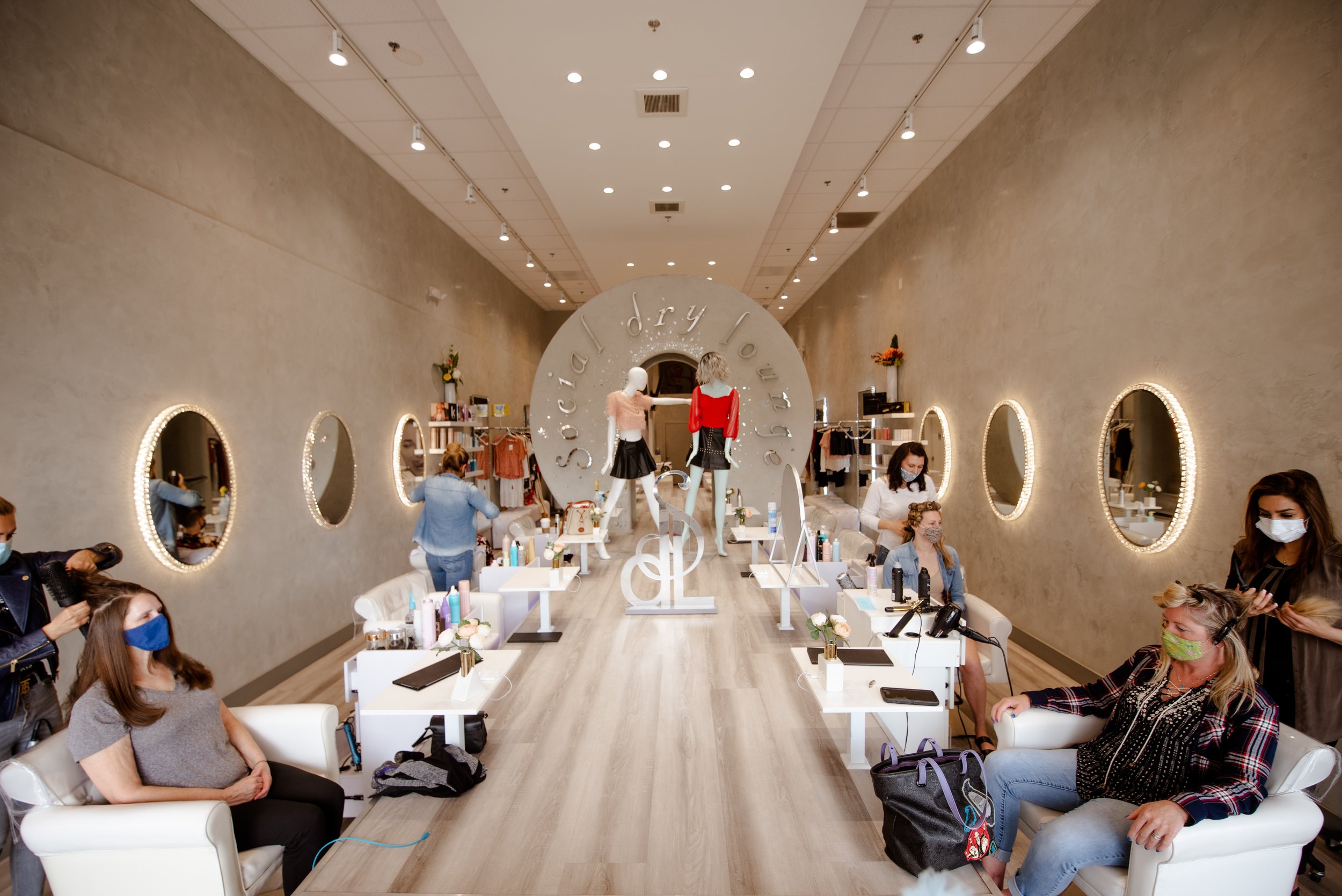
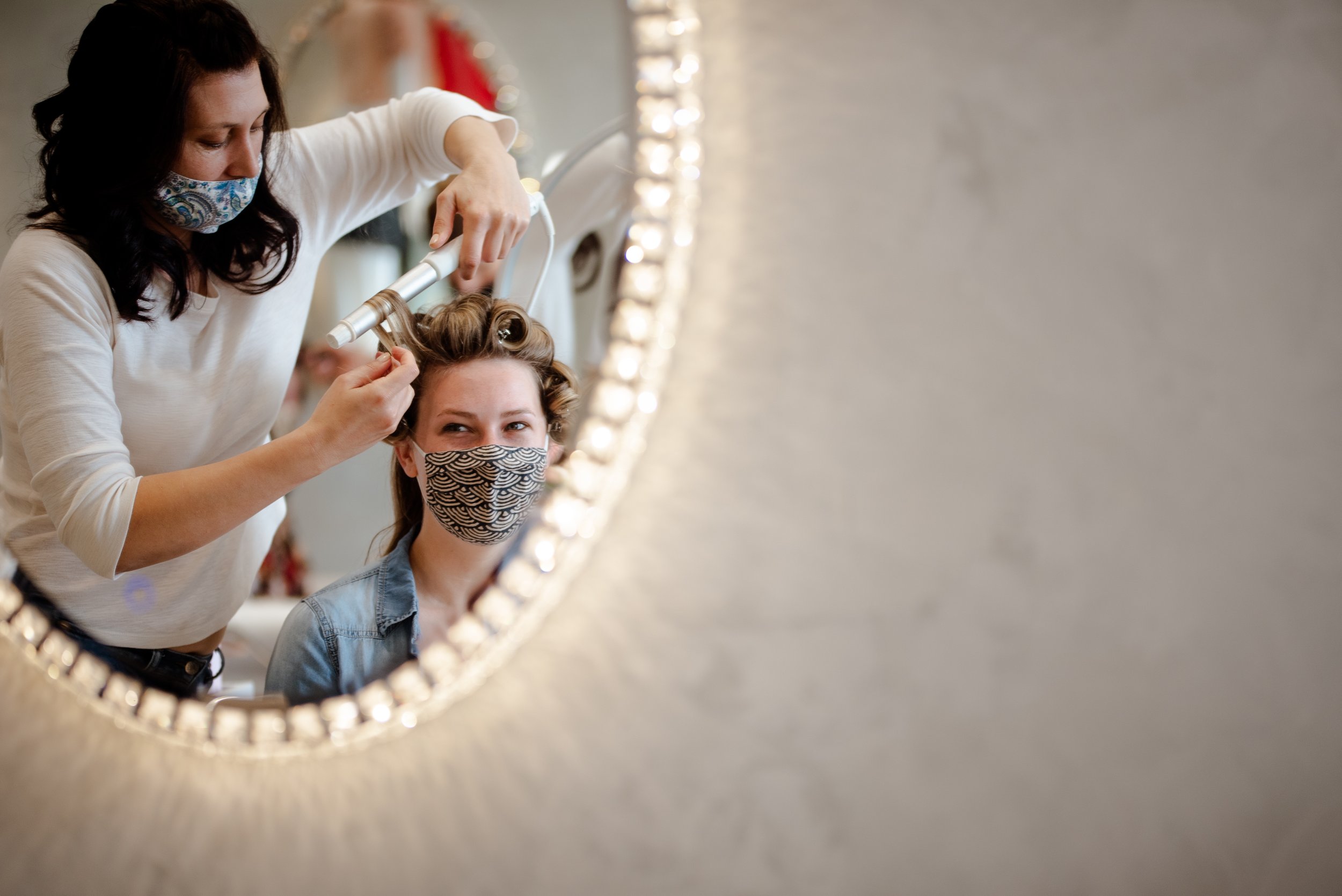
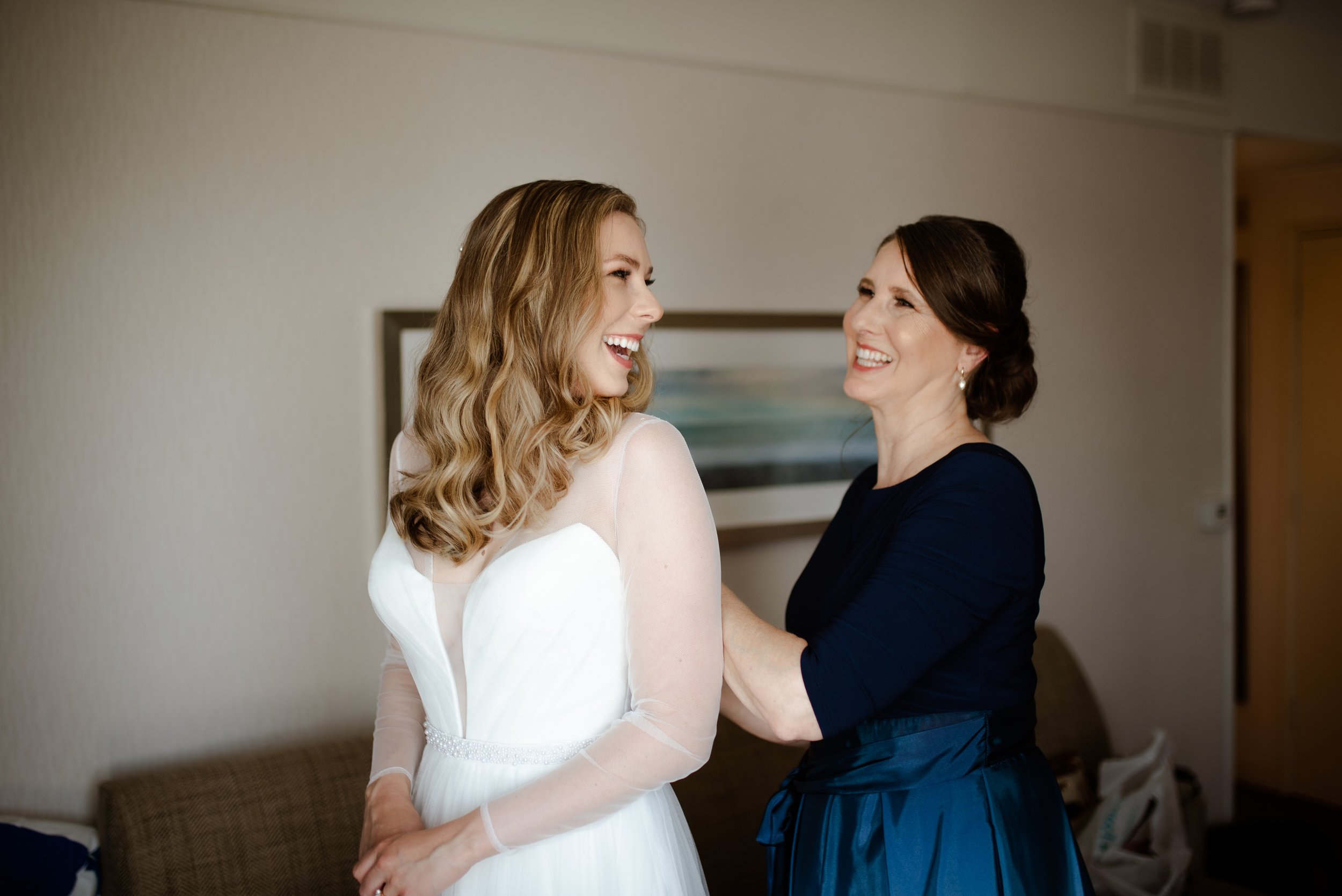
Kim’s morning preparations before the wedding
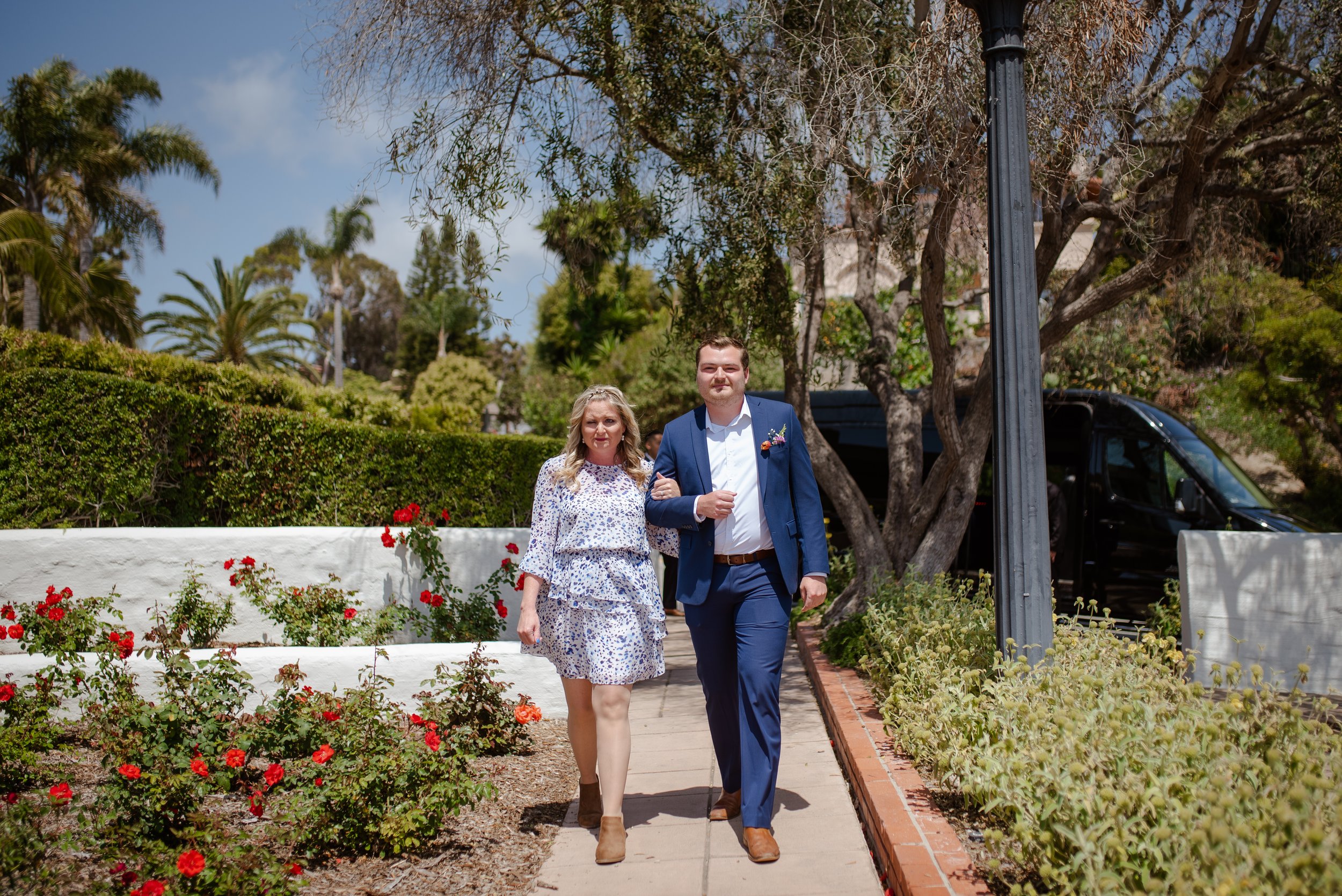
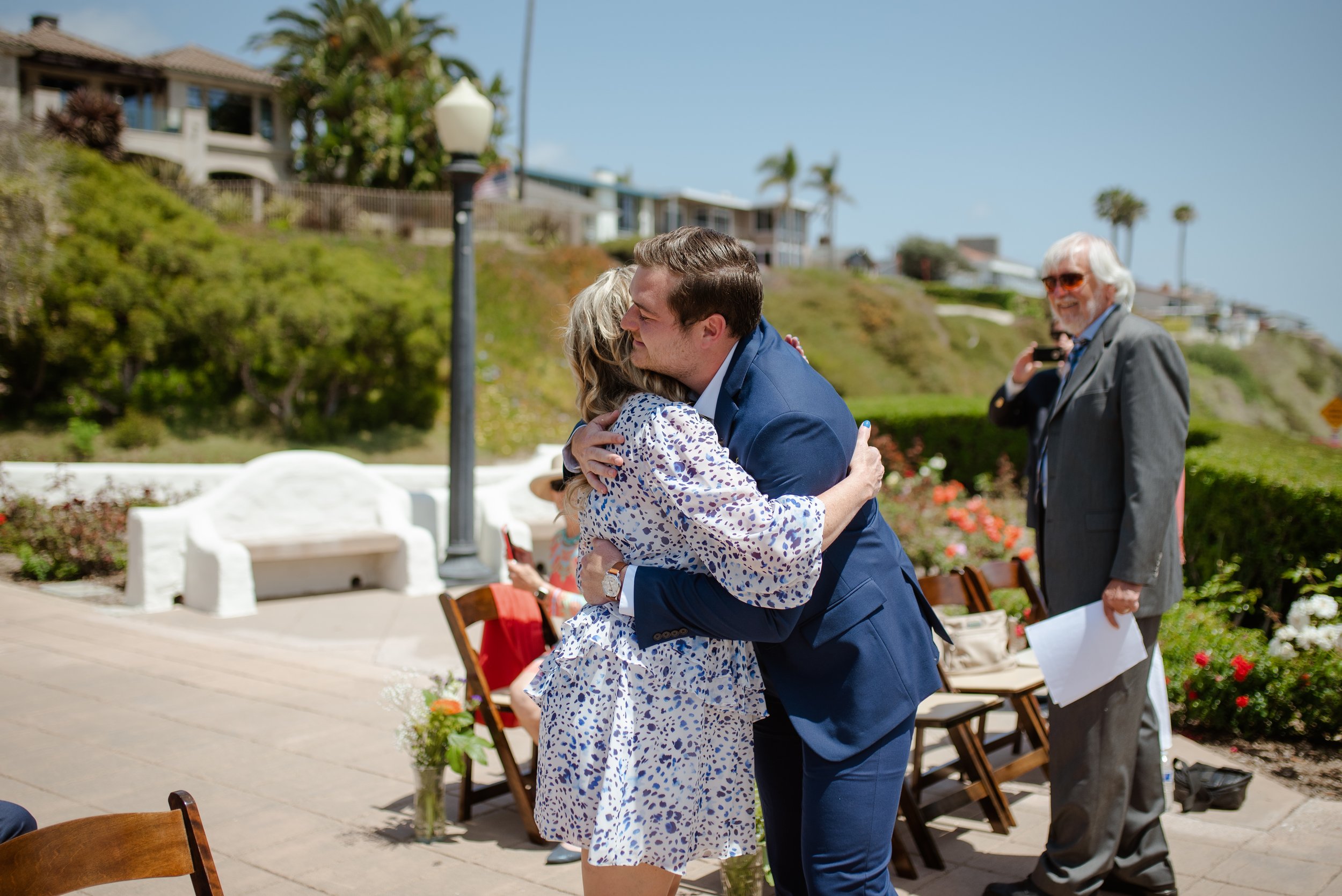
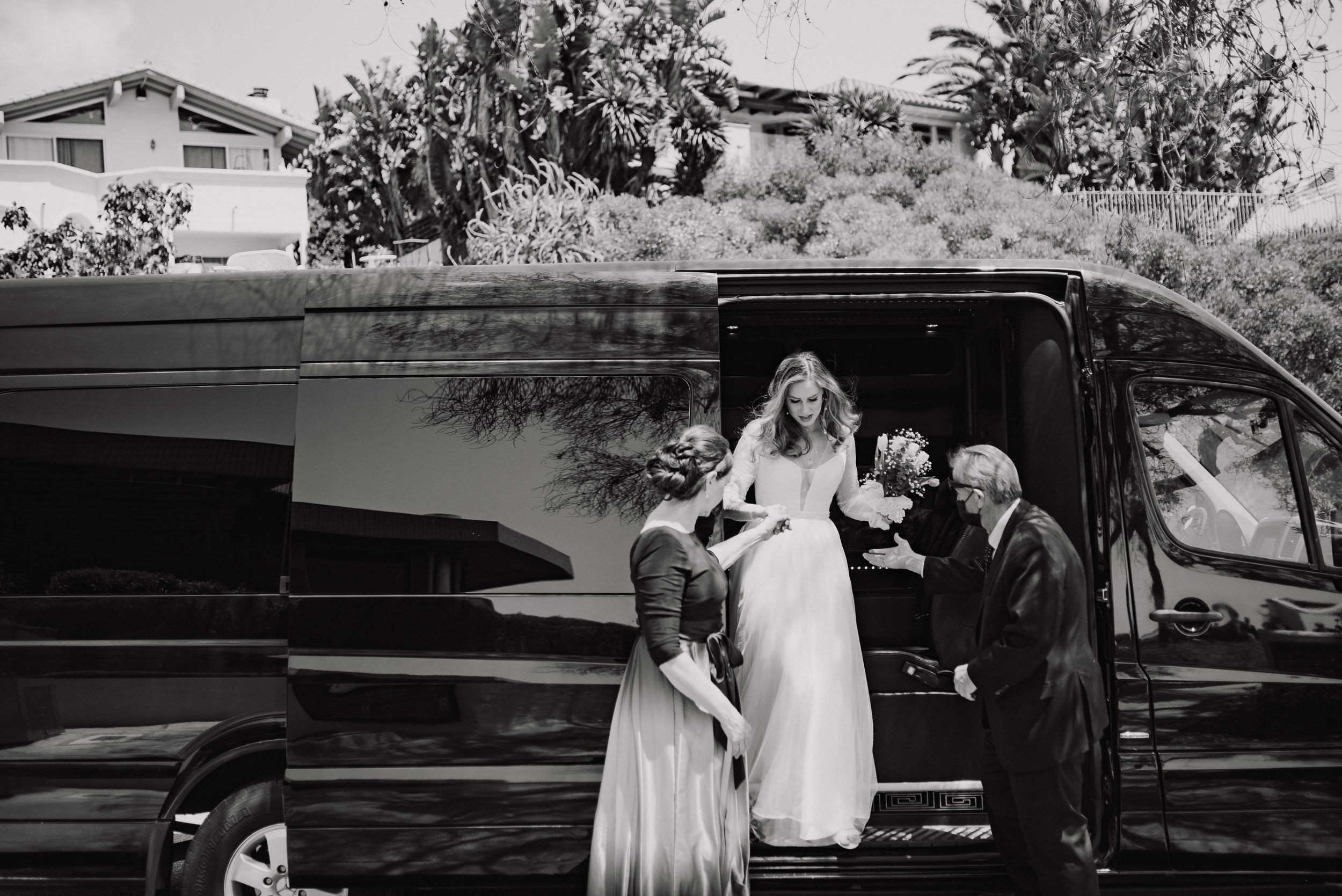
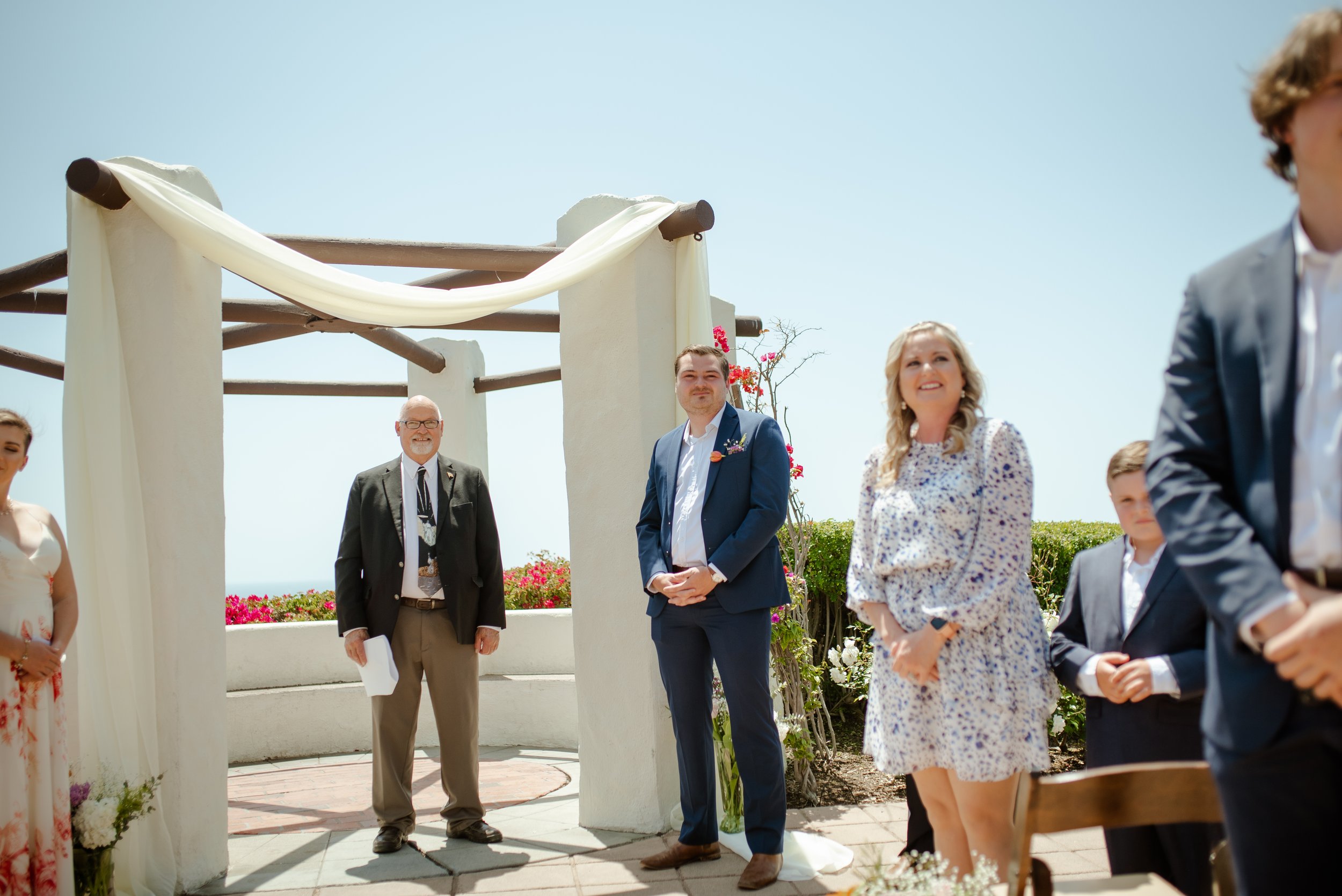
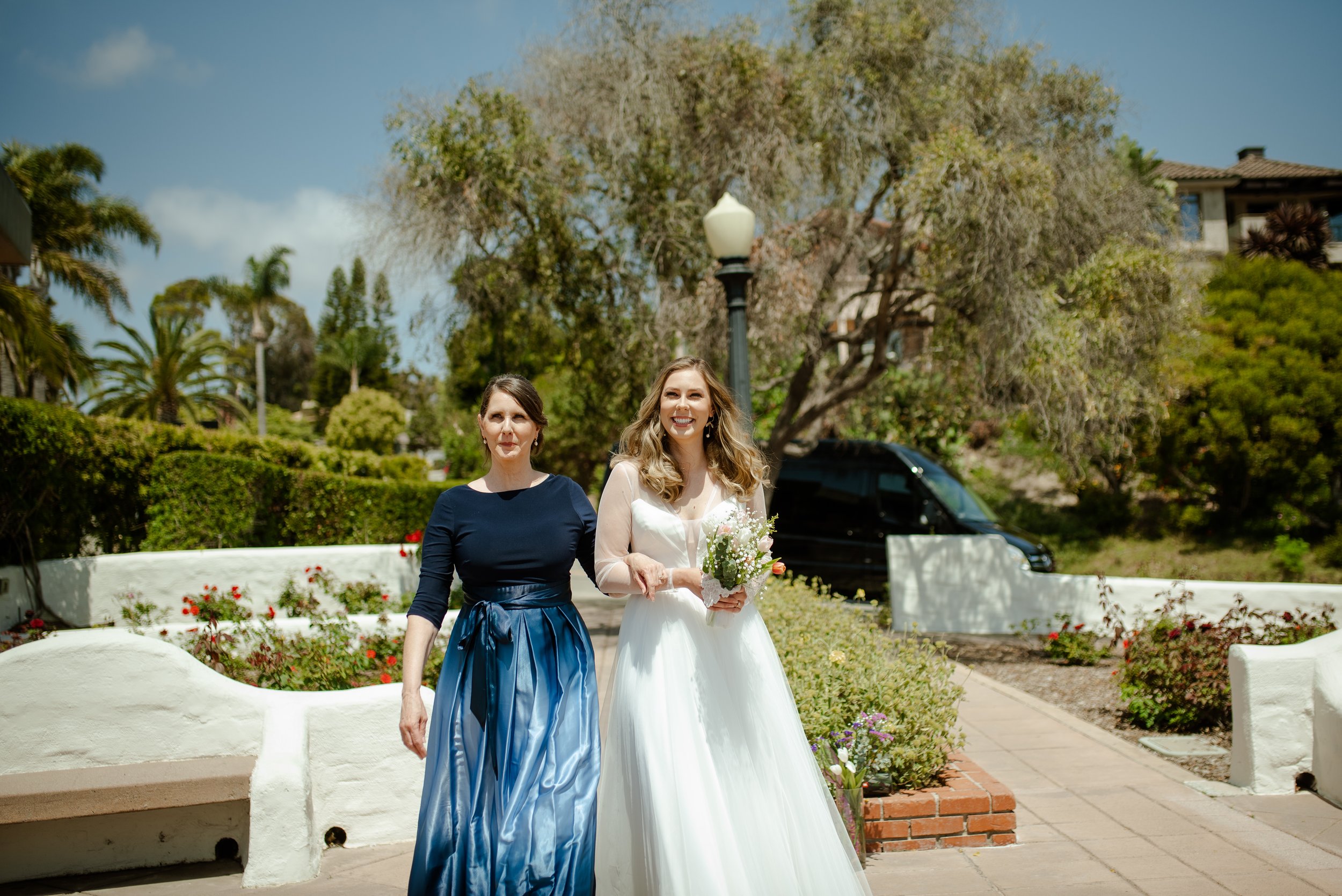
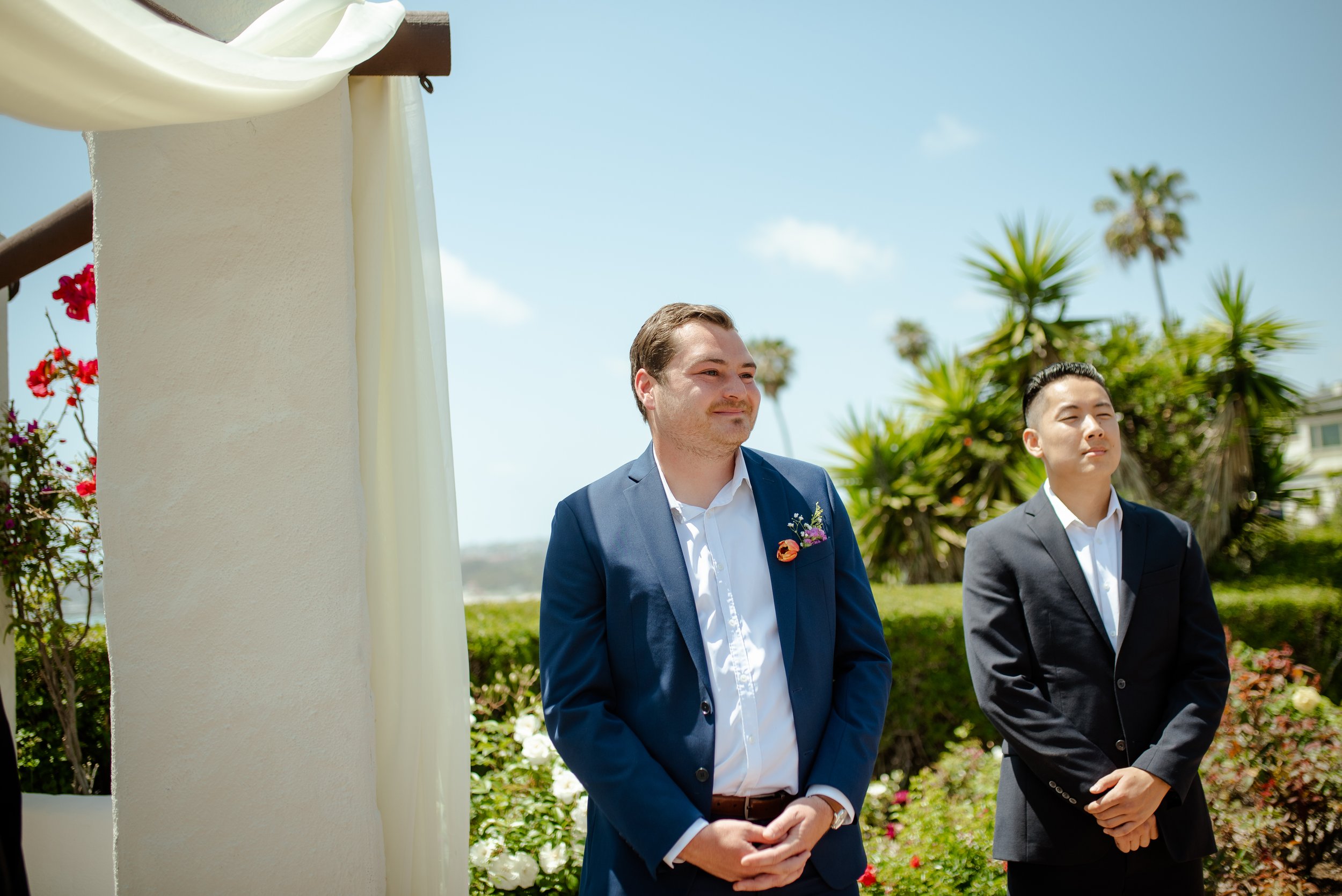
Kim and Cody processing with their mothers at the start of the wedding ceremony
Cody's grandfather served as the officiant. "Good afternoon! Kim, Cody, and I would like to welcome everyone on this gorgeous day. It's because of all of you that Kim and Cody's relationship has strengthened and grown and led them to this very moment. Thank you all for being here today.”
Kim and Cody’s wedding ceremony
Cody's younger brother, Diesel, recited from 1 Peter; he sounded nervous, and kept his eyes fixed on the sheet of paper he read from. But his practice showed, and barely stumbled over the words. "Above all, love each other deeply, because love covers over a multitude of sins. Offer hospitality to one another without grumbling. Each of you should use whatever gift you have received to serve others, as faithful stewards of God’s grace in its various forms.”
Cody’s brother reading a passage from the bible during the ceremony
Kim's stepfather then stood up to read a passage from C.S. Lewis' Mere Christianity. "Being in love is a good thing, but it is not the best thing. There are many things below it, but there are also things above it. You cannot make it the basis of a whole life. It is a noble feeling, but it is still a feeling... Knowledge can last, principles can last, habits can last; but feelings come and go... But, of course, ceasing to be in love need not mean ceasing to love.”
“Love in this second sense—love as distinct from being in love—is not merely a feeling. It is a deep unity, maintained by the will and deliberately strengthened by habit; reinforced by (in Christian marriages) the grace which both partners ask, and receive, from God... Being in love first moved them to promise fidelity: this quieter love enables them to keep the promise. It is on this love that the engine of marriage is run: being in love was the explosion that started it.”
Kim’s stepfather reading from Mere Christianity during the ceremony
After her stepfather finished reading, Kim and Cody faced one another to recite their own vows, themselves a physical representation of some of their biggest personality differences. Cody’s were efficient, organized, and action-oriented, typed and grouped into sections with bullet points; Kim’s were comprehensive, creative, and person-oriented, hand-written on two pages, with a running word count in the margins.
Kim’s vows on the left, Cody’s on the right
Kim went first. "Cody, I had never really considered the idea of marriage until I met you. Marriage was for other people, but not for me. But that changed when I met you. My gut, which is hardly ever wrong, told me that you were something special. You were sitting there at dinner with our group in your blue Dodgers T-Shirt. We had just met, and as we started talking, I thought to myself, 'This is the most fascinating and infuriating person I have ever met.' And that's when I knew."
"You were enigmatic, uncharacteristically vulnerable and honest. And I felt so comfortable with you so quickly. It's like I had known you my whole life. We had shared experiences, shared goals, and the same love of life that I knew were solid building blocks for a lasting relationship. I spent the next few weeks trying to play it cool, but as we both know, I was terrible at that."
Cody did his best to hold back tears. He pressed his eyes closed two or three times, joking, “The sun is just so bright, you know?” Someone from Kim’s family passed along a handkerchief. (Kim seemed pleased to have drawn such emotion out of Cody.)
"We built a relationship anchored in trust, intimacy, and love. You are my best friend; my confidant who knows me better than anyone; a partner who is always supporting me to become the best version of myself, and the one person I always want by my side. Because of you, my life has been filled with so much laughter, adventure, and love. You are the person who inspires me the most in my life—your love and loyalty to your family, how hard you work and your drive to serve others, how intentional and thoughtful you are about your actions. And you have a great butt, too."
"I am so excited to continue to share my life with you, and so proud to be able to call you my family. I want to take on the challenges and joys of life together with you. By marrying you today, I promise to spend my life supporting and challenging you, too. I promise to build a life and a legacy together, and always keep you as a priority. I promise to communicate with you, even when it is tough to do that, and even when I'm hangry.”
“I promise to spend my life as your partner in crime, your confidant, and your greatest defender. I'll strive to find patience and understanding in times of disagreement, and I will even consider negotiating the number of plants in our house”—Kim has always wanted more plants in their home, Cody less—“even though I know you'll try to lowball me. I promise to fully engage in the seasons of our lives together, keep exploring and adventuring together, and never stop arguing about politics with you."
"Most of all, I will choose you as my partner, everyday, even when life gets rough. I promise today to love you with my whole heart, and for the rest of my life."
Cody followed, wiping his eyes one more time and pulling out his typed vows. "Kim, I still cannot believe we are standing here today. First, because a month ago we had no idea where we were getting married, but also because I did not think that when I was moving up to Sacramento that I would be finding the love of my life."
"You know I don't believe in soulmates, but from the moment we met there has always been something special about our relationship. There has never been another person in my life that I just clicked so well with. A person I feel like knew me and my experiences before we even talked."
"It's hard to express my love for you in the words I know, but here are just a few of the things I love about you, in no particular order.
“You love to have fun. No matter where we are—an amusement park or a grocery store, you're always having a good time, and helping others enjoy themselves too.
“Even though you don't like to admit it, you're competitive. Although you can't beat me in most games (like Bananagrams) your drive to grow yourself challenges me to grow as well.”
“You are so humble, and you can find joy and be content in almost any circumstance.
“You're such a nerd. You have a curiosity about the world that makes me want to learn more to keep up (and maybe even read a book someday.)"
"You love others more than I ever thought was possible and challenge me to love more than I thought I could. In a world of self-interest, you constantly put others' needs before your own.
“You are quick to listen, to understand, and to forgive. Ultimately, you make me a better person, and I hope to become more like you every day of our relationship.”
“If I have learned on thing over the past four and a half years of our relationship, it's that love takes sacrifice. It takes giving of one's self daily, even when you really, really don't want to. But you are worth so much more than that sacrifice. It's no longer about me, it's about us."
"Now, you've heard me say a million times that I think love is more than a feeling, it is an action. And you know that I am intentional about almost everything I do, especially relationships. So today, in front of our family and friends, I want to commit to you the ways I plan to show you my love."
"I will be slow to anger and quick to listen. I will work towards solutions and compromise instead of always trying to win, except in Connect Four. I will try new places, new foods, and new adventures even when I'm not comfortable, and encourage you to do the same. I will support your passions and your goals in both word and action. I will care for you in good times and bad, and especially in mundane times.”
“More than anything, Kim, I will strive to love you more each day."
A few hours separated Kim and Cody’s ceremony and their reception, and we took the time for portraits. In-between all the pretty, posed photos, Kim and Cody had their own fun, dancing and falling into one another as we walked through a neighborhood park. It was a beautiful Saturday, and plenty of people picnicked where we took photos. Most offered congratulations, and one offered White Claws, which Kim and Cody happily accepted.
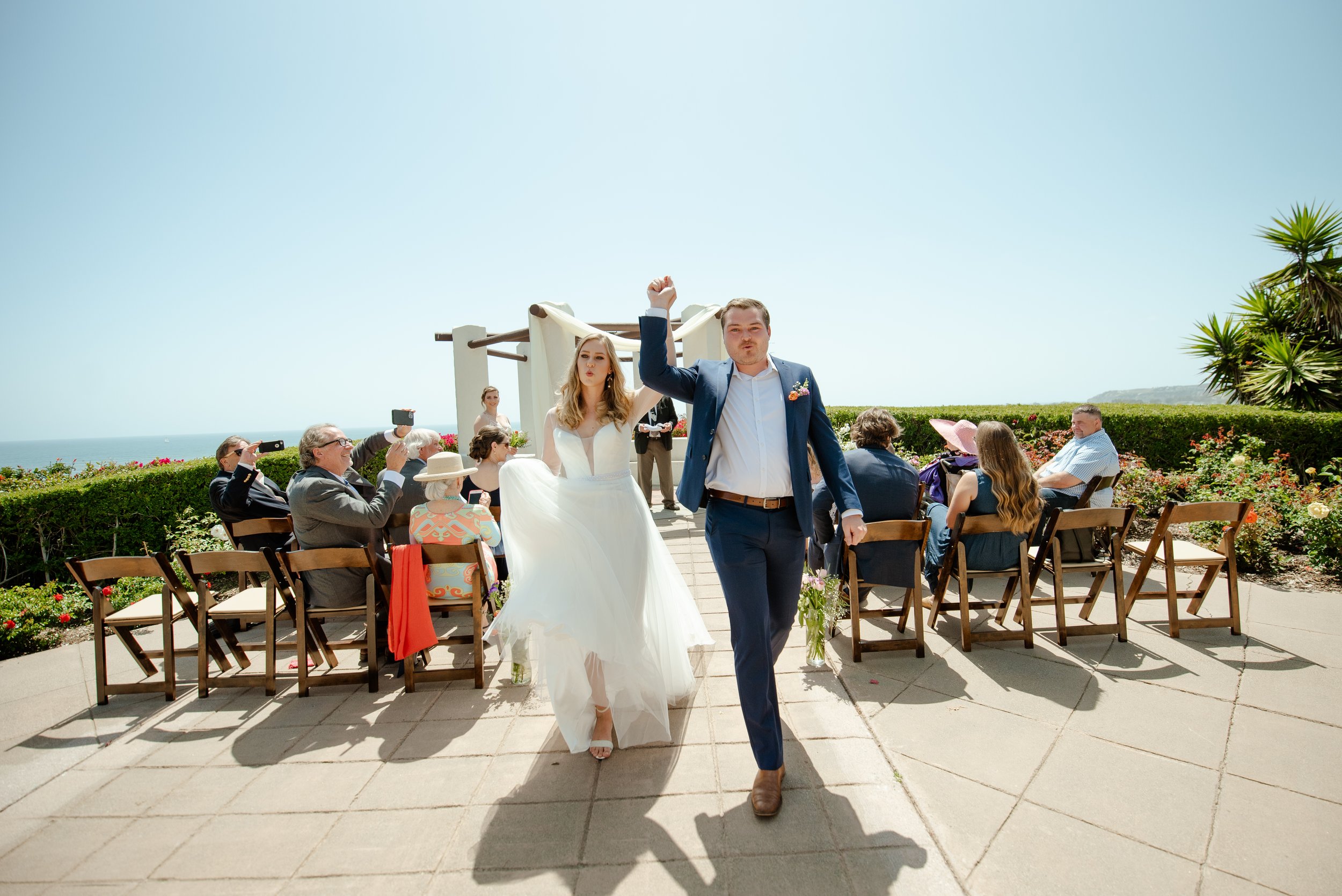
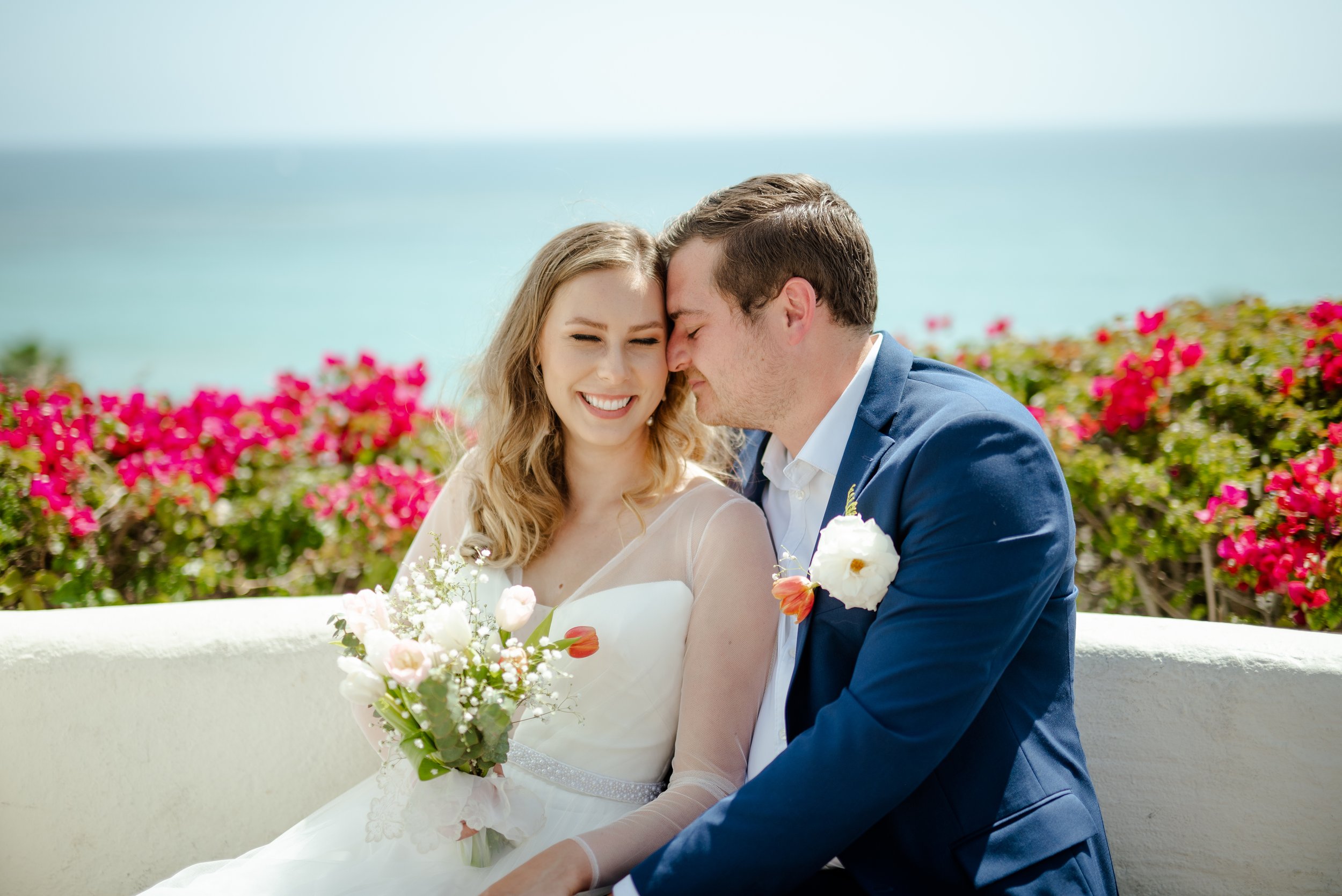
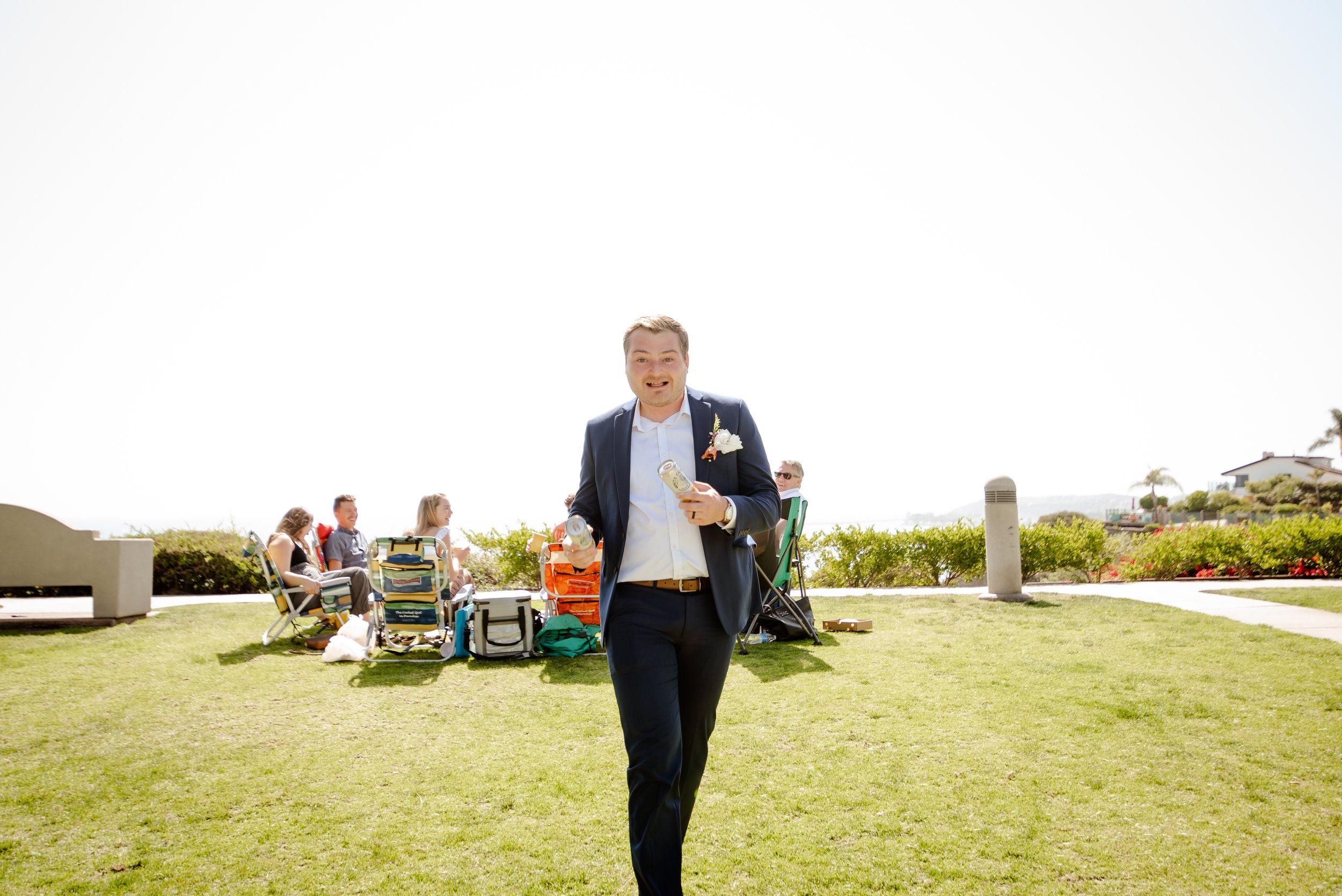
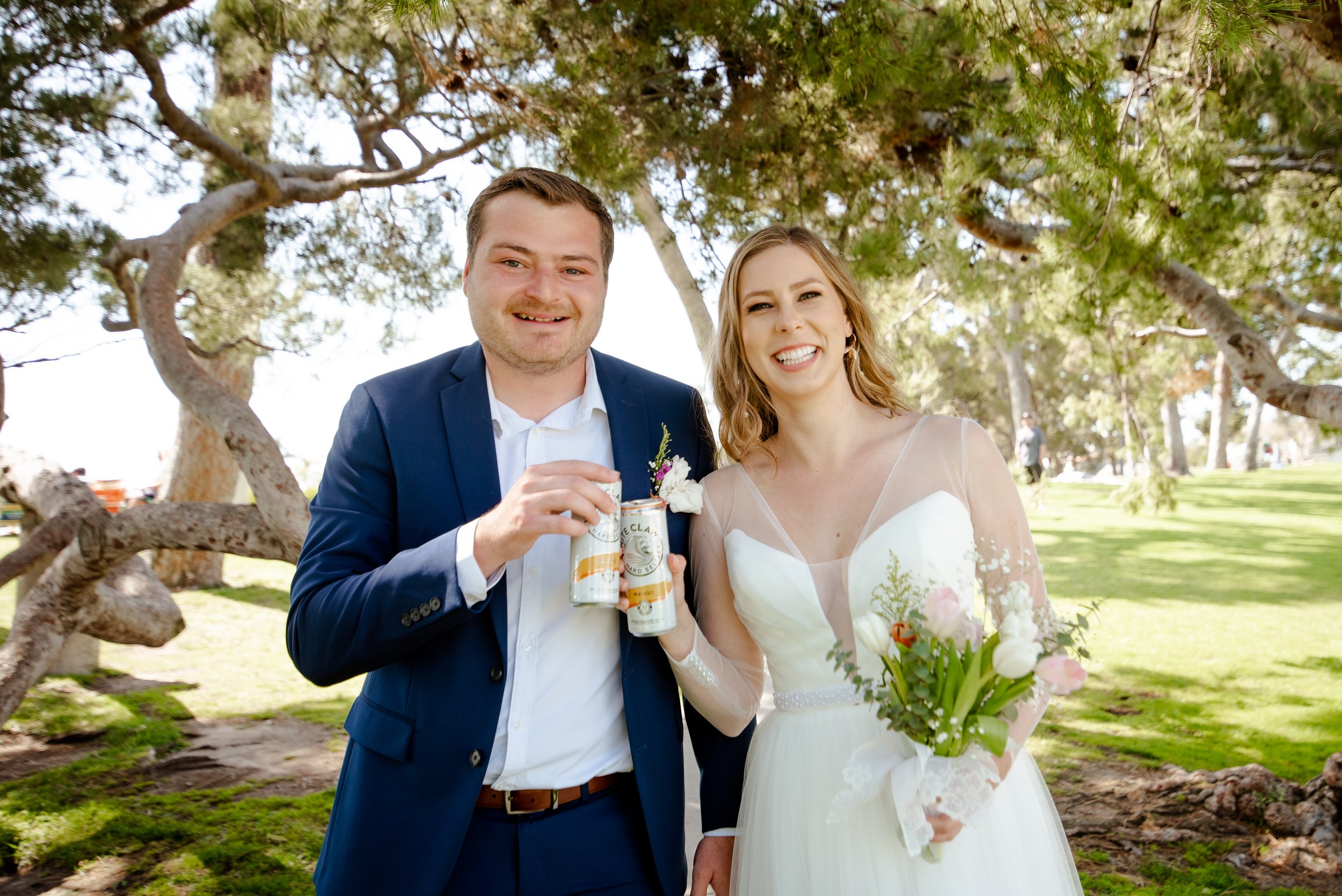
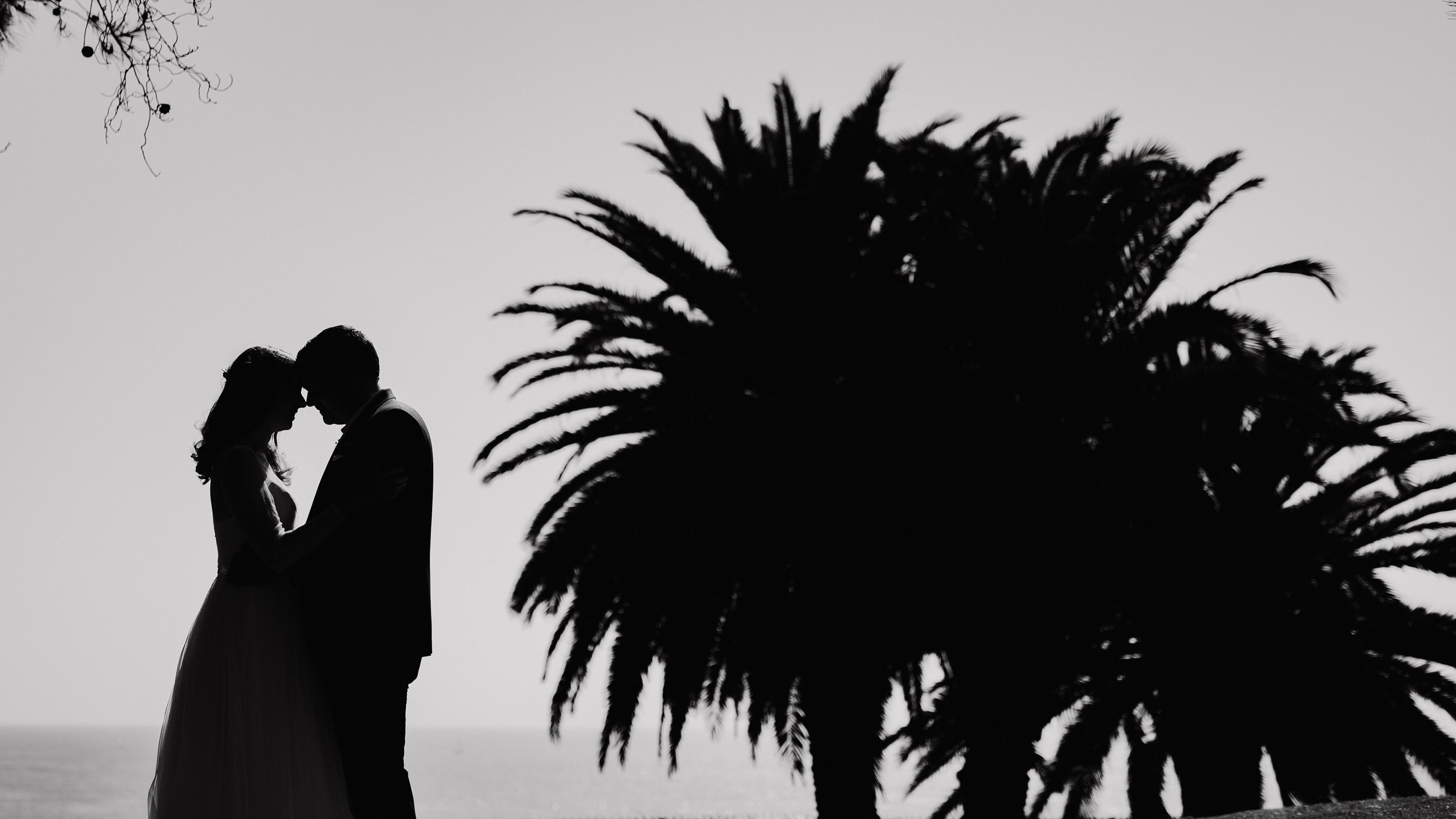
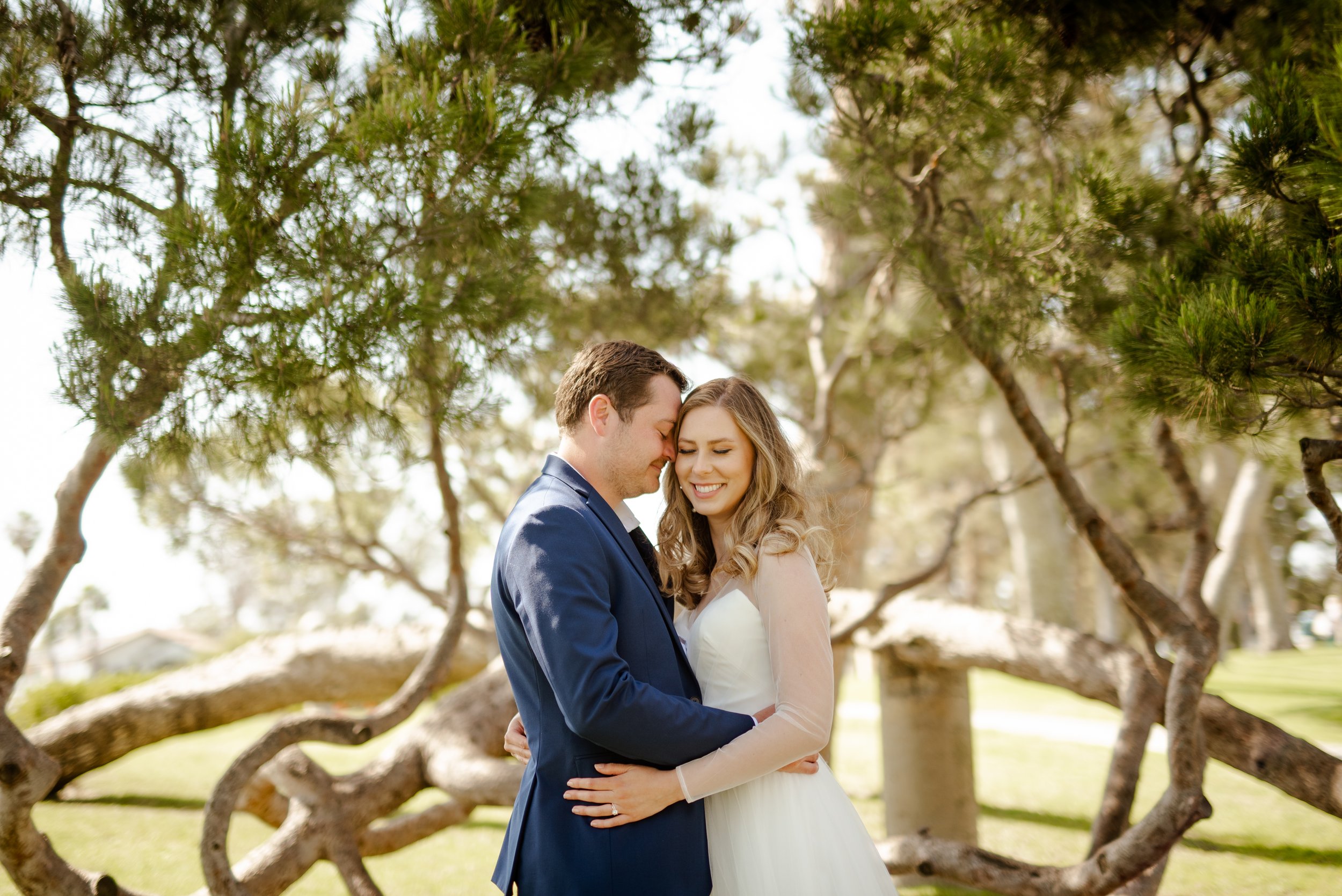
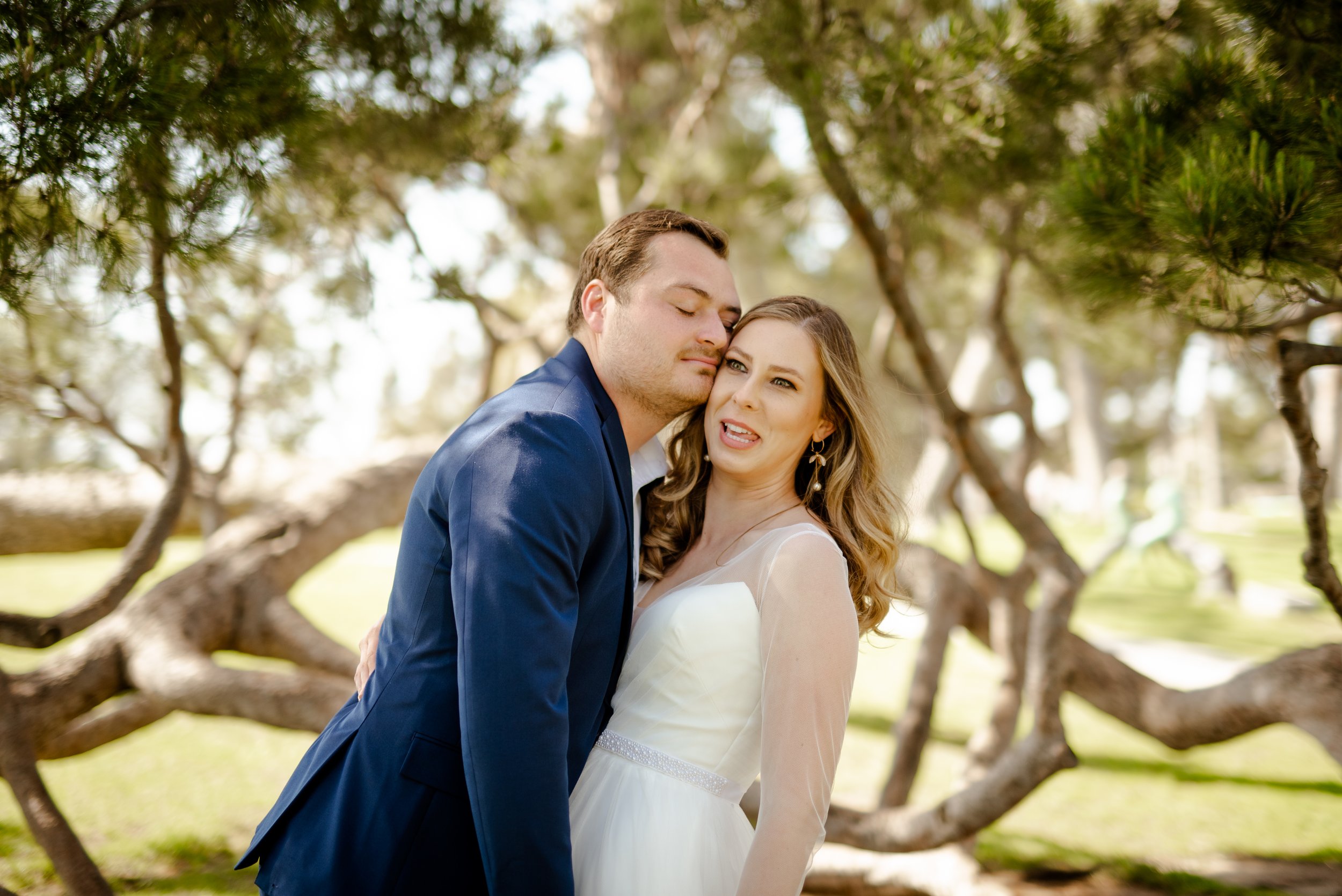
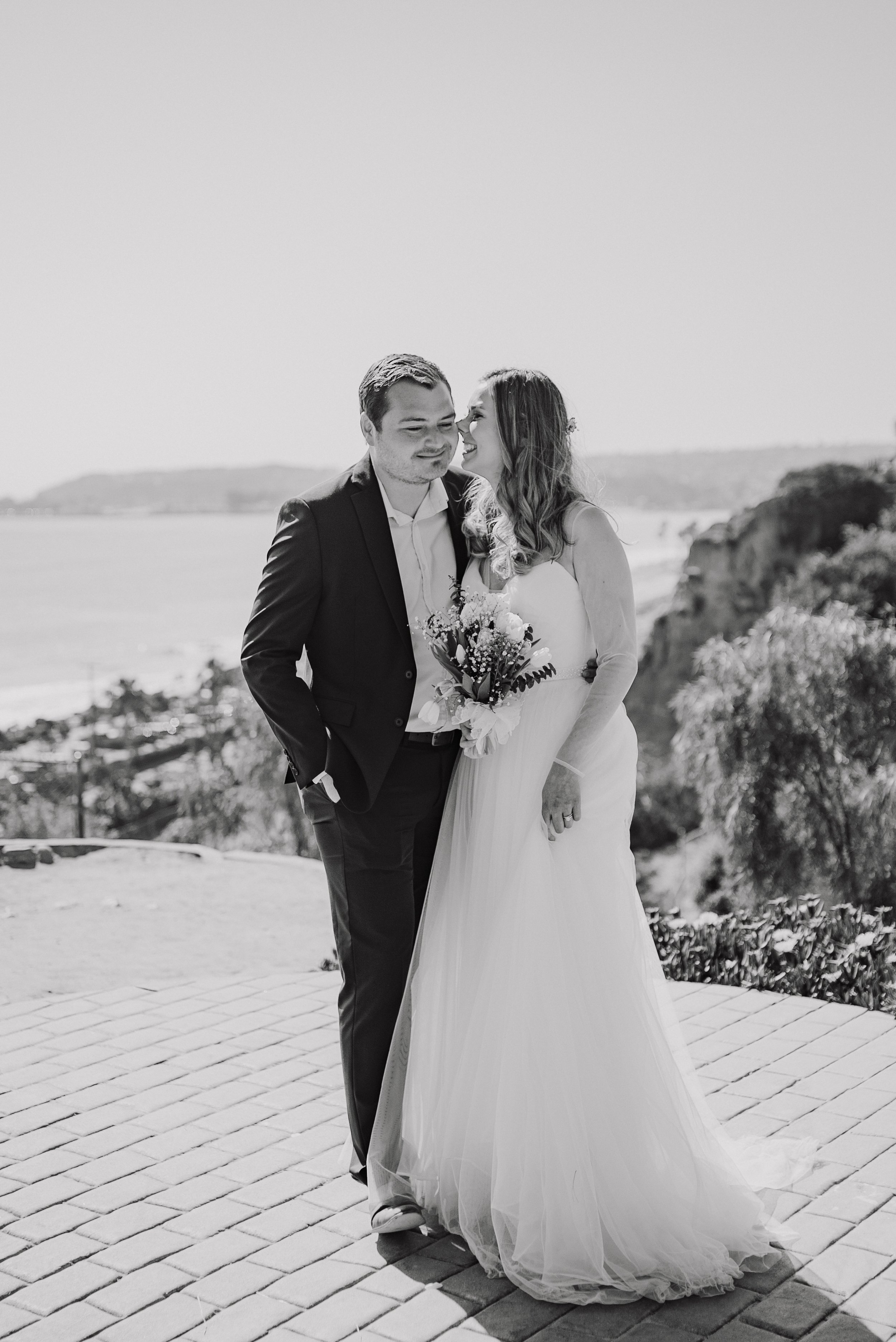
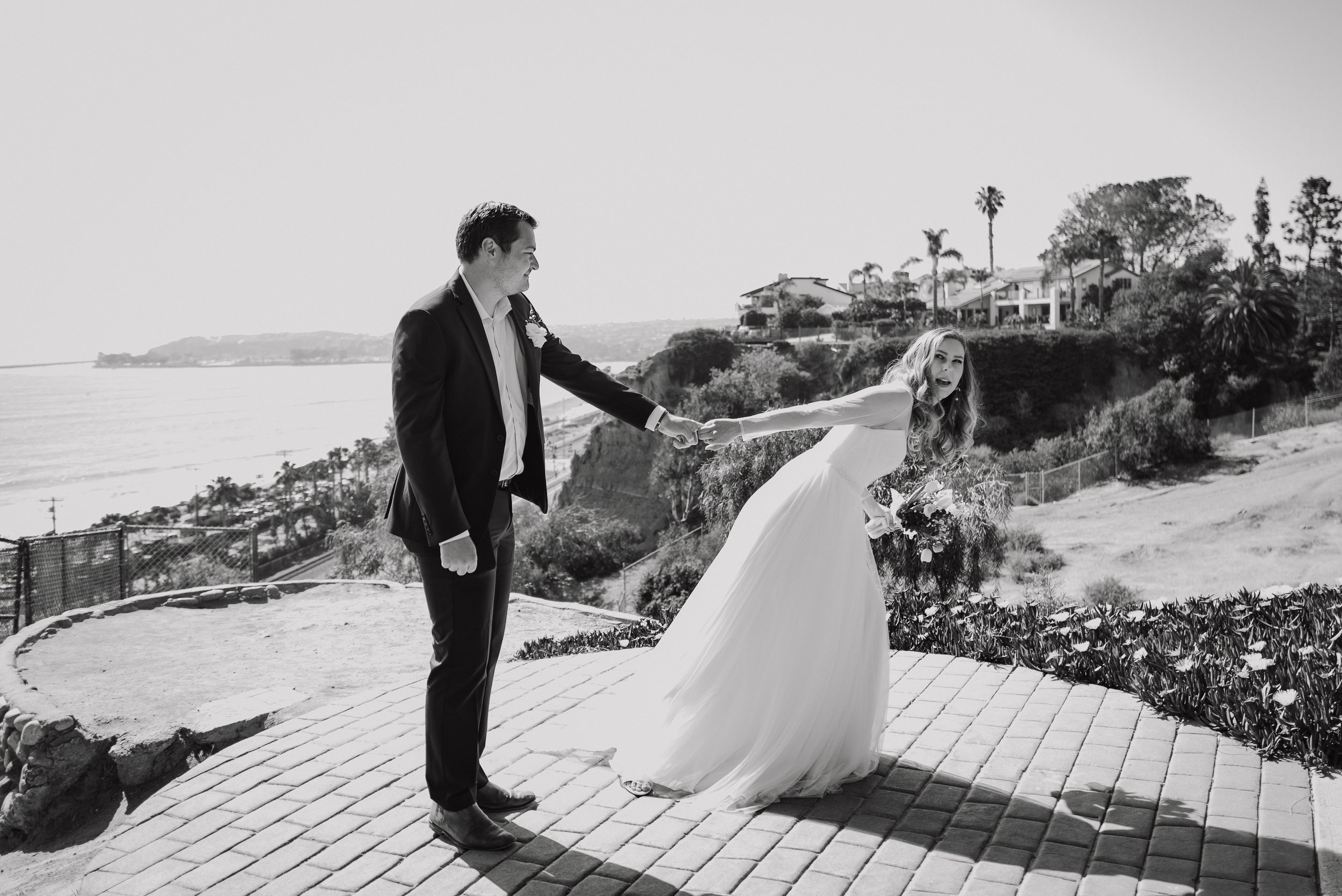
Their reception was dinner at a local Italian restaurant, with time-worn brick walls, intimate low ceilings, and a single long wooden table where we all sat. Between Lauren, Kim's best woman, and Mike, Cody's grandfather, they'd saved a seat for me. We ate, and as I watched for moments to photograph—clinking glasses that signaled a kiss, the waiter preparing a small cake off to the side—I was reminded of just how special it was that I, a stranger just two months earlier, could eat and drink and laugh alongside Kim and Cody’s closest friends and family.
Cody and Kim with their families and friends at their reception dinner
Kim and Cody's wedding was the last micro-wedding I photographed as a result of the pandemic. For a full year, weddings had been small, limited by both state restrictions and hesitant guests. But now, in May of 2021, with vaccines widely available and spring turning to summer, most couples had returned to planning the larger, traditional weddings of the past: hundreds of guests, elegant wedding suites, sparkler send offs, tens of thousands of dollars.
And as happy as I am that those moments can return, grateful that they are safe once again, I will never forget or take for granted the privilege I had through the pandemic to be a part of these smaller celebrations, where, for a few hours, we could share in joy amid sorrow, and love amid grief.
Five times now I've spent time with Kim and Cody, and five times I’ve found them in new places and living new lives. The first was in Durham in March 2021, towards the end of Cody’s time in business school; the second was in Dana Point in May where we celebrated their wedding; the third was in Bakersfield in July, where I found them in transition; the fourth was in San Francisco in November, where they’d begun to build and settle in to life; and the fifth was in San Rafael in May 2022, where they hosted a 1-year wedding reception to gather all the friends and family they couldn’t invite a year earlier in Dana Point.
I stopped by Bakersfield while on a drive from Tucson to San Francisco, when Kim and Cody happened to be staying near his family, waiting for Kim to hear back from a job opportunity in Washington D.C.. Cody had graduated from business school, and as he and Kim began their road trip back to the west coast, where Cody would soon start work in July 2021, Kim received a call from a Washington D.C. number. She picked up, and someone from the Federal Administration introduced herself, asking if Kim wanted to interview for a position in a federal department. The role was as a legislative analyst, similar to what she and Cody had done in the California legislature. Kim had submitted her resumé months before, and assumed it'd gone nowhere; now, she spent frantic hours on the road scheduling rounds of probing interviews.
Cody, Kim, and their dog June on their cross-country move from Durham to San Francisco
"There's a scenario where we could end up on opposite coasts for a period of time,” Kim told me as we had dinner together in Bakersfield, “because Cody starts work in just a few days, and wouldn't be sure if he could get transferred to D.C.. And I just don't know yet." She paused. "What is that rule again, where everything that can go wrong, will go wrong?"—Murphey's Law—"We joked that I wouldn't get a call from DC until we signed a lease in SF, and honestly, it's pretty close.”
She continued. “For no other opportunity would I make us put things on hold like this. But this one's a biggie, and I know it's the same for him. I would've never asked him not to go to business school, for example, because I knew it was important to him." The question, she said, was never of if they were going to make it work, but how.
Cody and Kim while on their honeymoon in Greece
A few months after that, in November 2021, I met with Kim and Cody in San Francisco to catch up and explore the city for a day. "A few days after we last saw you in Bakersfield, I got the news that I didn't get the job," Kim told me. She said that the person who did get it had years more experience, and that it made a lot of sense, but I could still sense a bit of longing and disappointment in her voice.
Of course, not getting the job in D.C. meant she and Cody could start their life, together, in San Francisco. They'd gotten a great deal on their apartment because of pandemic discounts, and their area of the city, Cow Hollow, was fancier than their lifestyle. "There are all these great, expensive restaurants near us," Kim said, "but usually we just, like, want a really good, cheap breakfast burrito."
Cody and Kim on a walk in San Francisco
Both were now working, Cody at a management consulting firm and Kim at a marketing agency, and hoped to spend the next few years paying down student loan debt and focusing on their careers. (Kids, if they ever have them, are seven to ten years down the line, in their mid to late 30’s.)
Cody and Kim in San Francisco
I asked about their work; the two had met in politics, and so much of their relationship was shaped by it. Yet neither of them now worked in it. How did that feel? "Politics definitely comes up less than before," Cody replied. "It used to be a huge part of our relationship, but now... it's not like we're having an identity crisis, but..." Kim stepped in. "We're definitely just a lot less informed than before. We can't talk as much about the nuance of policies, and what comes up now is more what happens in the world that we care about.”
They noted the difference in the motivations of the people they met in politics and in the corporate world. "People usually get into public service because they have some experience that drives them to it, right?" Cody said. "In Sacramento, you're surrounded by people that kind of have a chip on their shoulder or are very mission driven towards making the world better in some way. And it's not quite the same way in the private sector." People's passions were now driven by their hobbies: traveling, living for the weekend, bicycling, and other fun and valid things, yet undeniably different from what drove the culture around them in Sacramento.
Cody once told me about an idea often used in Christian millennial circles called "deconstructionism," a term describing the period of time when one has left an environment that makes it easy (or at least natural) to believe a certain set of ideas, and is then forced to deconstruct their beliefs and evaluate them one-by-one upon their own merits and demerits. He talked then in reference to Christianity, and the ways he and Kim evaluated the role faith would play in their current and future lives. But it also served as a suitable description of their current relationship to politics. Removed from Sacramento, a calendar filled with policy meetings, a social circle where political debate was met with enthusiasm instead of disdain, what remained?
Kim with June on a weekend in SF
Some lessons are ingrained, and already present themselves outside of formal politics. "Someone at my workplace said this as a compliment," Kim began, "but remarked that they really liked me and Cody because we were climbers." She blanched at the use of a word often reserved for conniving people with hidden agendas and ulterior motives. "But they explained more, and said how we had a specific direction we wanted to head in life, and how we're very thoughtful about how we're going to get there and who could help in that journey. And that's politics, right? Building and maintaining relationships with people."
Other conversations would only reveal themselves over time, and through this transition. A welcome one, to be sure, with its larger paychecks and financial stability; but a transition, nonetheless. "I think a lot of this is just tied with the normal adult things of life," Kim said. "We've been in environments that often felt like an extension of college. Sacramento was lots of people who were the same age that we were friends with. Durham was literally another college. And now, we're adults, with full-time jobs, and we don't see friends a lot. And I think those things are tied together." She turned to Cody. "We used to be doing the same things that we both cared about. And now we're doing two very different things, our networks are very different, and we're just trying to figure all of that out."
The fifth, and most recent, time I saw Kim and Cody was at their 1-year wedding reception. Unlike each of the previous four times, Kim and Cody were surrounded this time by dozens of their own friends from across all of their lives—their childhoods, college years, time in Sacramento, in Durham, and now in San Francisco.
Group photo of those in attendance at Kim and Cody’s 2021 wedding in Dana Point, California
Group photo of those in attendance at Kim and Cody’s 2022 wedding reception
Weddings are singular in their ability to do this; to gather disparate communities with a common aim of celebrating two people’s love. When Kim and Cody forewent a larger wedding in 2021 because of lingering COVID restrictions and precautions, among their strongest emotions, aside from their joy in being married, was disappointment that these communities—these friends met and made over nearly three decades of life—could not be there, too.
I have photographed many couples married in the pandemic who voiced plans to host larger celebrations in 2022 and beyond, determined to gather the people missing from their smaller ceremonies. So perhaps it is an apt symbol of the importance of community to Kim and Cody that they are the only couple I’ve photographed who have made good on those plans, on a Saturday in May of 2022 in San Rafael, California, half an hour’s drive north of San Francisco.
The Friday night before, Kim and Cody gathered their immediate families and wedding party at a seaside park for a dinner more reunion than rehearsal. Cody’s stepfather lit a bag of charcoal and grilled hot dogs and hamburgers for everyone. (Cody had made sure to pick up a few vegan patties for the vegetarians.) Friends and family stood in small circles or sat around picnic tables to a backdrop of a perfect Californian sunset.
Photos from Kim and Cody’s 1-year wedding reception rehearsal dinner in May 2022
The next morning, a few hours before the wedding, I started my day with Cody, waking early to pick up a U-Haul in order to move and store a delivery of rental tables, plates, cutlery, and glasses of all shapes and sizes. Even though they now both worked full-time, Kim and Cody were still determined to save money where they could, shopping themselves (cases of Costco wine and beer), organizing catering (a taco bar), and finding a location (the Falkirk Cultural Center located in downtown San Rafael) that was publicly-owned and thus far cheaper than private wedding venues in the area.
Kim and Cody did not recreate a ceremony for their 1-year later wedding reception. The whole point of the weekend was to spend as much time as possible with friends and family; a formal ceremony would just take away from that already limited time. Their guests arrived to a cocktail hour, followed by dinner, followed by hours of dancing inside the venue and conversation on an outdoor porch.
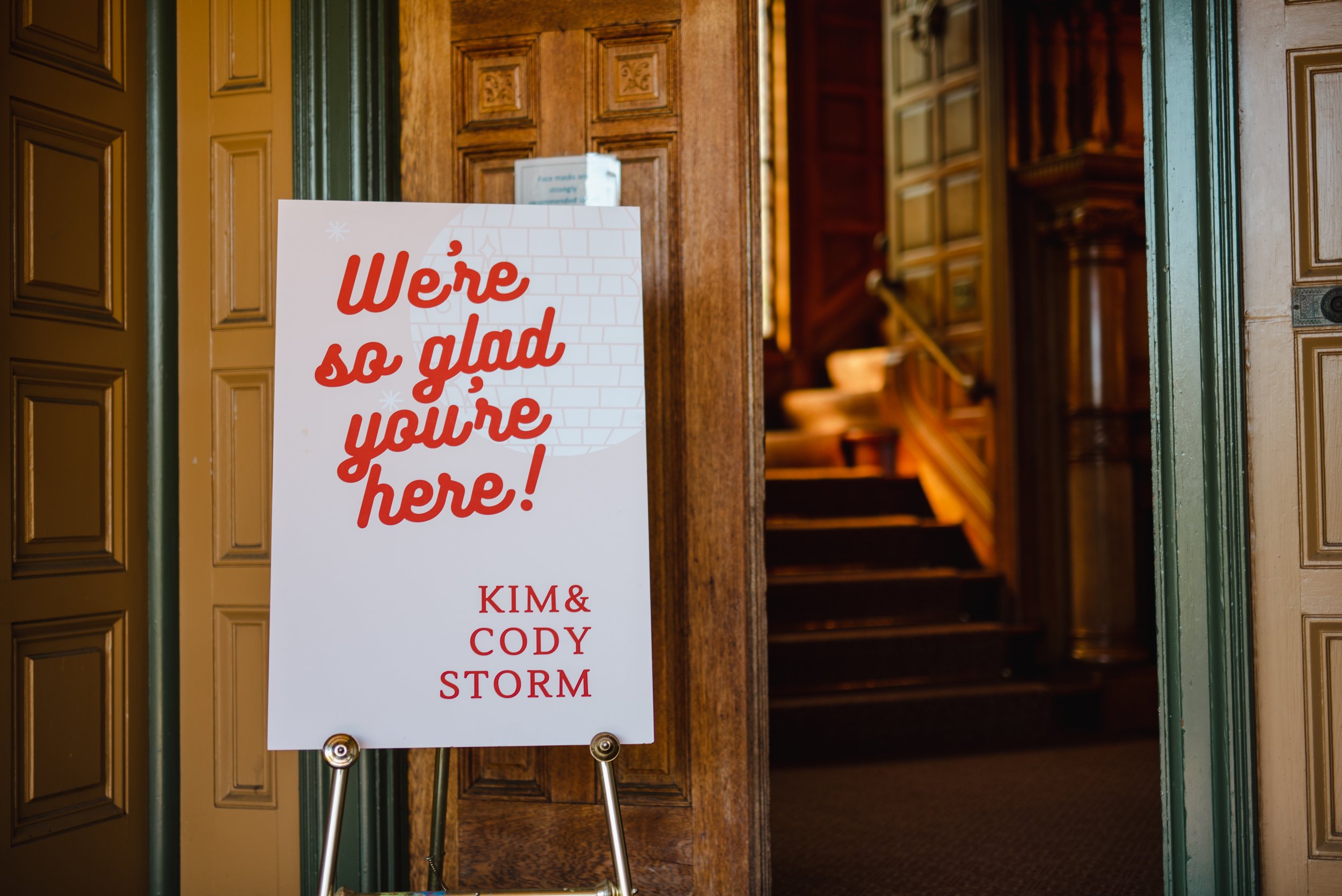
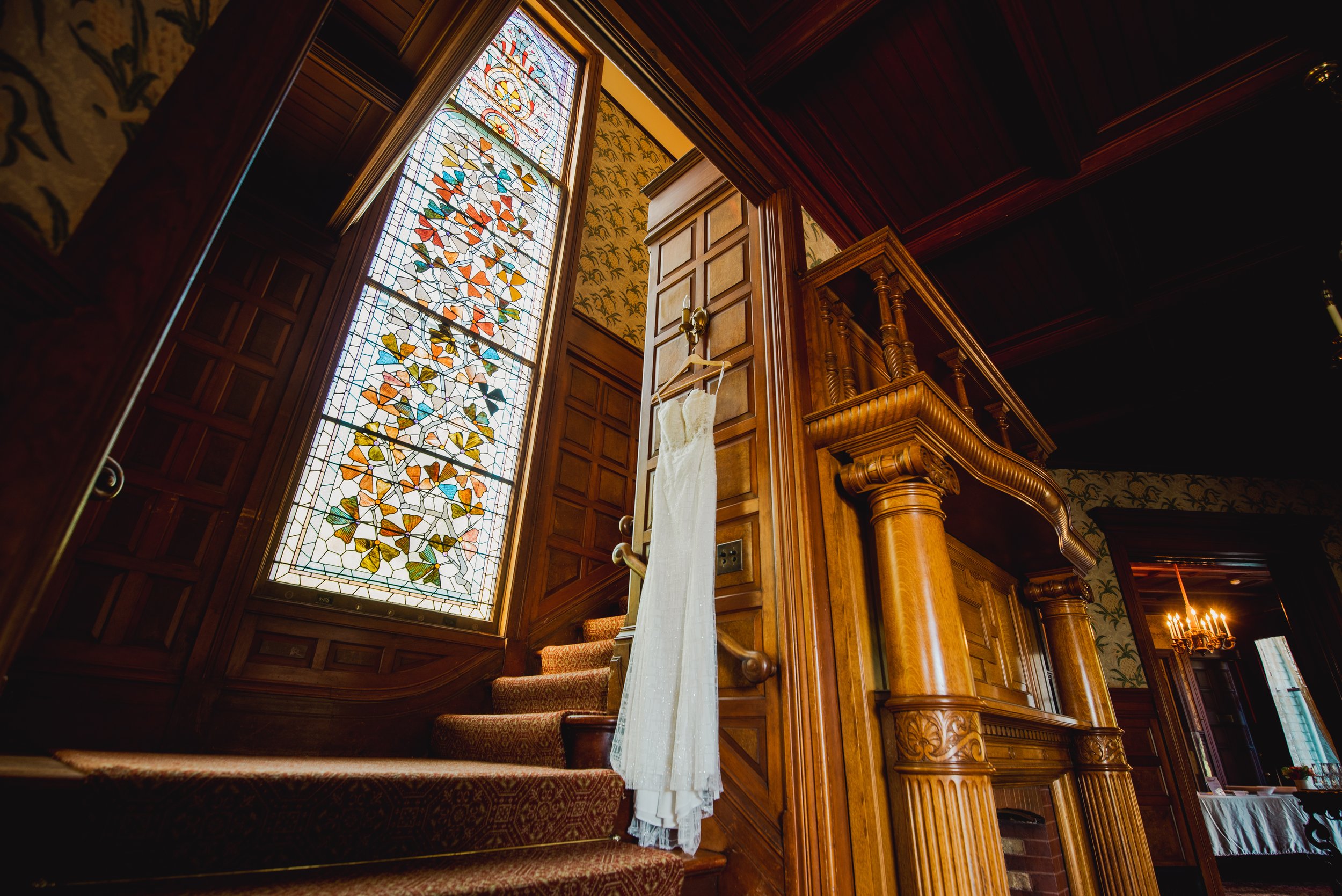
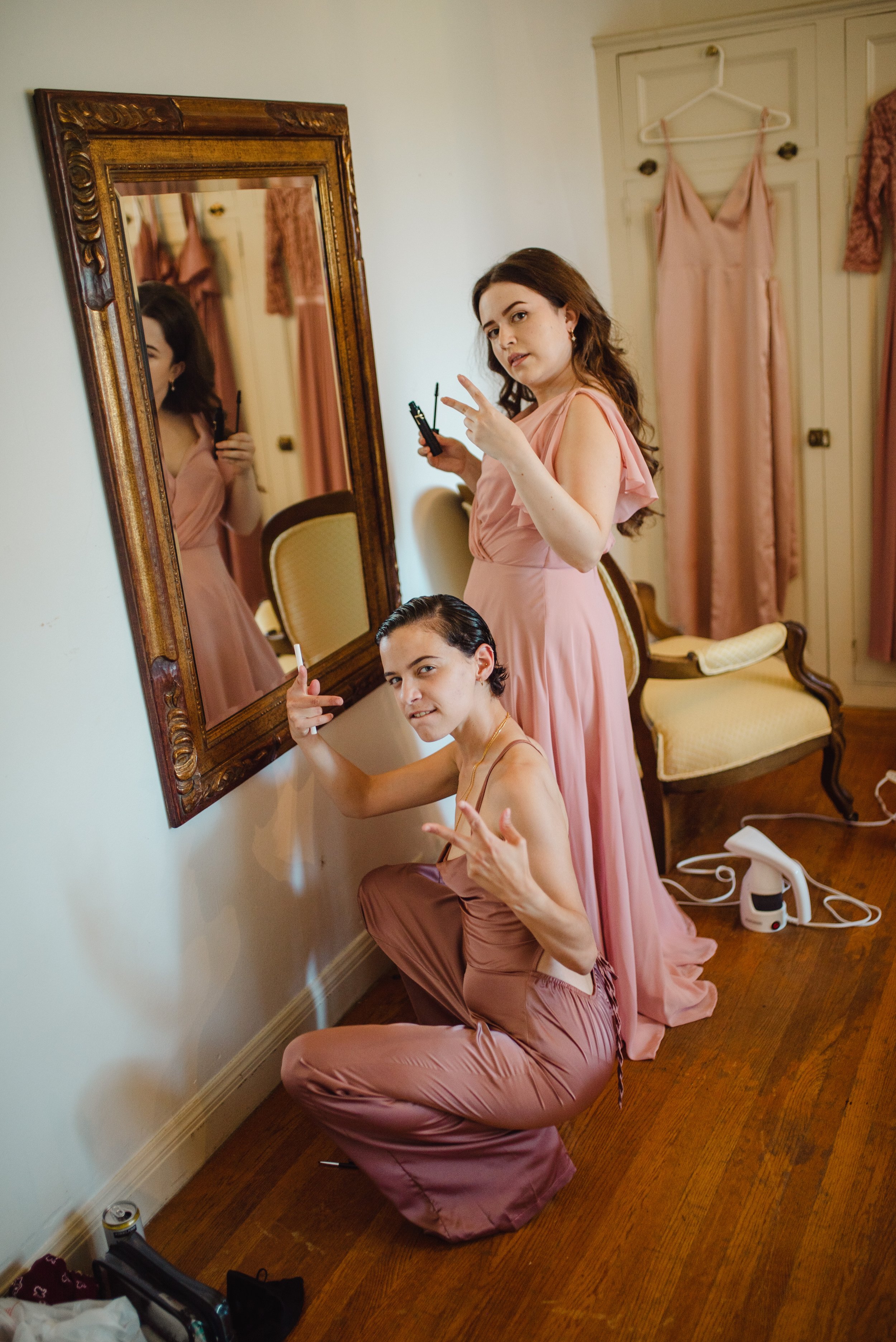
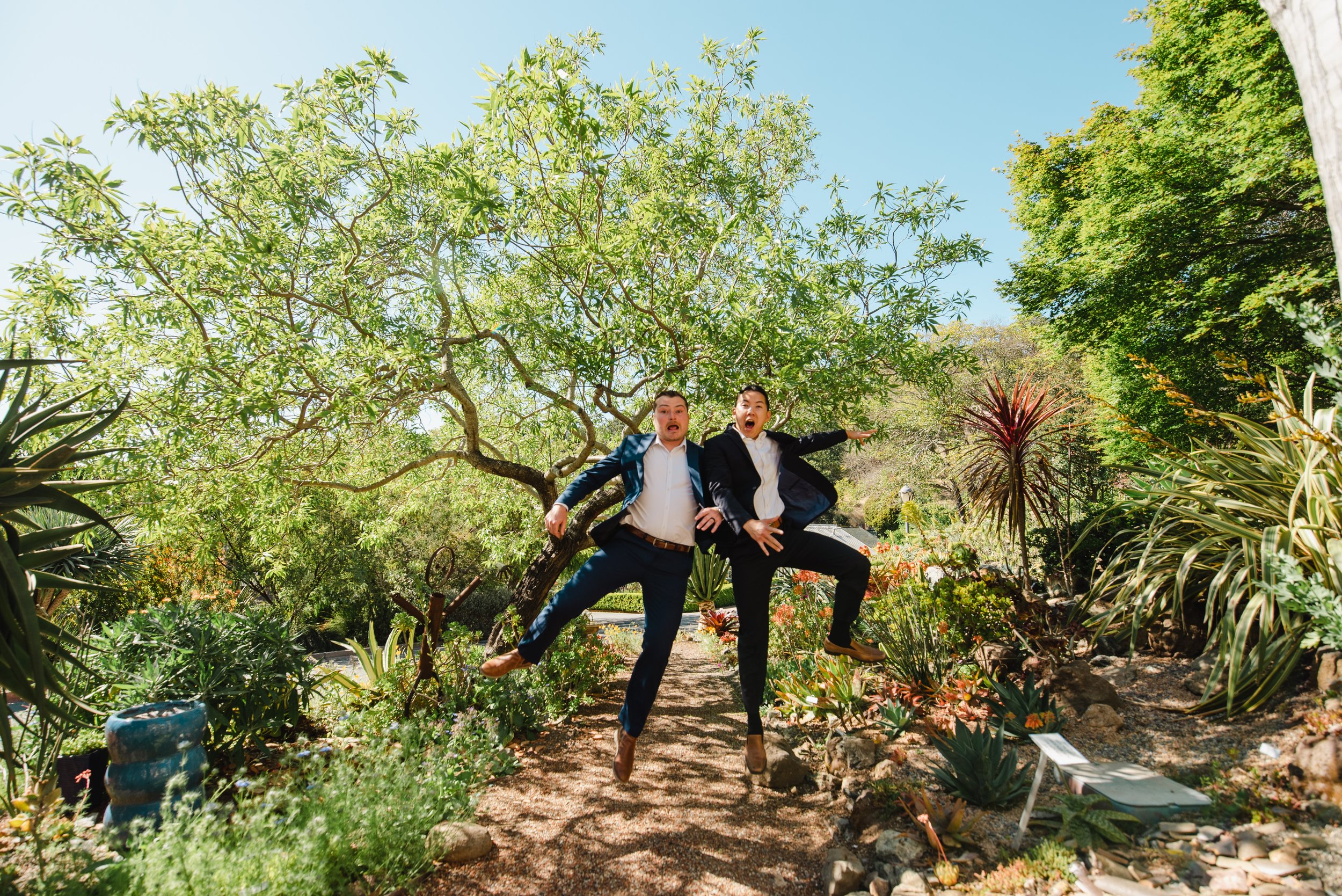
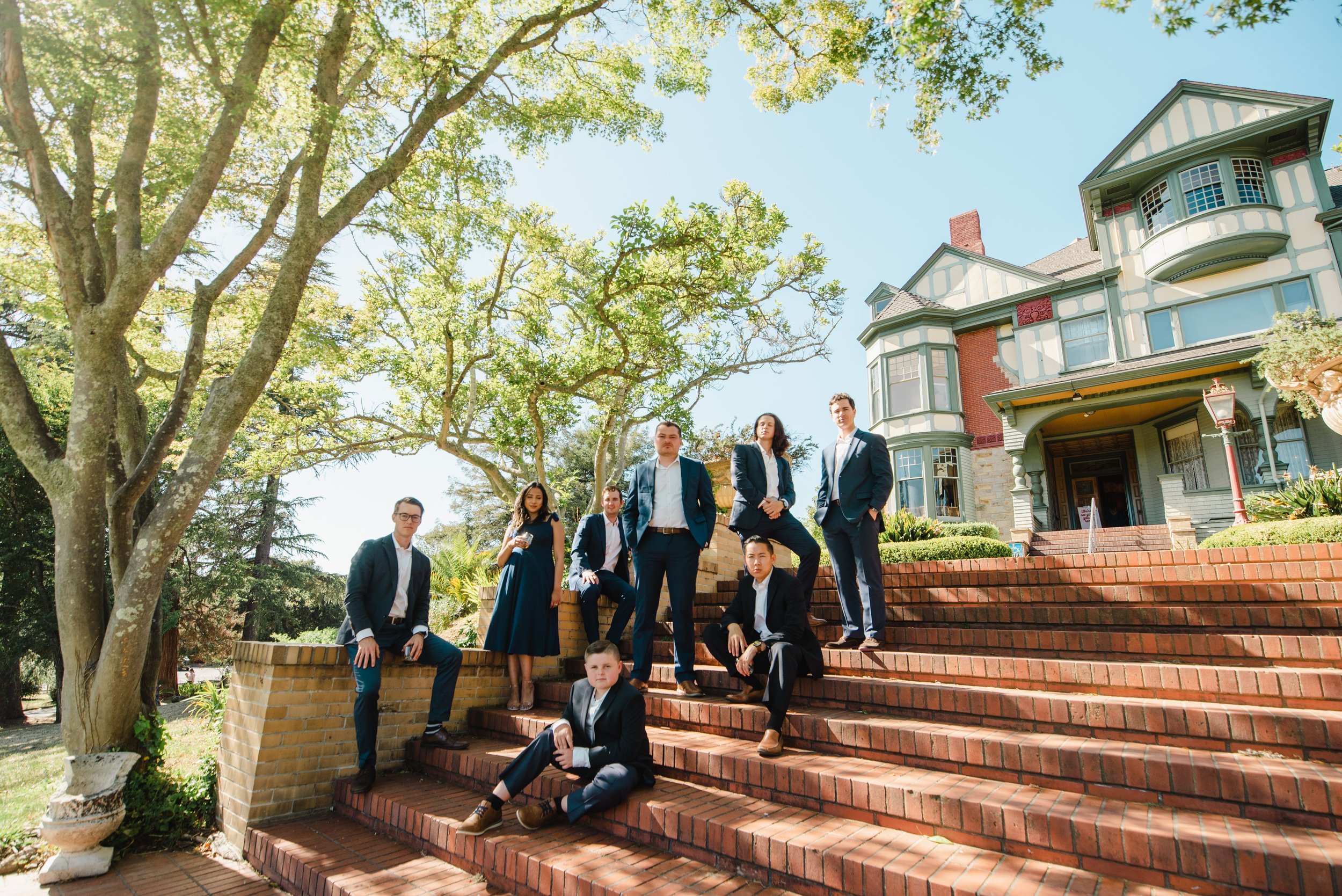
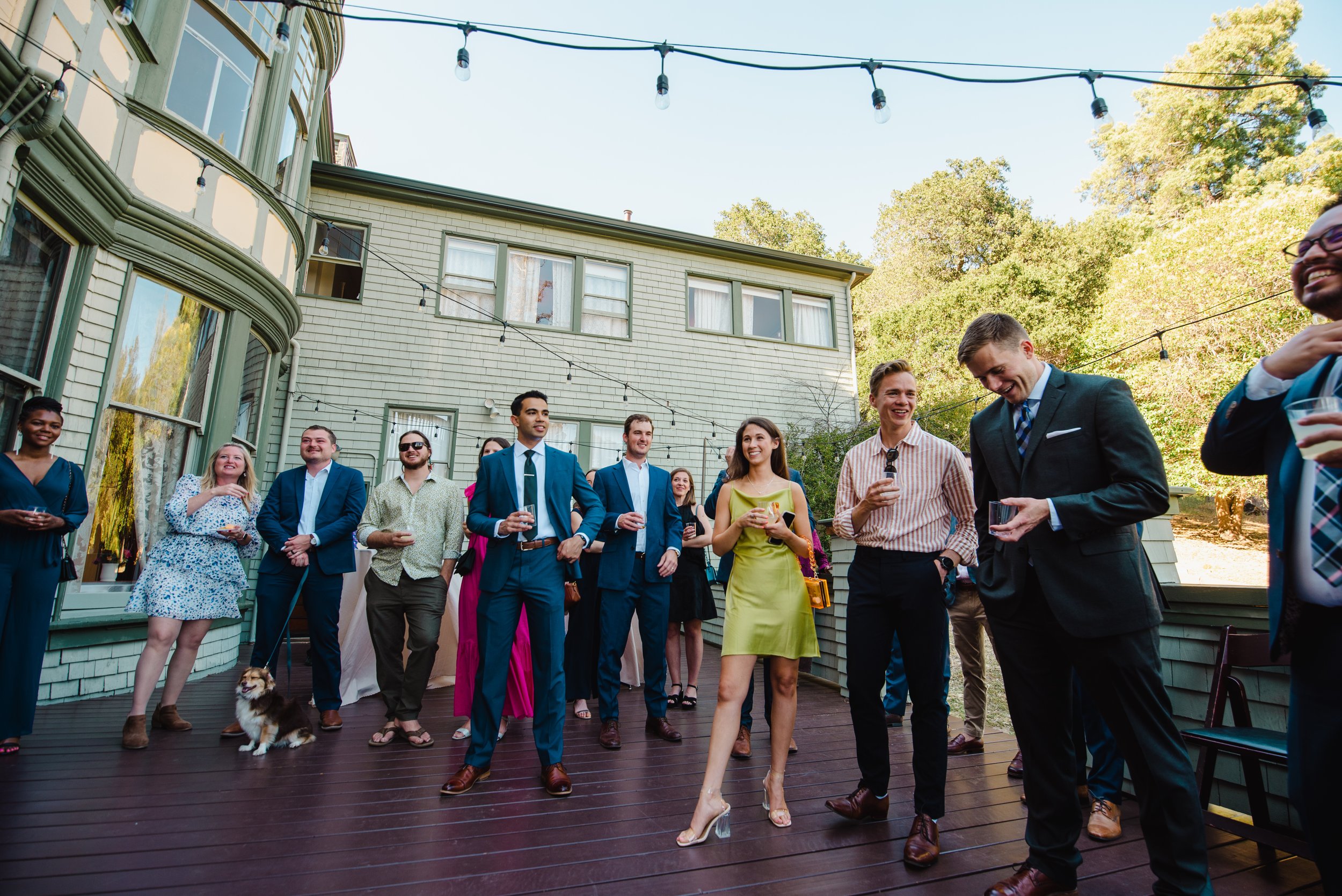
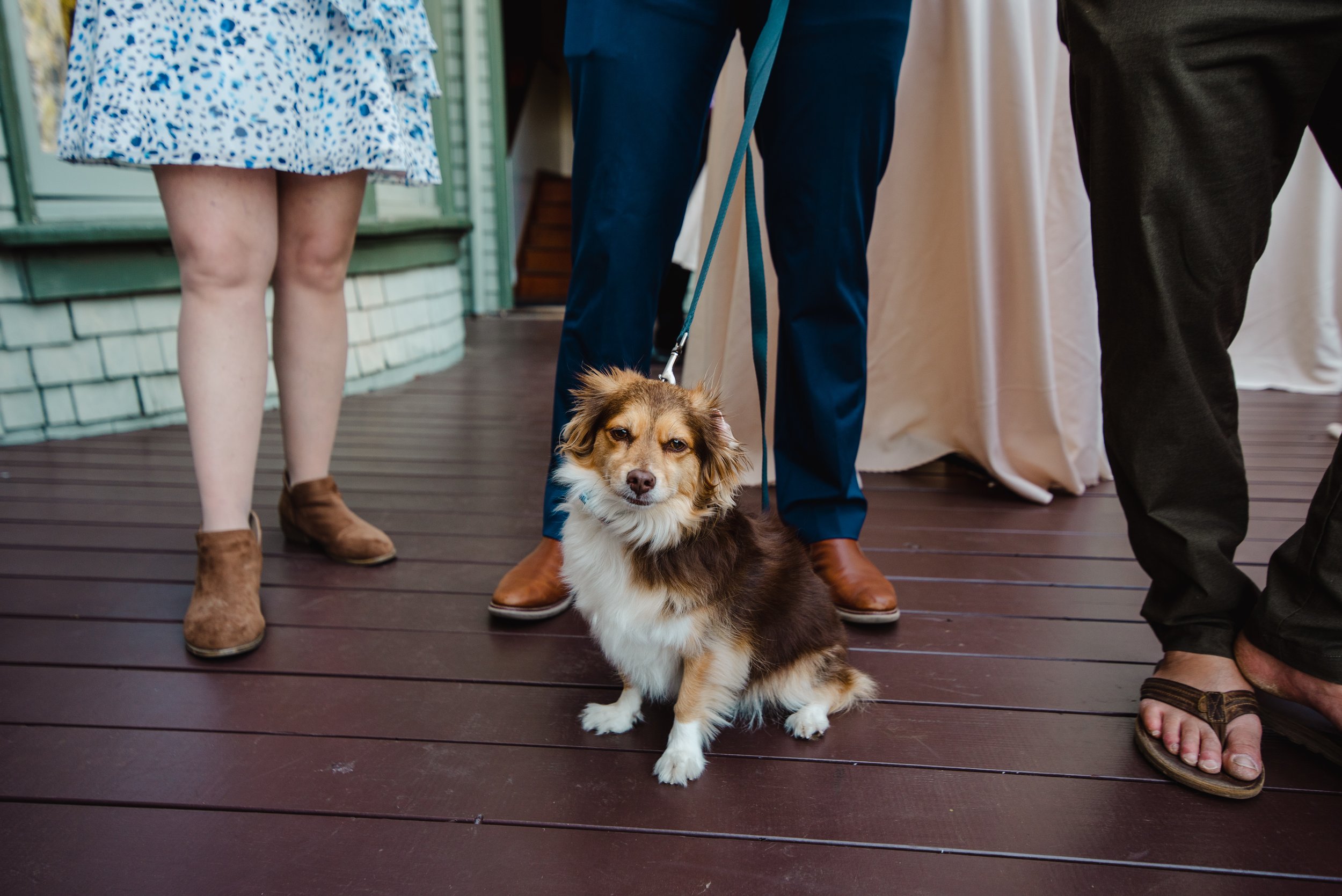
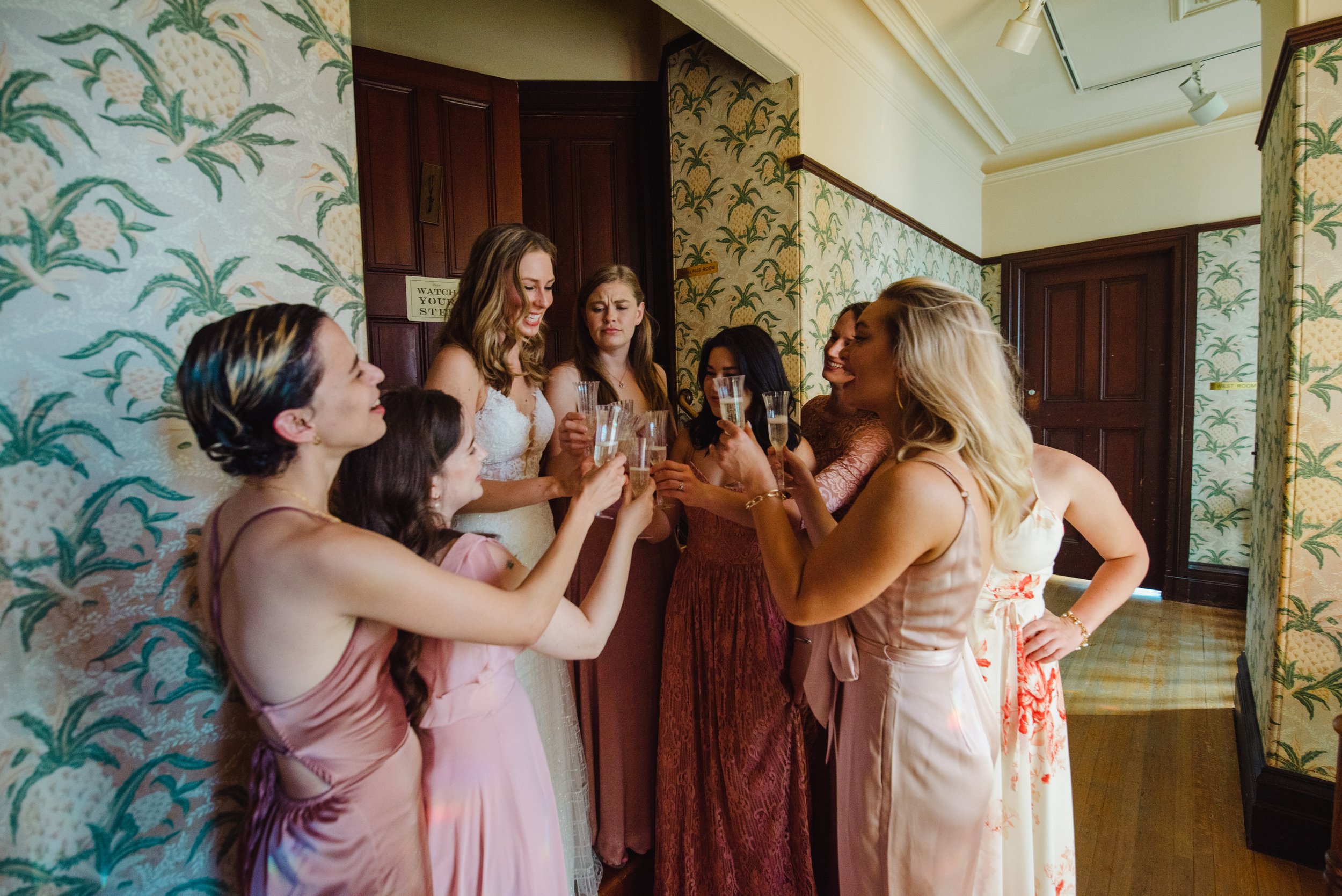
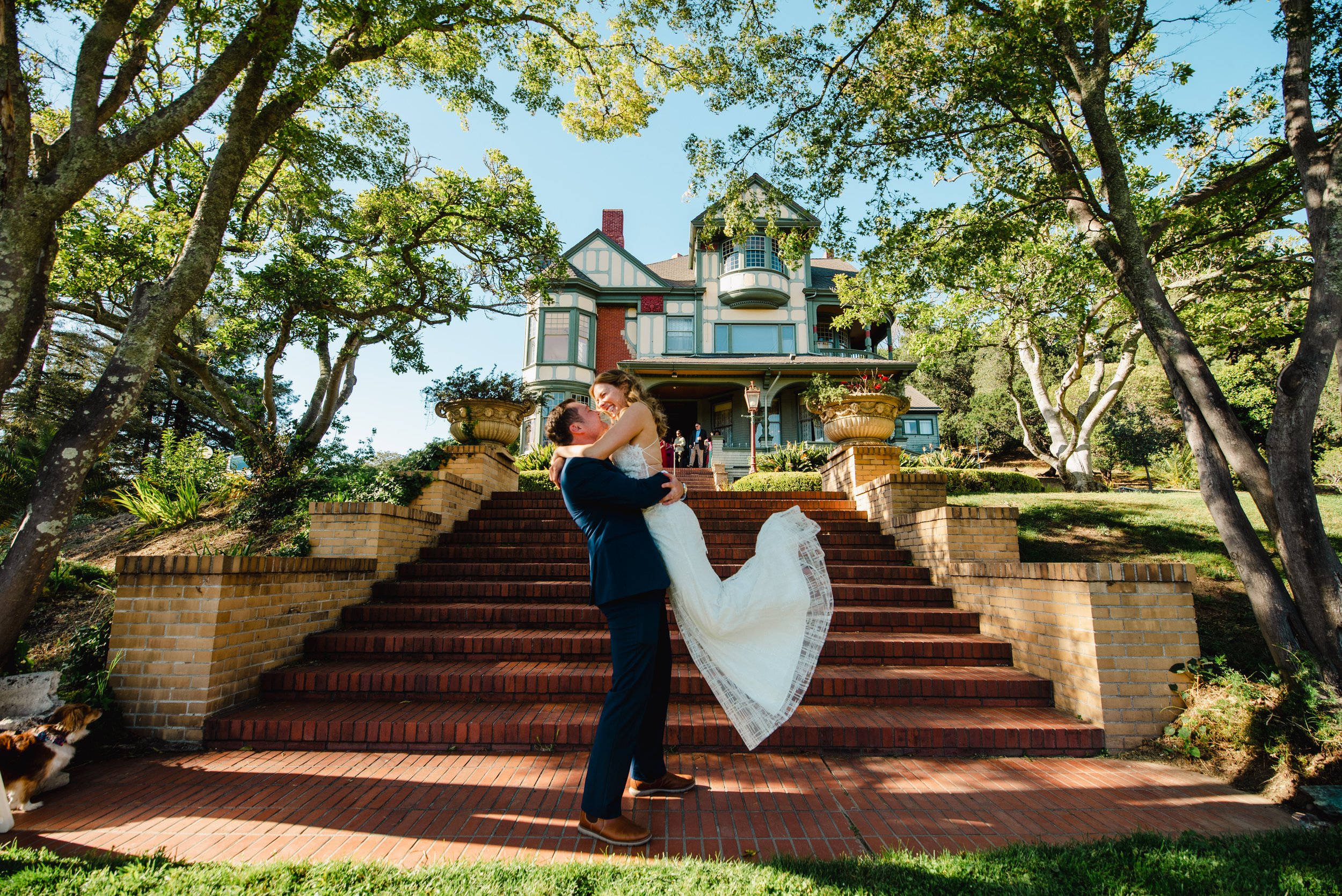
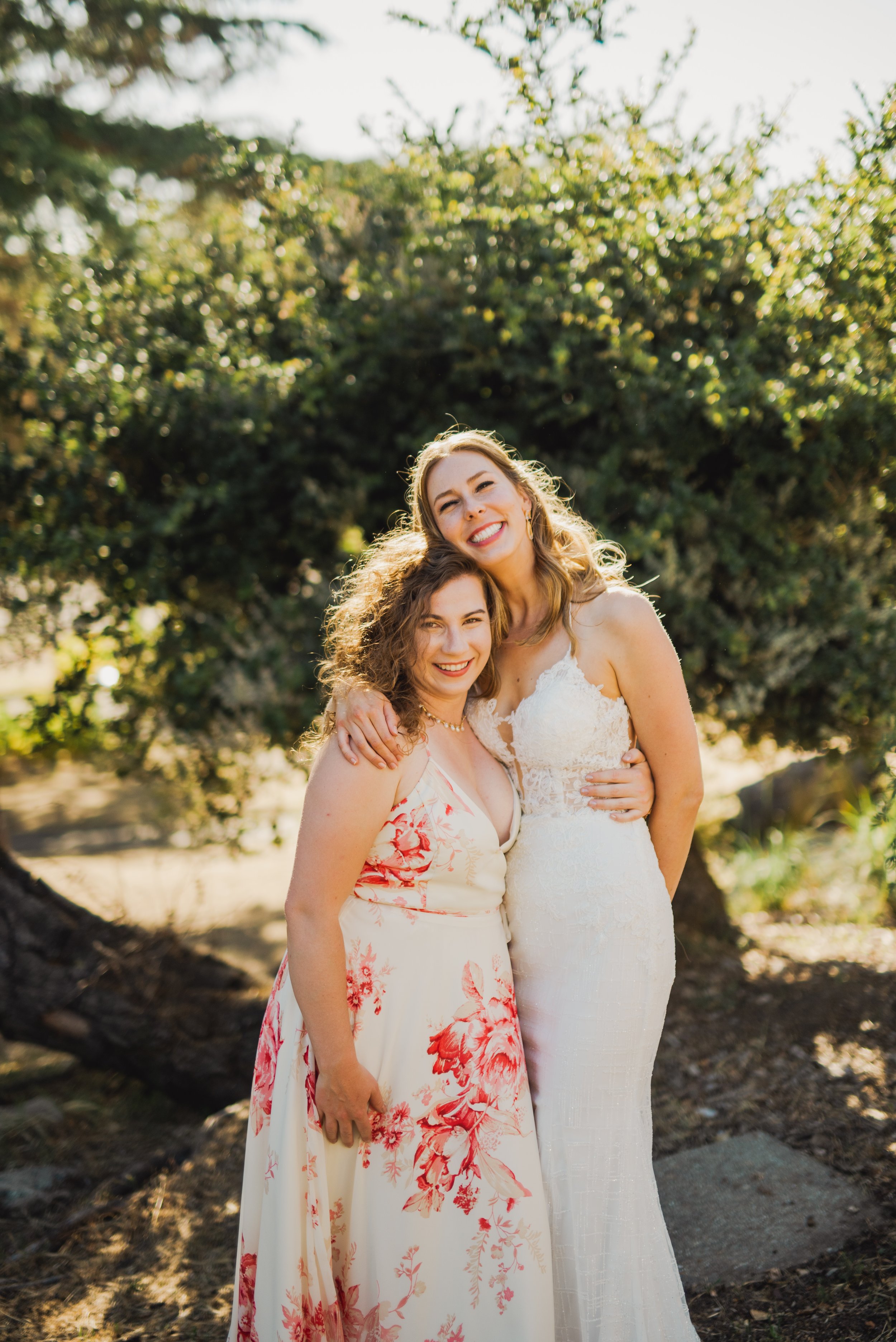
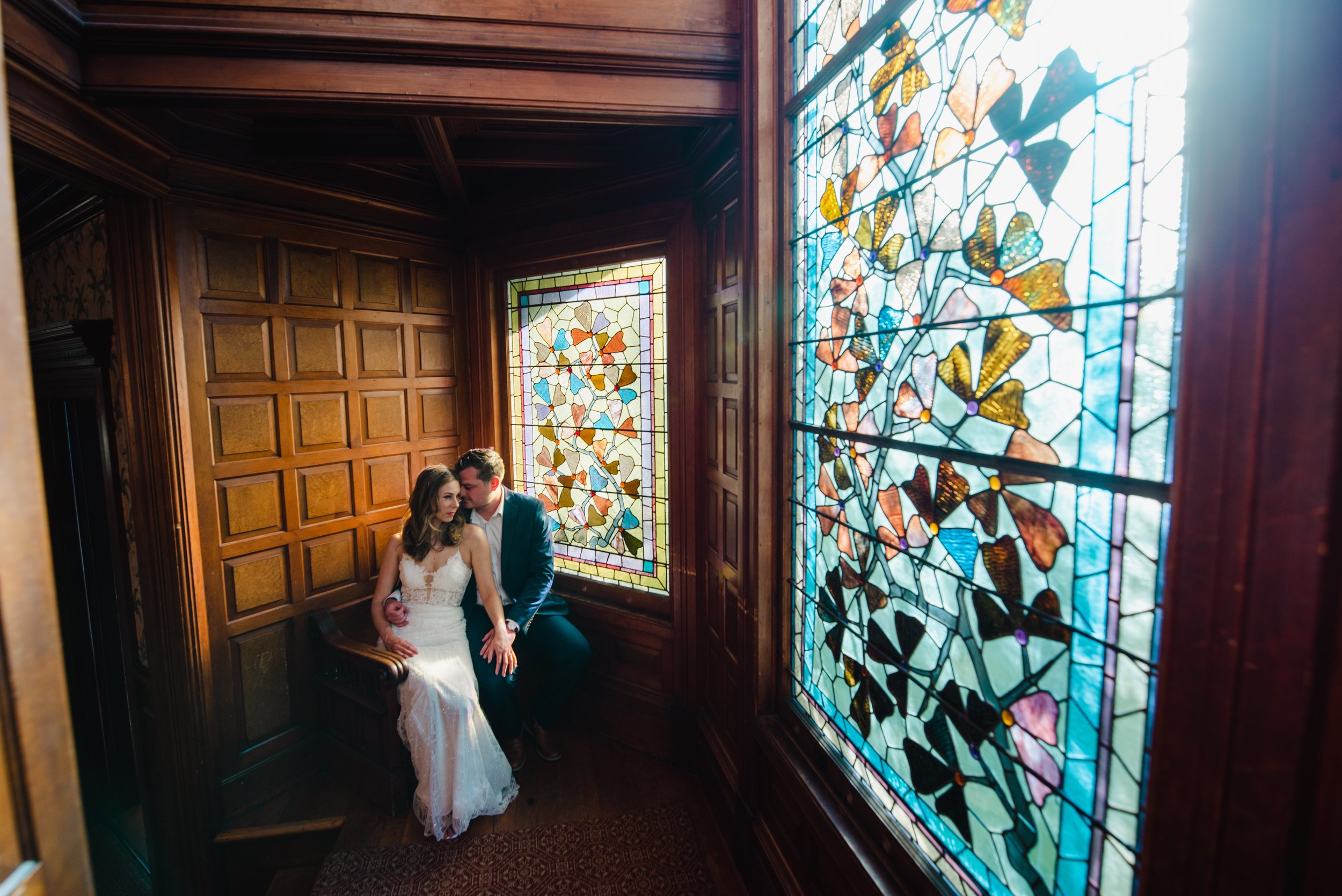
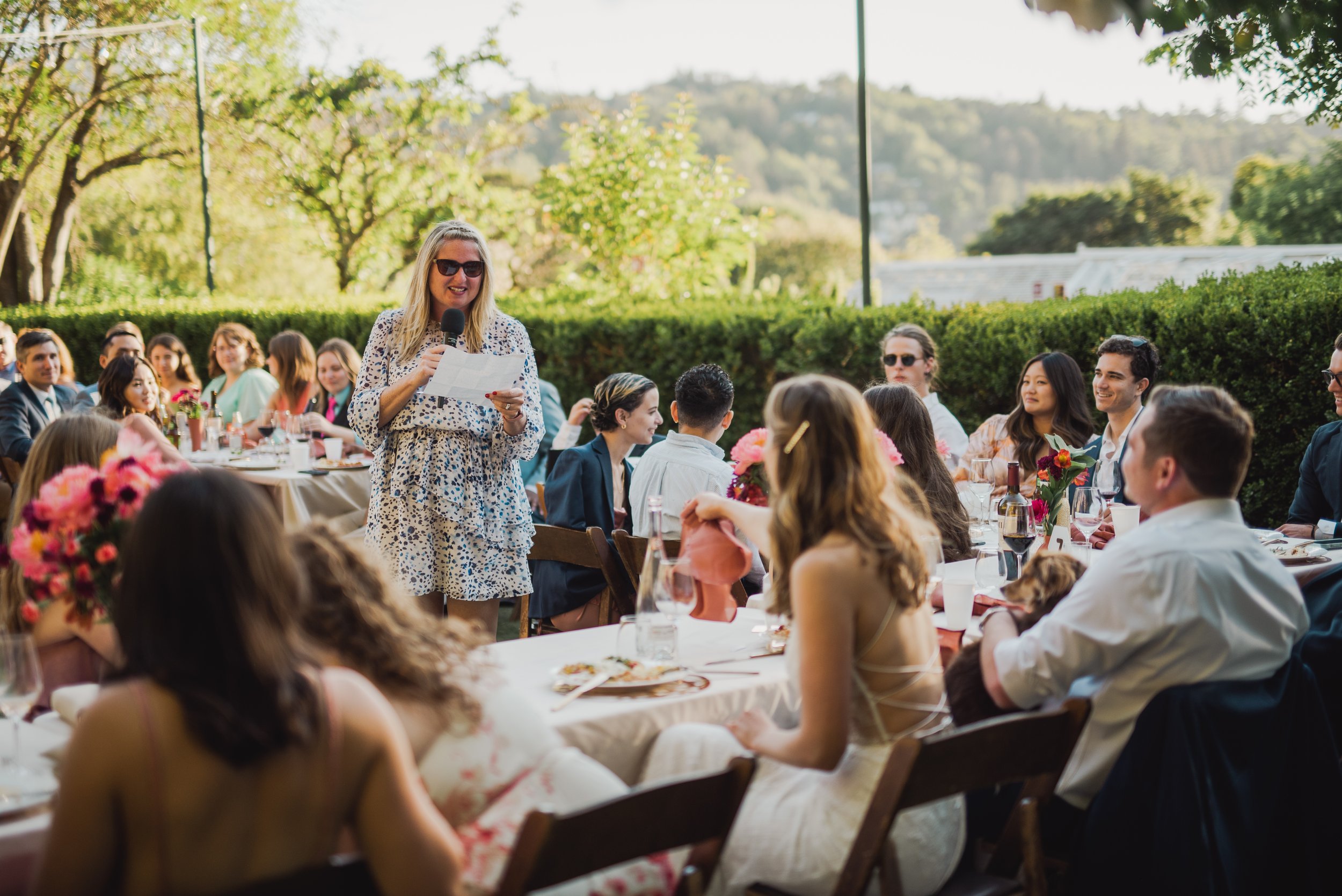
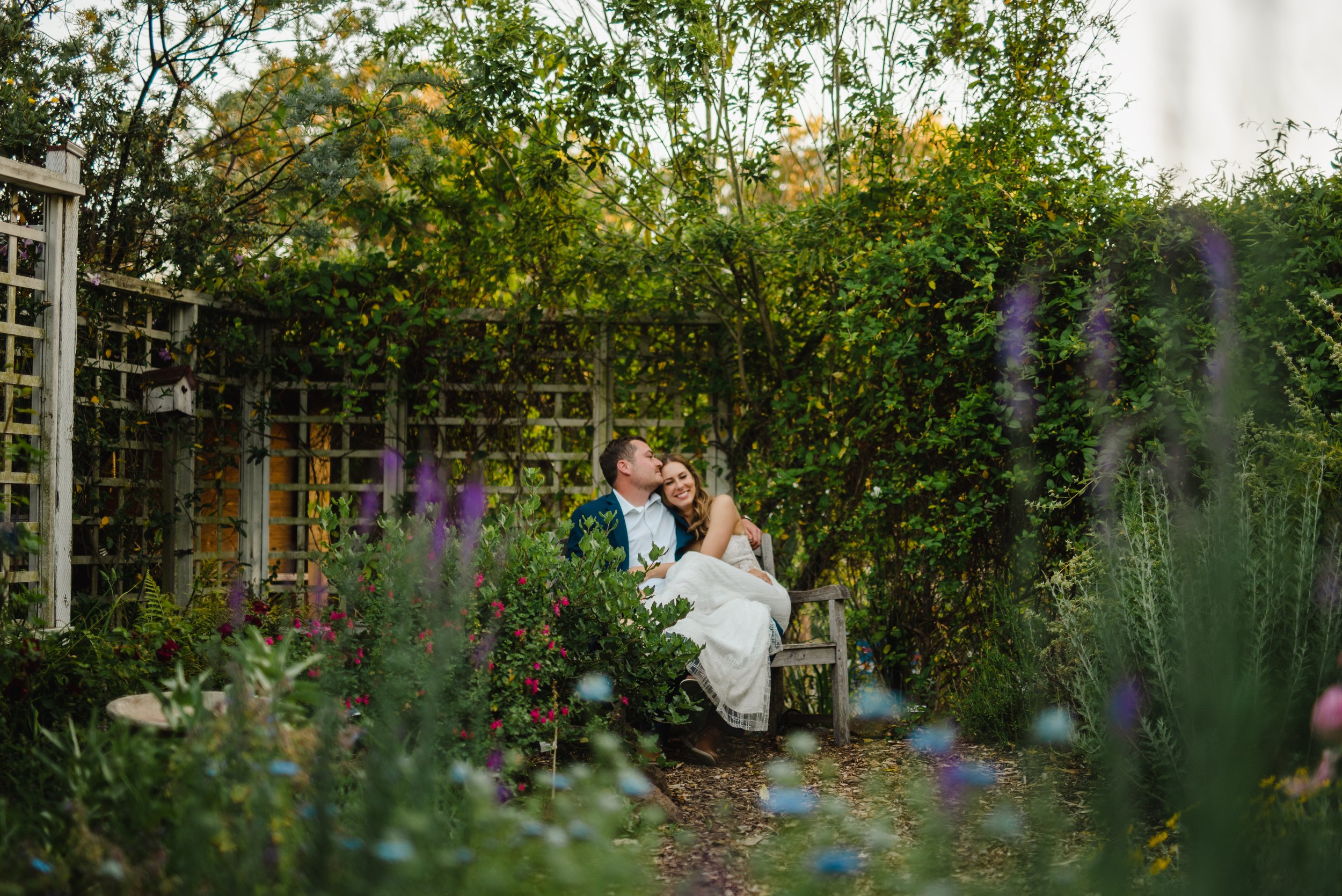
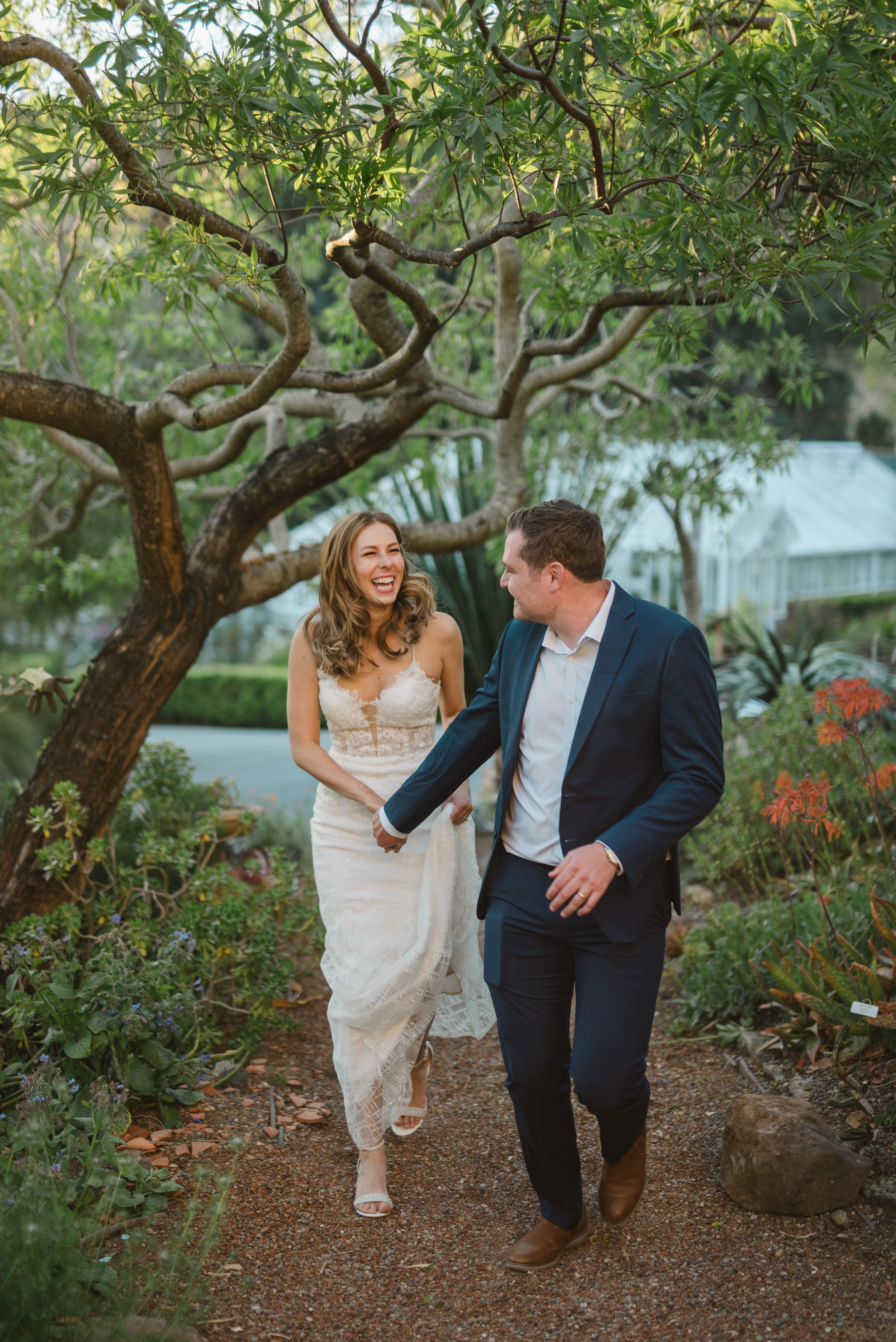
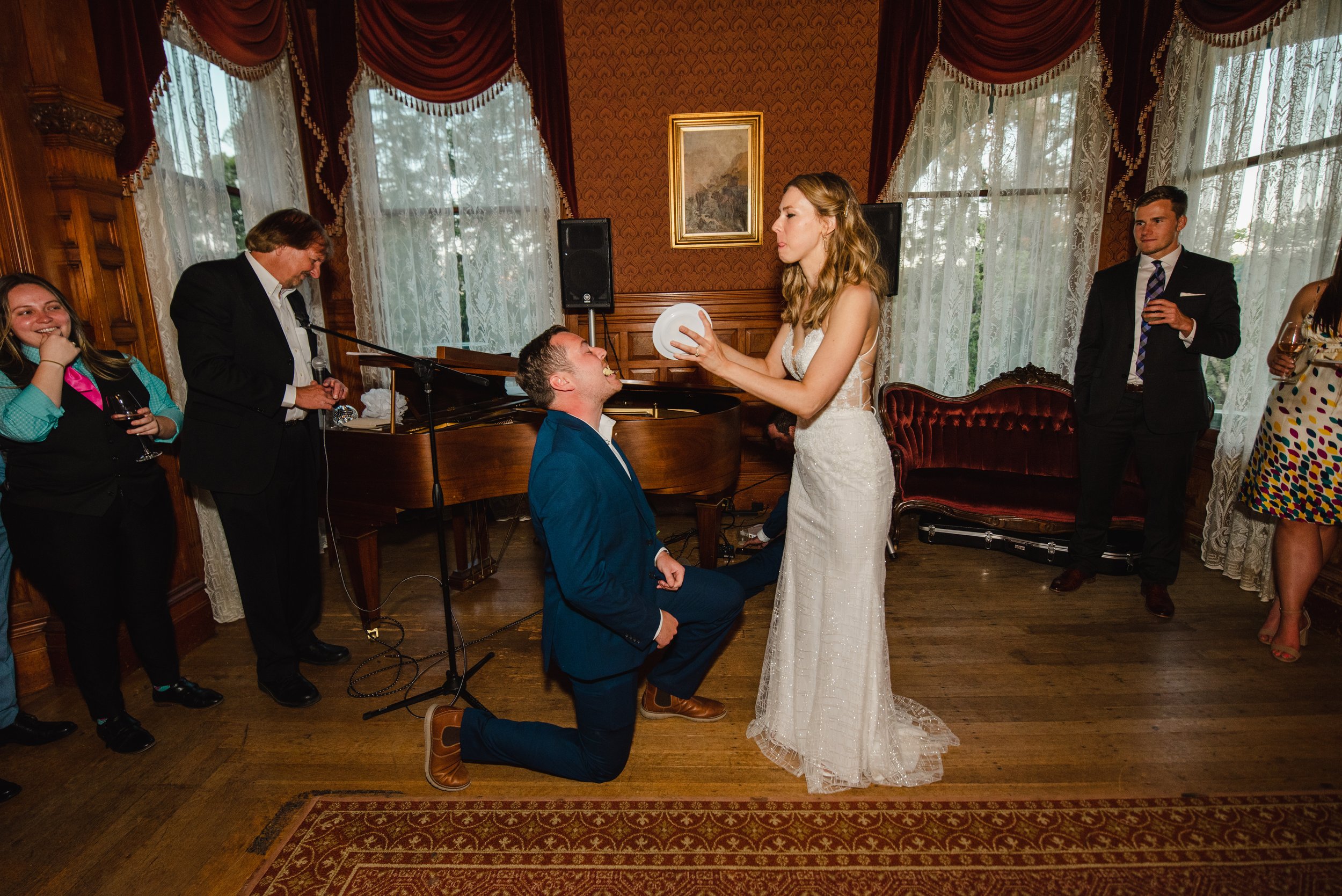
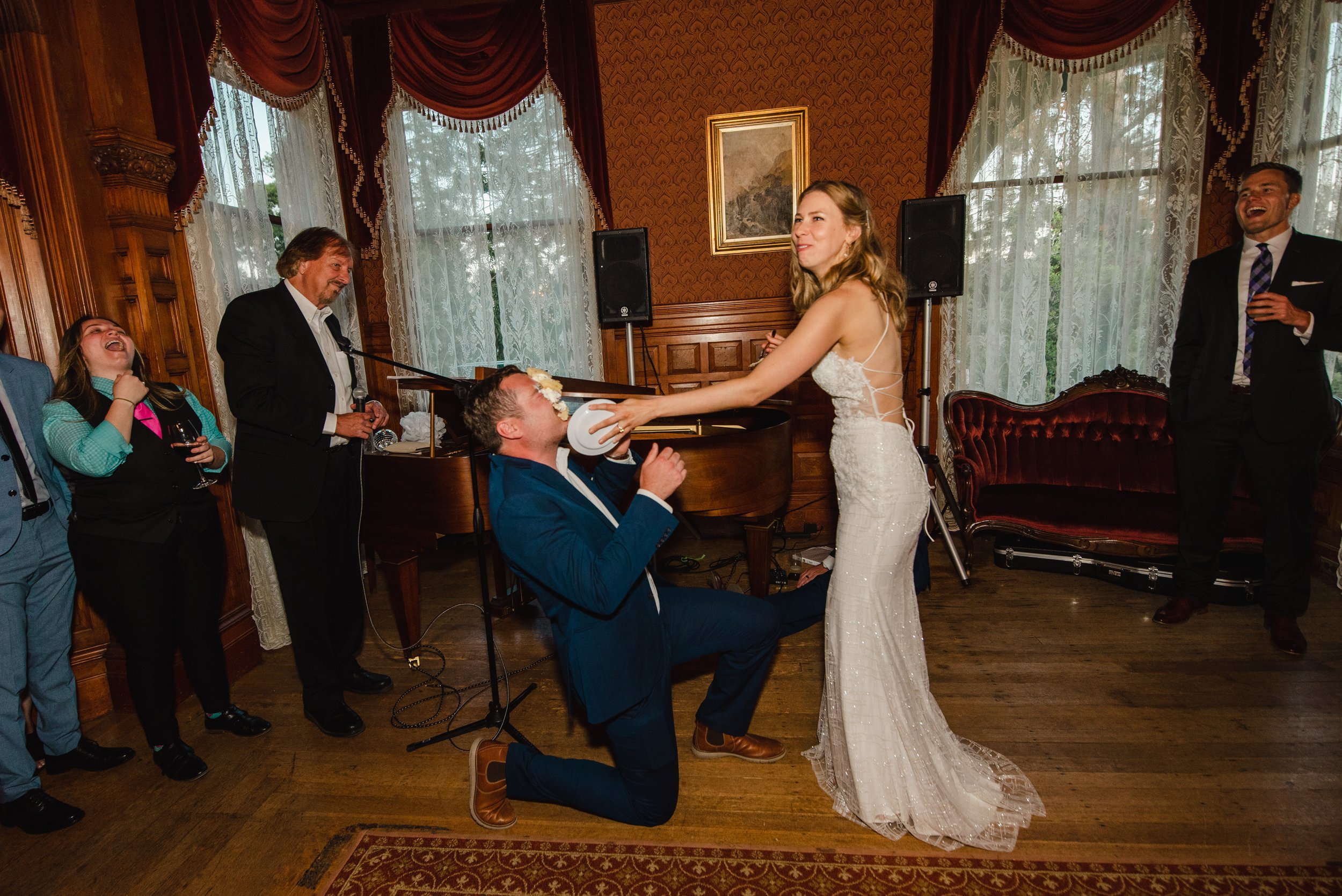
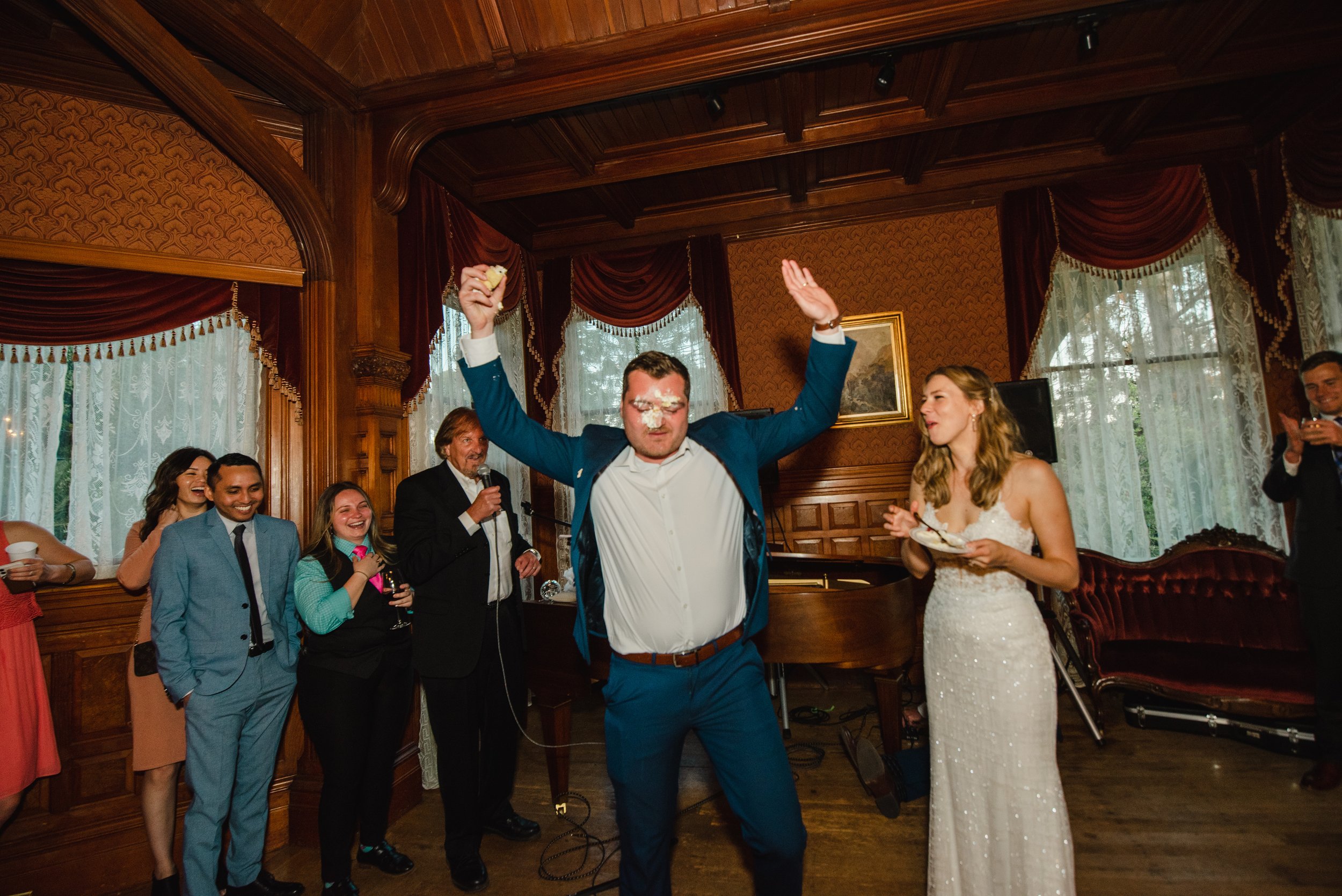
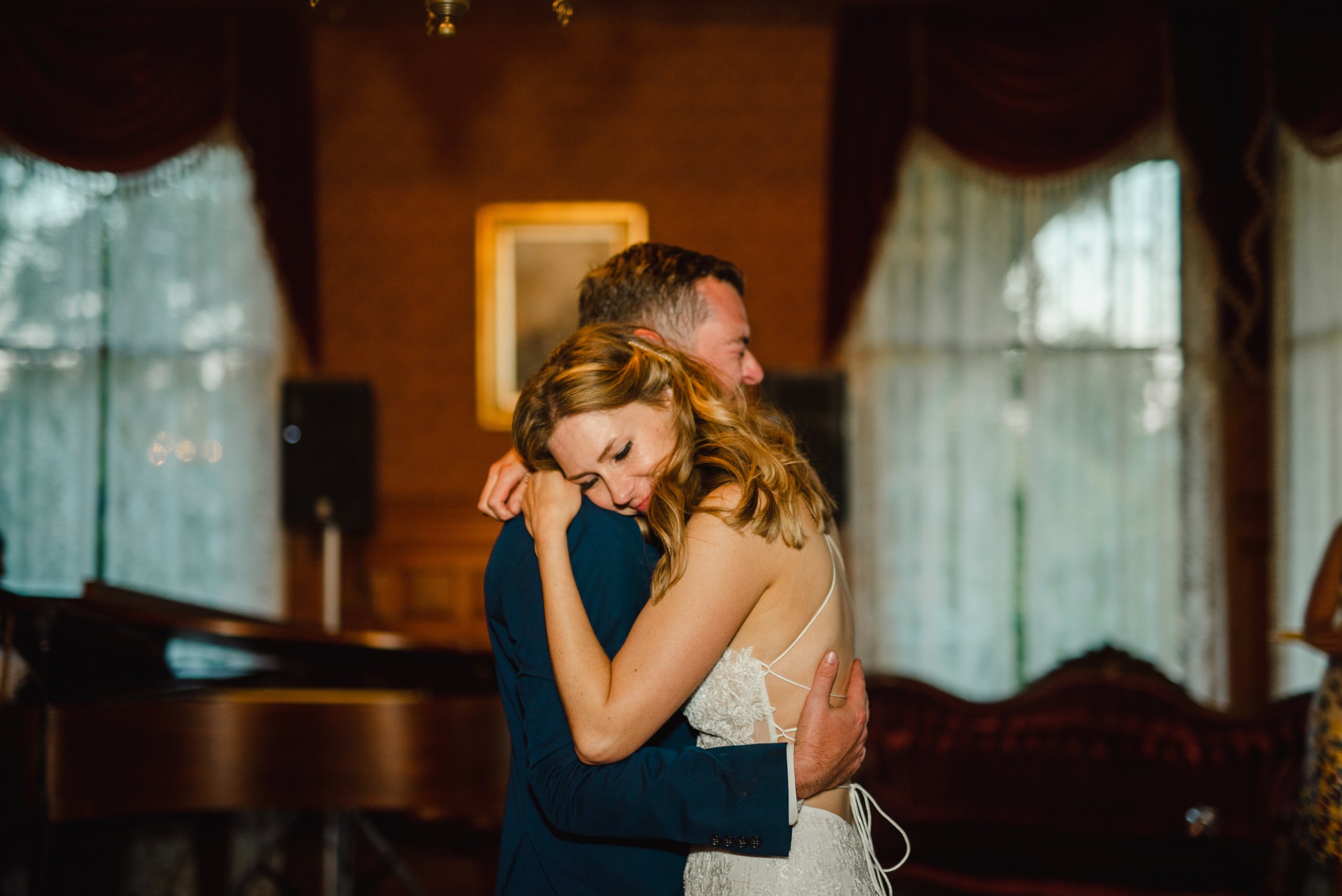
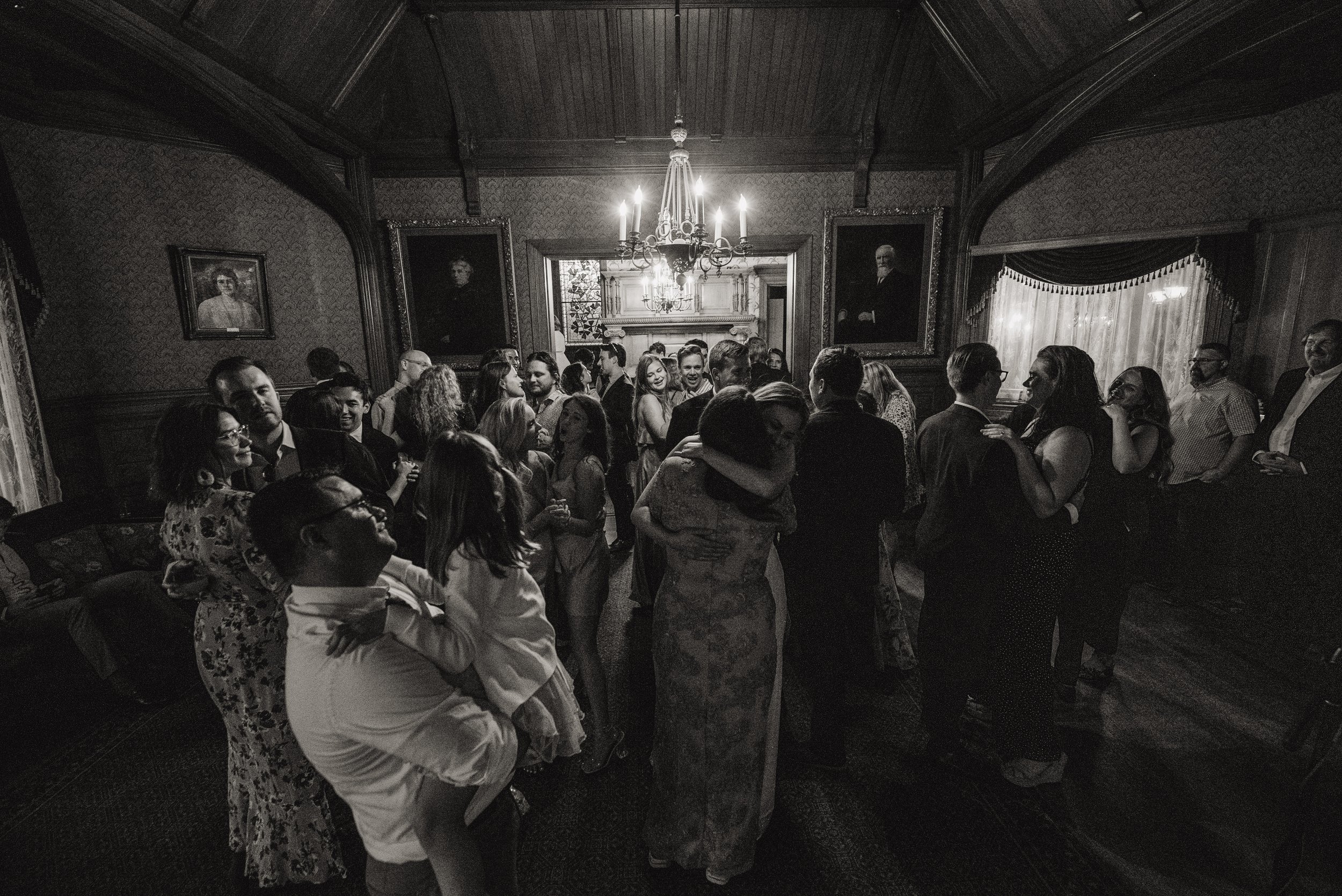
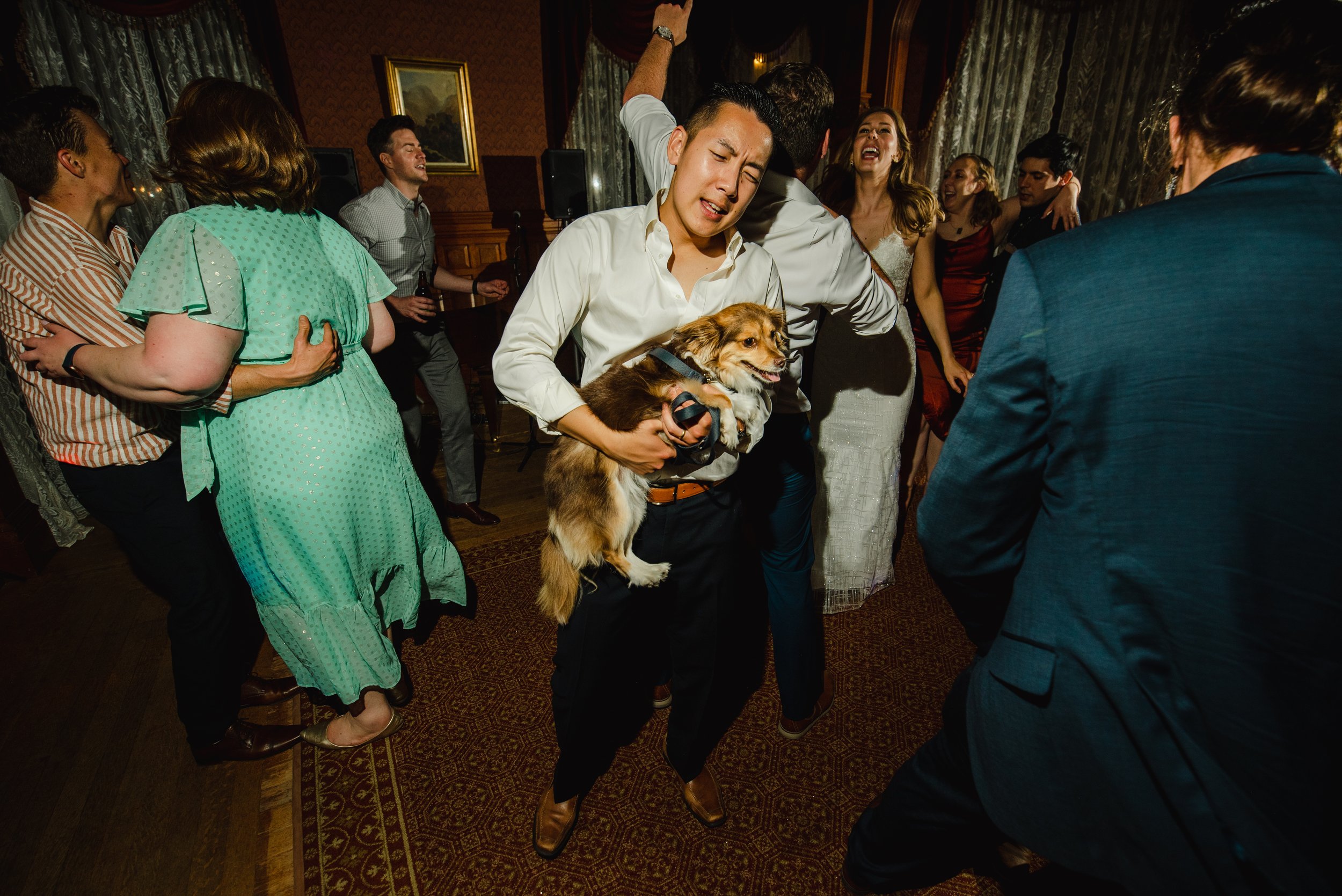
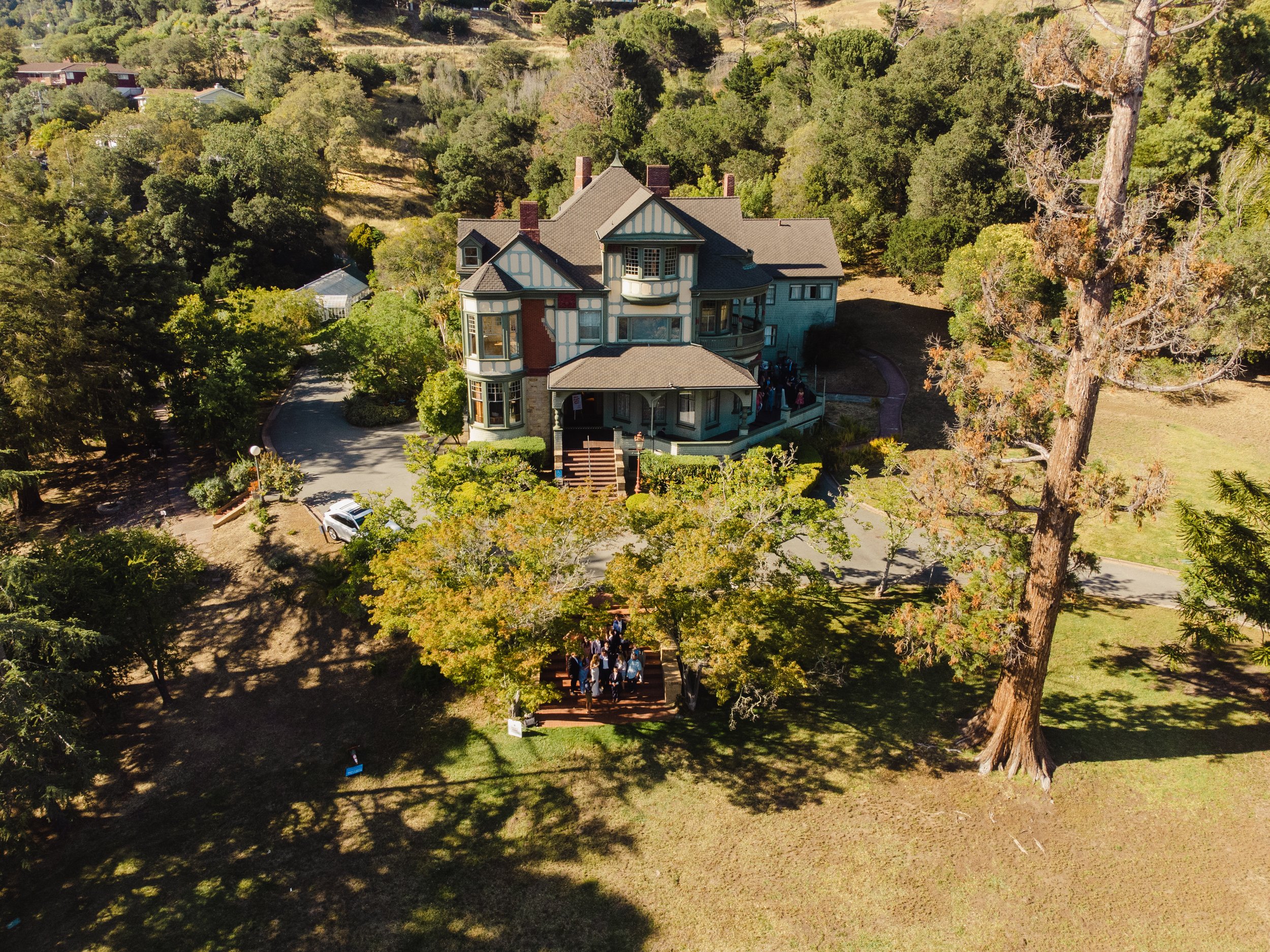
Photos from Kim and Cody’s 1-year wedding reception
But towards the end of dinner, they did remind their guests why, aside from wanting to host a fun party, they’d gathered them, by re-reciting their vows. They read from the original copies (Cody’s typed, bulleted notes, Kim’s hand-written ones) and their words were the same. But everything else—the location, their audience, themselves, the world—was different from a year ago.
A year before, when they’d recited their vows on an oceanside gazebo overlooking the California coastline, Kim and Cody’s voices had filled with sentimentality and optimism. Their vows were a commitment to one another, but also one yet untested by what the reality of married life might hold.
Now, their words still carried sentimentality and optimism. But they also carried a sense of clear-eyed pragmatism, laughing acknowledgement of where they had succeeded (Kim has convinced Cody to use compostable bags) and failed (“I still haven’t read a book yet.”)
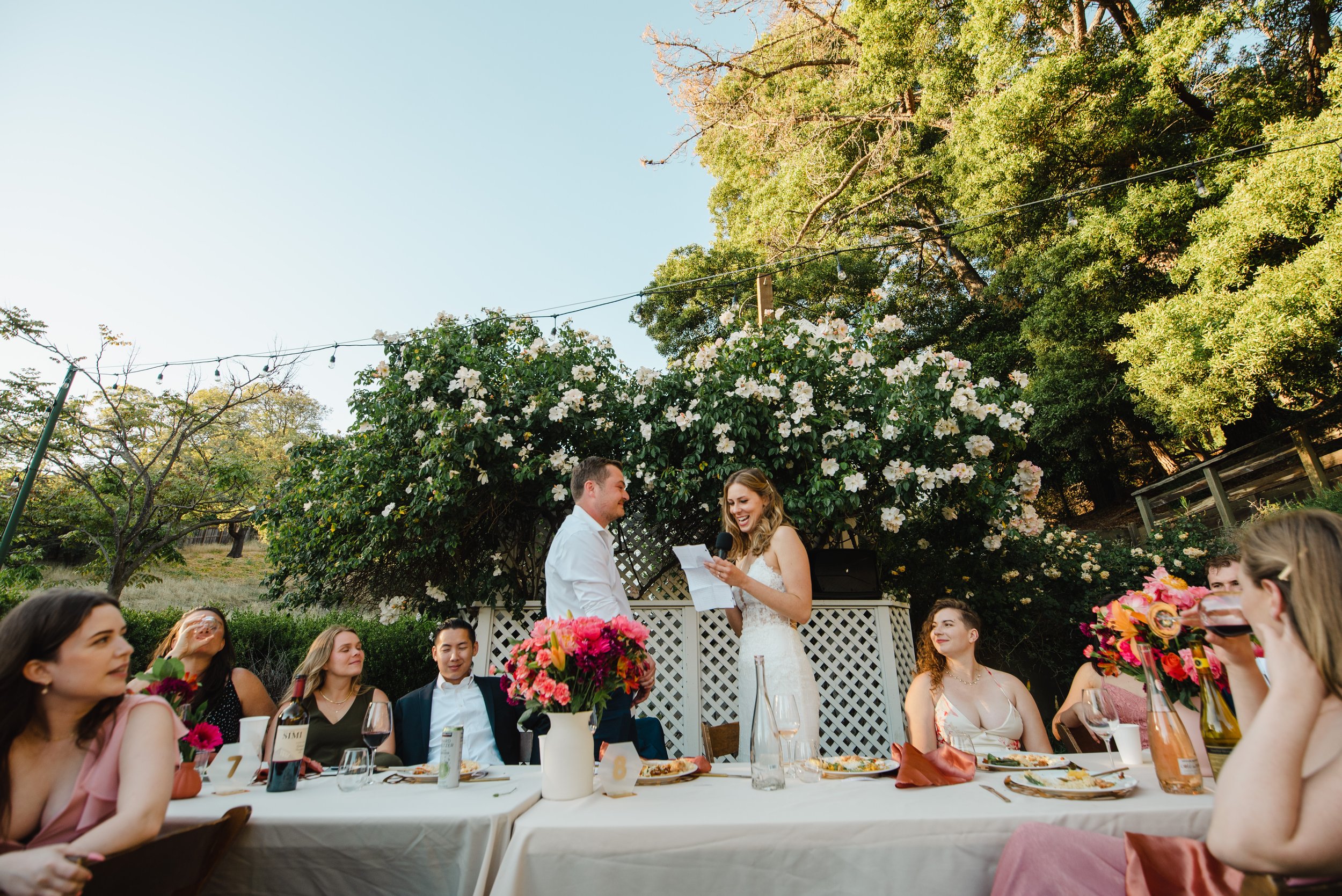
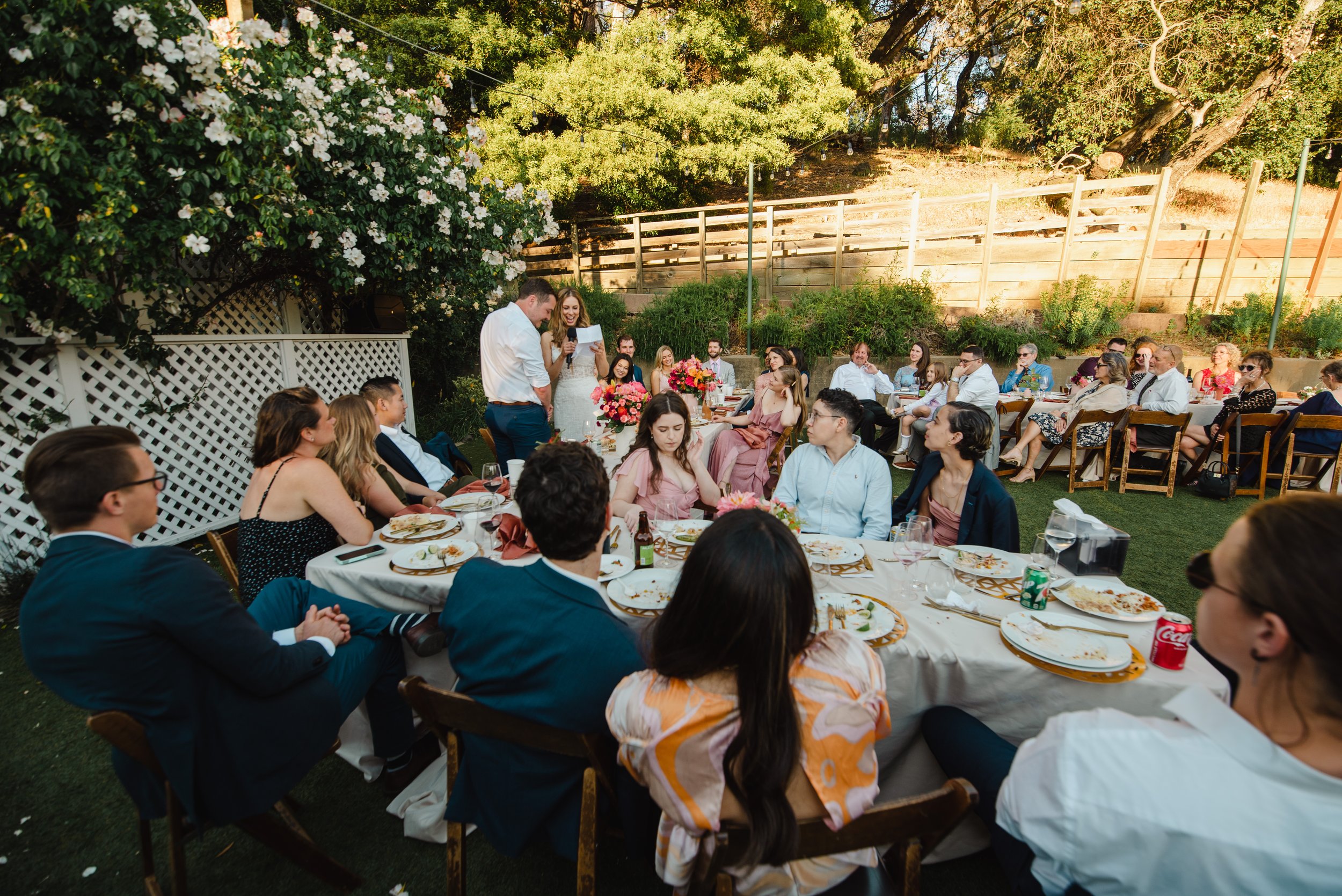
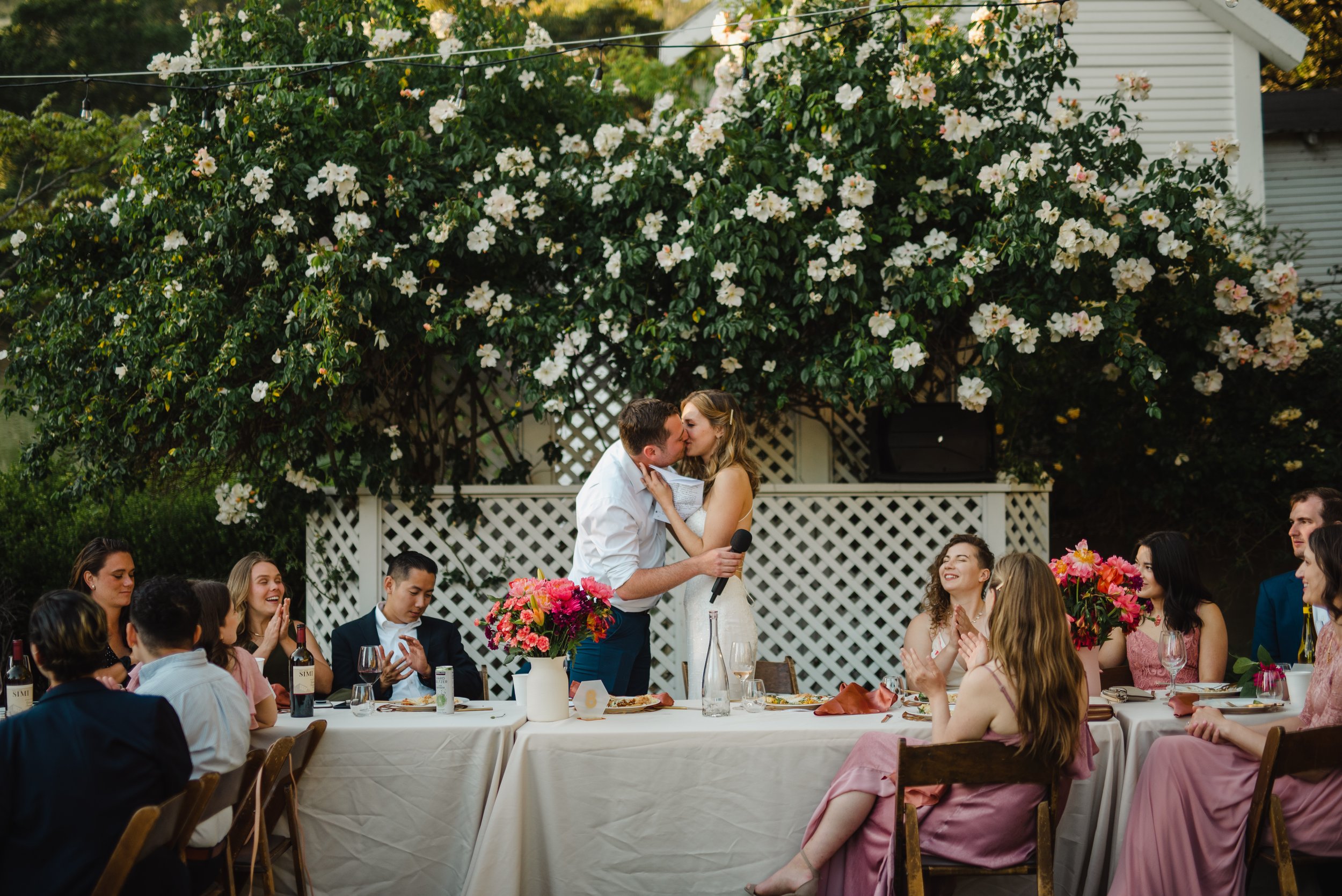
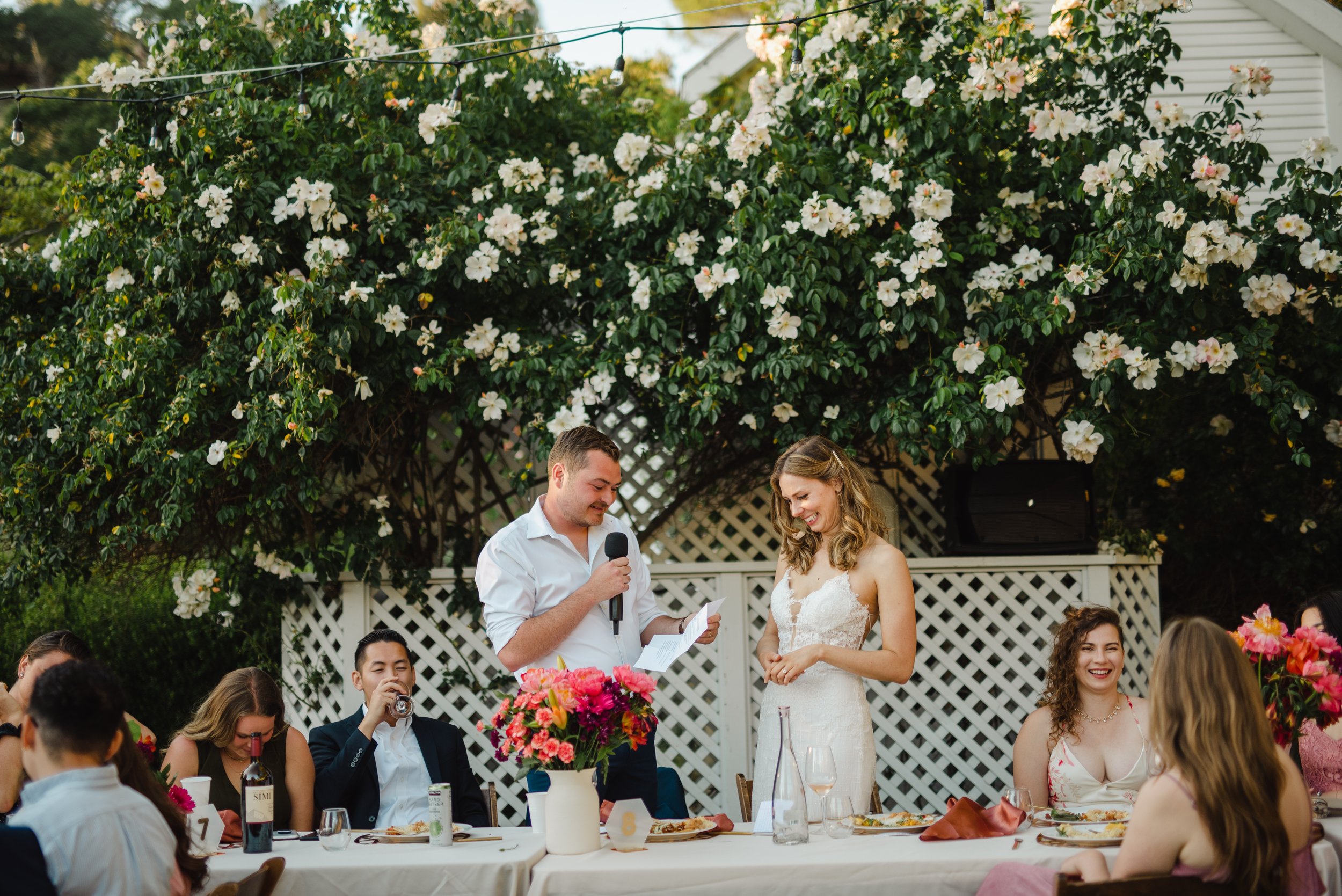
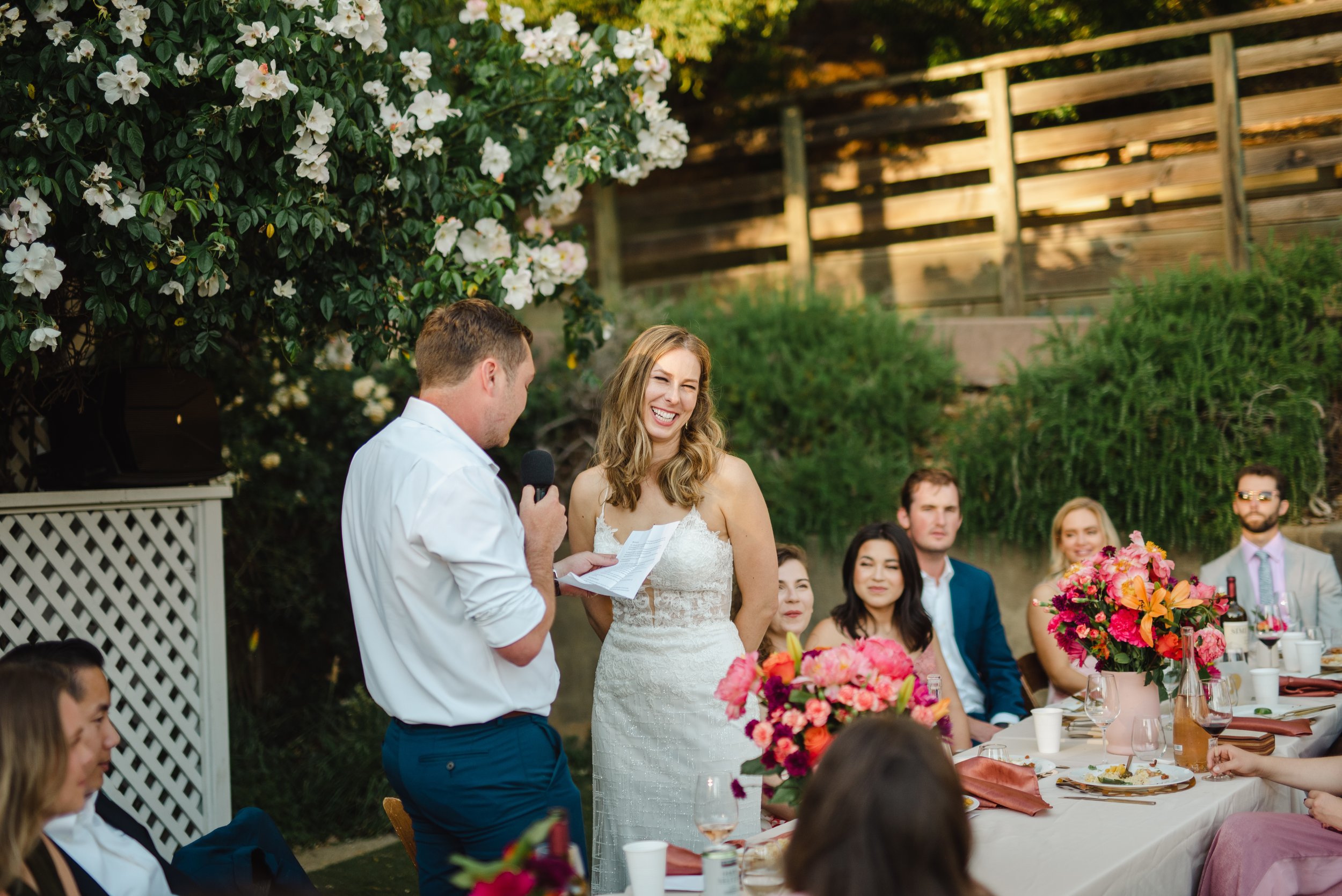
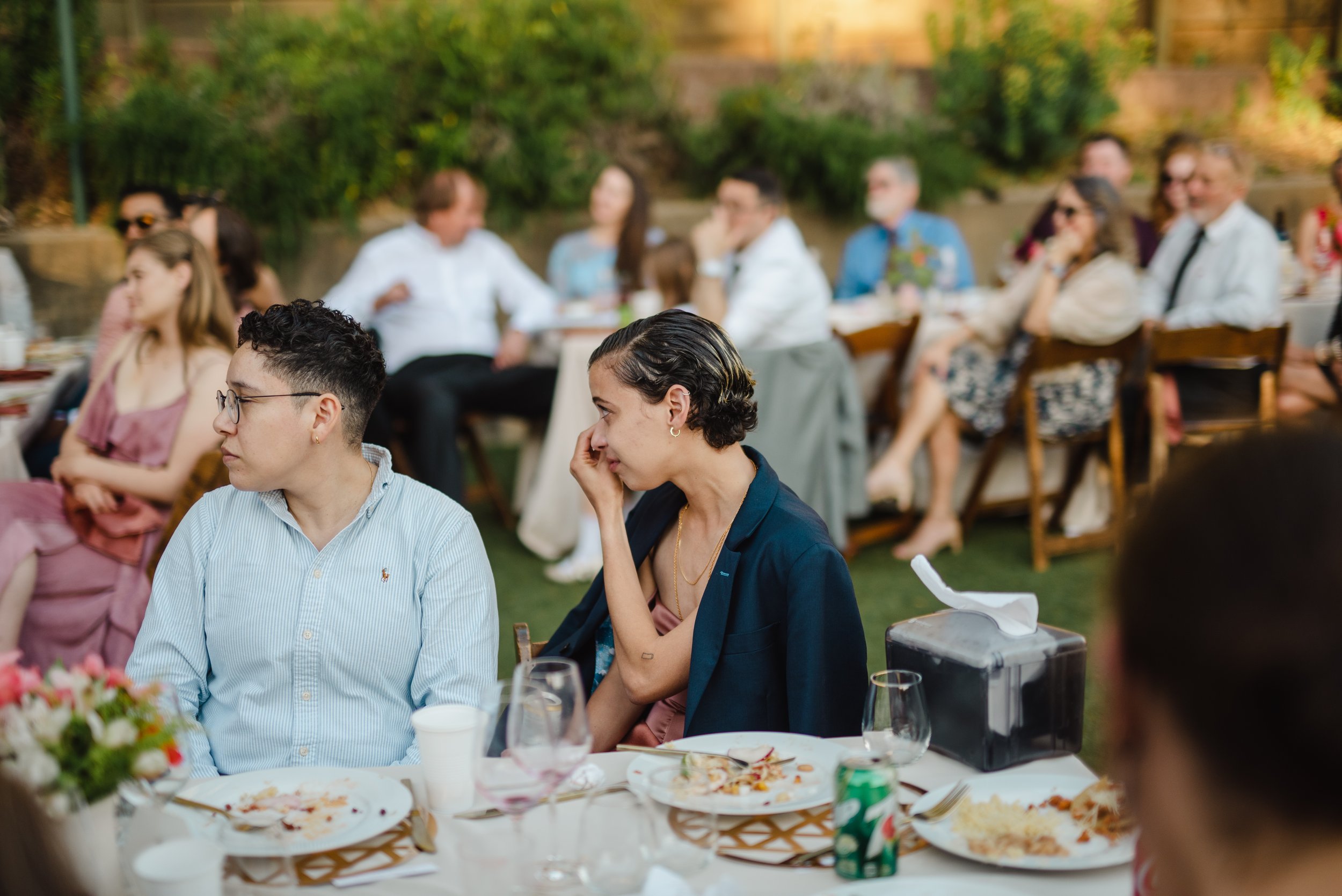
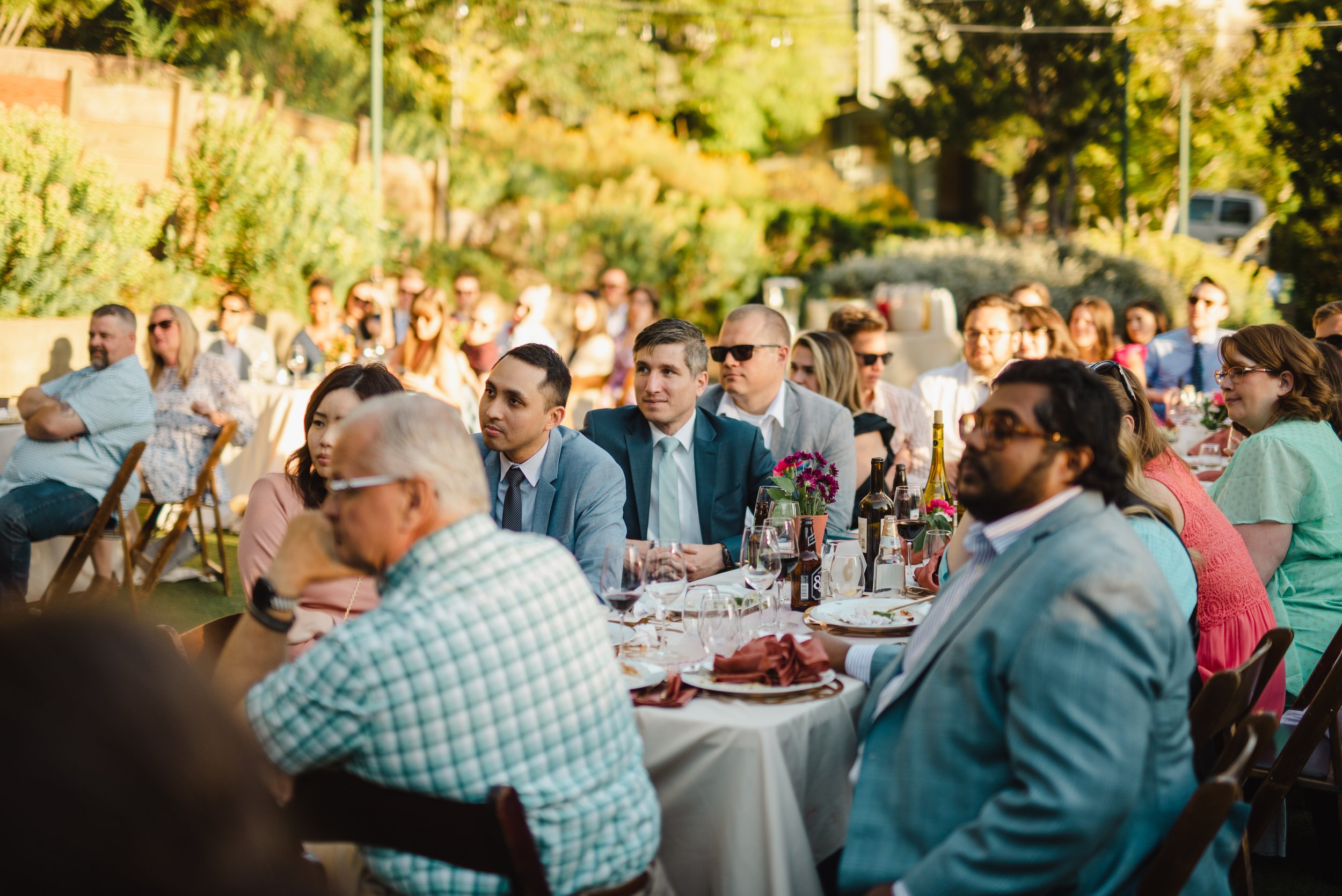
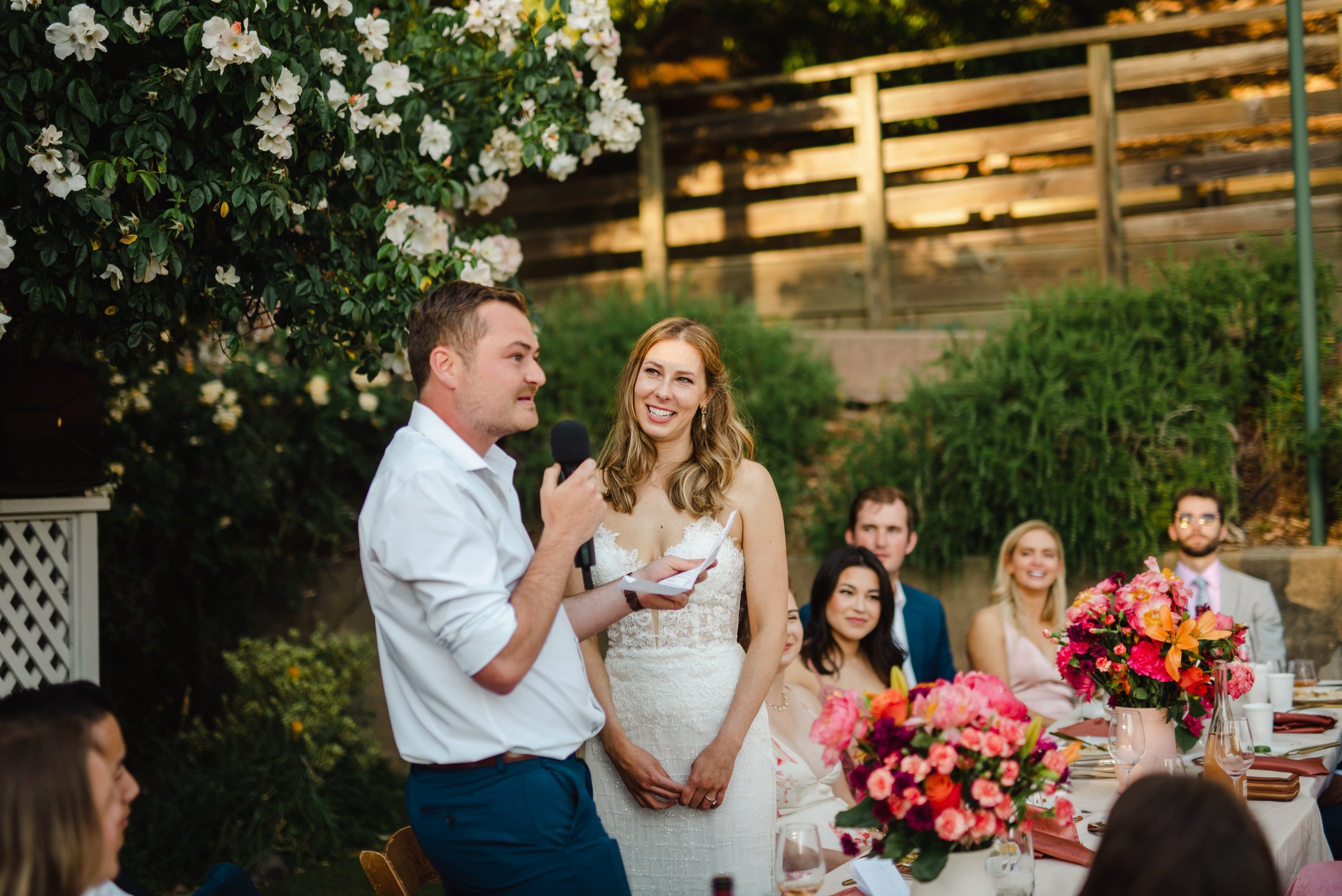
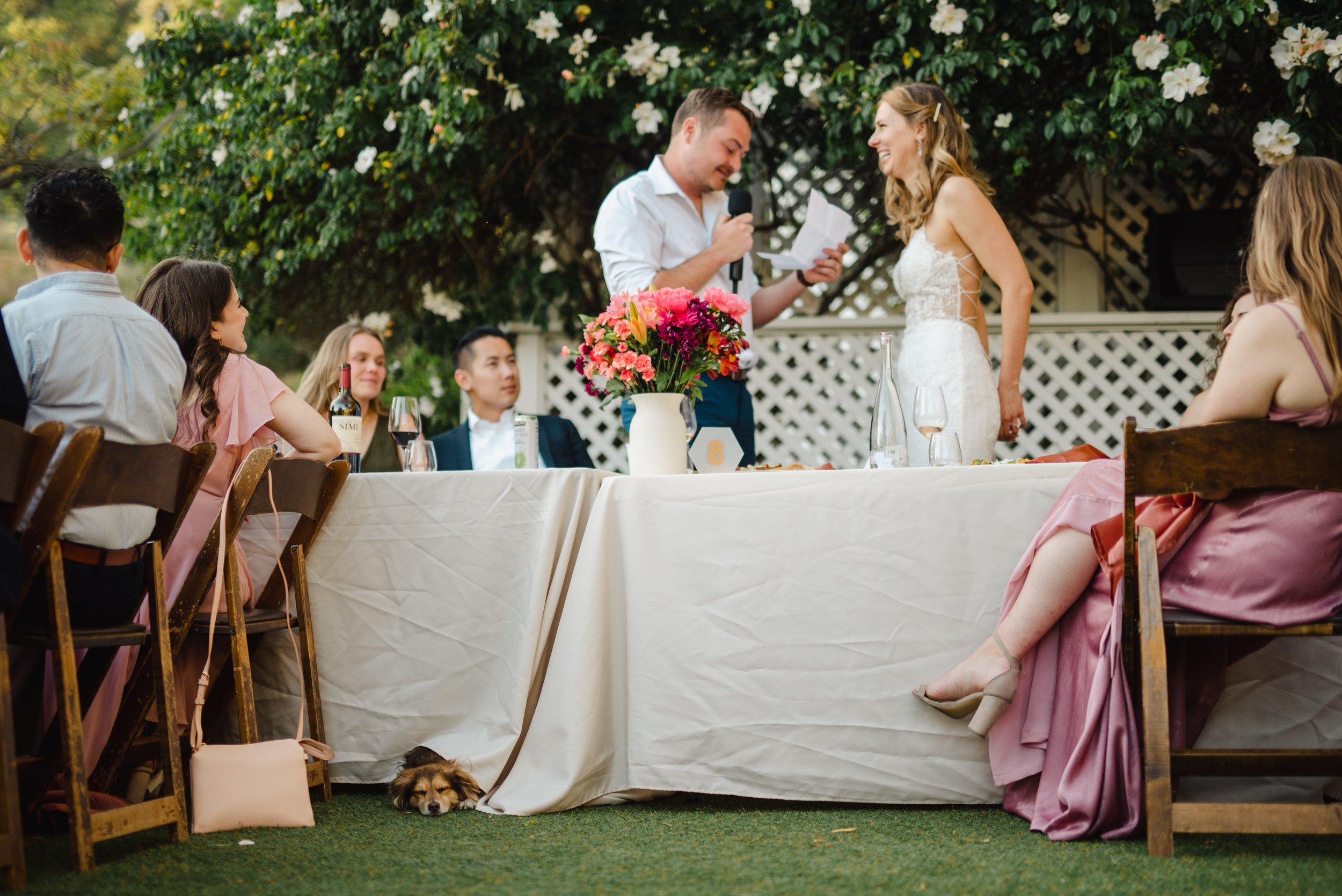
Kim and Cody smiled as they read, relieved and heartened that their words held true, one year into their marriage; into their lives together.


